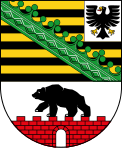List of stumbling blocks in Halle (Saale)
The list of stumbling blocks in Halle (Saale) contains all stumbling blocks that were laid by Gunter Demnig in Halle (Saale) as part of the art project of the same name . They are intended to commemorate the victims of National Socialism who lived and worked in Halle. By November 2019, a total of 247 stones had been laid at 114 addresses; more stones are being planned.
background
Relocations
The city of Halle has been involved in the Stolperstein project by the artist Gunter Demnig since 2003. The overall management lies with the association “Zeit-Geschichte (n) e. V. “The laying of the stones is financed exclusively through donations. The first laying took place on May 6th and 7th, 2004, since then more stones have followed at least once a year:
- 6./7. May 2004: Twelve stones at six addresses
- 25./26. October 2004: 16 stones at eight addresses as well as relocation of eight stolen stones at three addresses
- June 9, 2005: 33 stones at five addresses
- April 4, 2006: Twelve stones at ten addresses
- December 12, 2006: 15 stones at eight addresses
- May 29, 2007: 13 stones at six addresses
- December 14, 2007: Seven stones at five addresses
- May 17, 2008: Eleven stones, seven addresses
- August 24, 2009: Eleven stones at five addresses
- October 29, 2010: 21 stones at eight addresses
- October 15, 2011: 13 stones at ten addresses
- June 9, 2012: A stone at an address
- November 3, 2012: 18 stones at nine addresses
- September 26, 2013: Nine stones at six addresses
- October 25, 2013: A stone at an address
- October 11, 2014: 19 stones at seven addresses
- November 10, 2015: 13 stones at eight addresses
- November 17, 2016: 15 stones at two addresses
- March 22, 2018: four stones at two addresses
- November 28, 2019: three stones at two addresses
The persons honored with stumbling blocks include Jews or persons of Jewish descent, Sinti , Jehovah's Witnesses , Reform Adventists as well as victims of Actions 14f13 and T4 who lived or worked in Halle. People who were persecuted because of their political convictions or their sexual orientation have so far not been included. Persecuted people who survived the Nazi era were only taken into account in exceptional cases. Most of the stumbling blocks were laid in front of the last home chosen by the people concerned.
Accompanying projects
The first audio stumbling blocks were created between 2012 and 2013 on the initiative of the Salzburg- based radio factory 107.5 . Five other independent radio stations in Erfurt , Hamburg , Nuremberg , Linz and Halle took part in this. Radio Corax produced ten articles on stumbling blocks in Halle and the surrounding area as well as two longer special articles. All programs appeared on the radio and are also available on the Internet.
The project “Stumbling blocks - films against forgetting”, a film series of the master’s course in MultiMedia & Authorship at the Martin Luther University in Halle-Wittenberg, has existed since 2013 . By 2018, 17 contributions of different lengths were made about the Stolpersteine in Halle and the people honored with them. All contributions are available on a YouTube channel.
Every year, vigils and cleaning campaigns take place at selected stumbling blocks to commemorate the November pogroms in 1938 .
List of stumbling blocks
![]() Map with all coordinates: OSM | WikiMap
Map with all coordinates: OSM | WikiMap
Laying stumbling blocks
| address | Laying date |
person | inscription | image | Picture of the house |
|---|---|---|---|---|---|
|
Adolf-von-Harnack-Strasse 9 (formerly Blumenthalstrasse) |
Aug 24, 2009 |
Elise Salomon (1862-1942) Elise Salomon and her two sisters Franziska and Margarethe came from Halle. Her two brothers Oskar and Paul were the first Jews to attend the Halle city high school. Oskar Salomon later became a specialist and Paul Salomon became director of Dresdner Bank in Hamburg . Elise Salomon remained unmarried and moved into a joint apartment with her sisters at what was then Blumenthalstrasse 9. After the Nuremberg Laws were passed , they were no longer allowed to live under one roof with “Aryans”. They then forcibly moved into a "Judenhaus" at Hindenburgstrasse 13 (today Magdeburger Strasse). On December 1, 1941, they had to move to a supposed old people's home at Boelckestrasse 24 (today Dessauer Strasse). On September 19, 1942, they were to be deported to the Theresienstadt concentration camp . They tried to forestall this by suicide together . Elise Salomon died on September 17th. |
ELISE SALOMON, born in 1862 , lived here before deportation, escaping to death on September 16, 1942 |
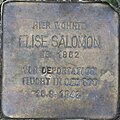
|
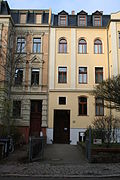
|
|
Franziska Salomon (1861–1944) Franziska Salomon was unmarried and initially lived with her sisters in the shared apartment at Blumenthalstrasse 9, later forcibly in the “Judenhaus” at Hindenburgstrasse 13 (today Magdeburger Strasse). The sisters tried to forestall the ordered deportation to the Theresienstadt ghetto on September 19, 1942 by suicide together. Franziska Salomon survived her suicide attempt and died on March 31, 1944 in Theresienstadt. |
FRANZISKA SALOMON, born in 1861 , lived here, deported February 27, 1937 Theresienstadt, dead March 31, 1944 |

|
|||
|
Margarethe Salomon (1870–1942) Margarethe Salomon, the youngest of the three sisters, also remained unmarried. She lived with her sisters first in the common apartment and later forcibly in the "Judenhaus" at Hindenburgstrasse 13 (today Magdeburger Strasse). She escaped deportation to the Theresienstadt ghetto on September 16, 1942 by suicide. |
MARGARETHE SALOMON, born in 1870 , lived here before deportation, fleeing to death on September 17, 1942 |

|
|||
| Adolf-von-Harnack-Straße 13 (formerly Blumenthalstraße) |
Nov 10, 2015 |
Martin Sachs (1883–1942) Martin Sachs was born in Halle and worked in his hometown as a sole trader in a shirt factory. In the First World War he served as a soldier. He was married to Paula Sachs geb. Martin. Their son Rudolf was born in 1922. In November 1938, Martin and Rudolf Sachs were interned in Buchenwald concentration camp, but later released. Rudolf Sachs was able to emigrate to England on a Kindertransport and later moved to the United States. However, his parents did not manage to escape from Germany. Martin Sachs was deported on June 1, 1942 and murdered two days later in the Sobibor extermination camp. |
This is where MARTIN SACHS, born in 1883, lived, deported on June 1, 1942, Sobibor murdered on June 3, 1942 |
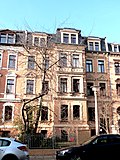
|
|
|
Paula Sachs born Marcus (1894-1942) Paula Sachs came from Allenstein . She and her husband Martin were deported on June 1, 1942 and murdered two days later in the Sobibor extermination camp. |
PAULA SACHS nee lived here . Marcus born 1894 deported June 1st, 1942 Sobibor murdered June 3rd, 1942 |
||||
| Adolf-von-Harnack-Straße 18 (formerly Blumenthalstraße) |
25./26. Oct. 2004 |
Paul Bauchwitz (1876–1942) Paul Bauchwitz came from Sangerhausen and ran a textile wholesaler in Halle on Hansering 9/10. After the National Socialists came to power, he was expropriated and committed to forced labor. He and his wife were deported on June 1, 1942 and murdered on June 3 in the Sobibor extermination camp . Their two children, Peter and Rita, emigrated to the United States . Paul's brother Kurt (see Große Ulrichstraße 2) was also murdered, his wife committed suicide. |
PAUL BAUCHWITZ, born in 1876 , lived here, deported in 1942, Sobibor murdered on June 3 , 1942 |

|

|
|
Regina Bauchwitz born Meyer (1888-1942) Regina Bauchwitz born Meyer was from Labes and worked in her husband's shop. She was deported with him on June 1, 1942 and murdered on June 3 in the Sobibor extermination camp . |
REGINA BAUCHWITZ nee lived here . Meyer born 1888 deported 1942 Sobibor murdered June 3 , 1942 |

|
|||
|
Willy Katz (1891-1938) Willy Katz was a merchant from Halle. After the Reichspogromnacht he was arrested on November 10, 1938 and taken to Sachsenhausen concentration camp . He was able to return to Halle after four weeks, but succumbed to abuse on December 25th. His children Ruth and Manfred survived their imprisonment in the Theresienstadt ghetto and later emigrated to Israel . |
WILLI KATZ, born in 1891 , lived here, arrested in 1938 Sachsenhausen, dead after imprisonment on December 25, 1938 |
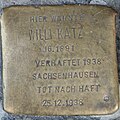
|
|||
| Albert-Schweitzer-Strasse 54 (formerly Zeppelinstrasse) |
Nov 3, 2012 |
Albert Müller (1878-1942) Albert Müller came from Halle and worked here as a lawyer and notary. He lost a leg in the First World War . In November 1911 he married Else geb. Bear. The marriage produced a son and a daughter. The couple owned an apartment at Zeppelinstrasse 54 (today Albert-Schweitzer-Strasse). Albert Müller was committed to forced labor in 1939. He and his wife were deported on June 1, 1942 and murdered two days later in the Sobibor extermination camp. Her son Hans-Joachim Müller emigrated to Panama in 1934 . Her daughter Irmgard Müller survived imprisonment in Auschwitz, Ravensbrück and Malchow. In 1947 she emigrated to the United States. |
ALBERT MÜLLER, born in 1878 , lived here, deported on June 1, 1942, Sobibor murdered on June 3, 1942 |
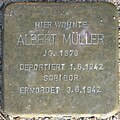
|

|
|
Emil Müller (1880–1938) The unmarried Emil Müller was taken in by his brother Albert and his wife after the death of his parents. Emil Müller owned a leather goods factory at Hindenburgstrasse 34. He was arrested after the Reichspogromnacht in 1938 and taken to Sachsenhausen concentration camp. He died there on December 20, 1938. Stroke was given as the official cause of death . |
Here lived EMIL MÜLLER Jg. 1880 'protective custody' in 1938 Sachsenhausen dead 12.20.1938 |

|
|||
|
Else Müller born Baer (1887-1942) Albert Müller's wife Else b. Baer came from Hamm (Sieg) . On June 1, 1942, she and her husband were deported and murdered two days later in the Sobibor extermination camp. |
ELSA MÜLLER nee lived here . Baer born in 1887 deported June 1st, 1942 Sobibor murdered June 3rd, 1942 |

|
|||
|
Lucie Helft b. Heinemann sch. Stern (1897–1942) Lucie Helft came from Hanover and was married to Cuno Helft (see Universitätsring 19-20) for the second time. The marriage was concluded shortly before the deportation. On June 1, 1942, Lucie Helft was deported with her neighbors and murdered two days later in the Sobibor extermination camp. |
LUCIE HELFT nee lived here . Heinemann born in 1897 deported June 1st, 1942 Sobibor murdered June 3rd, 1942 |

|
|||
|
Old Market 12 |
Dec 14, 2007 |
Wolfgang Brühl (1927–1941) Wolfgang Brühl suffered from seizure-like conditions and had severe learning difficulties. Against his mother's wishes, he was first taken to a reformatory in Nordhausen and later to the Neinstedter institutes . On April 24, 1941, he was transferred to the Altscherbitz state hospital and on June 16 to the Bernburg killing center, where he was murdered on the same day as part of Operation T4 . Diphtheria was given as the official cause of death . |
WOLFGANG BRÜHL, born in 1927 from the Altscherbitz State Sanatorium, lived here on June 16, 1941 after 'Heilanstalt' Bernburg, murdered on June 16 , 1941 |

|

|
| At freight yard 1 |
Nov 28, 2019 |
Berta (Balbina) Arnholz geb. Lewin (1883-1942) Berta Arnholz b. Lewin came from Labishin . She and her husband Hugo had to give up their shared apartment at Am Güterbahnhof. Berta Arnholz last lived in the "Judenhaus" at Hindenburgstrasse 34 (today Magdeburger Strasse 7). She was deported on June 1, 1942 and murdered two days later in the Sobibor extermination camp. |
BERTHA ARNHOLZ nee lived here . Lewin born in 1883 deported June 1st, 1942 Sobibor murdered June 3rd, 1942 |

|

|
|
Hugo Arnholz (1881-1942) Hugo Arnholz was born in Arnswalde and worked as a master tailor in the clothing store of the Jewish community in Halle. He and his wife Berta had to give up their shared apartment at Am Güterbahnhof. Hugo Arnholz last lived in the “Judenhaus” at Am Steintor 18. On February 5, 1942, he was sent to the Buchenwald concentration camp. As part of Aktion 14f13, he was transferred to the Bernburg killing center on March 12, 1942 and murdered on the same day. In the official documents, his death was dated March 21 in Buchenwald. |
HUGO ARNHOLZ, born in 1881 , lived here, arrested January 15, 1942 Buchenwald relocated March 12, 1942 Bernburg murdered March 12, 1942 |

|
|||
| At the stone gate 18 |
Nov 3, 2012 |
Ida Elkan b. Wittenberg (1868-1943) Ida Elkan came from Magdeburg and was the owner of the house at Am Steintor 18. After it had been declared a " Jewish house " and served as a means of forcing expelled Jews, Ida Elkan moved in with her son Werner Elkan. On February 26, 1942, she had to move into the Jewish “old people's home” at Boelckestrasse 24 (today Dessauer Strasse). On February 27, 1943 she was deported to Theresienstadt, where she died on April 25, 1943. Her son survived imprisonment in Theresienstadt. |
IDA ELKAN nee lived here . Wittenberg, born 1868, deported to Theresienstadt in 1943, dead April 25 , 1943 |
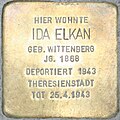
|

|
| August-Bebel-Strasse 34 (formerly Friedrichstrasse) |
25./26. Oct. 2004 |
Curt Lewin (1881-1942) Curt Lewin from Zeitz was co-owner of the “Julius Lewin” department store on Marktplatz 3–7. In 1935 he had to give up the business. He and his wife were deported on June 1, 1942 and murdered two days later in the Sobibor extermination camp. Her daughter Ilse managed to escape to England . |
CURT LEWIN, born in 1881 , lived here, deported in 1942, Sobibor murdered on June 3 , 1942 |

|

|
|
Johanna Lewin b. Stargard (1888-1942) Curt Lewin's wife Johanna geb. Stargard came from Schwerin an der Warthe . She and her husband were deported on June 1, 1942 and murdered two days later in the Sobibor extermination camp. |
JOHANNA LEWIN nee lived here . Stargard born in 1888 deported 1942 Sobibor murdered June 3 , 1942 |
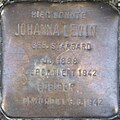
|
|||
| August-Bebel-Strasse 48a (formerly Friedrichstrasse) |
25./26. Oct. 2004 |
Siegmund Lewin (1862–1940) Siegmund Lewin was co-owner of the “Julius Lewin” department store on Marktplatz 3–7. In 1935 he had to give up both the business and his villa on Friedrichstrasse (today August-Bebel-Strasse). In 1940 he escaped deportation by fleeing to Leipzig, where he finally committed suicide. His son and his family managed to escape to the United States. |
WILHELM SIEGMUND LEWIN, born in 1862, lived here, suicide in 1940 before deportation |

|

|
| August-Bebel-Strasse 59 (formerly Friedrichstrasse) |
Aug 24, 2009 |
Leonie Levi (1889-1942) The unmarried Leonie Levi shared several apartments in Halle with her mother Rosalie, most recently at Friedrichstrasse 59 (today August-Bebel-Strasse). After the Nuremberg Laws were passed, they had to leave the apartment. Leonie Levi moved into the "Judenhaus" at Hindenburgstrasse 34 (today Magdeburger Strasse 7). On June 1, 1942, she and her mother were deported and murdered two days later in the Sobibor extermination camp. |
LEONIE LEVI, born in 1889 , lived here, deported June 1st, 1942 Sobibor murdered June 3rd, 1942 |

|

|
|
Rosalie Levi b. Lesser (1866-1942) Rosalie born Lesser came from Ziebingen and was married to the wine merchant Emil Levi (1854–1910). She gave birth to four children in Königs Wusterhausen . When the family moved to Halle, Rosalie Levi and her daughter Leonie shared several apartments, most recently at Friedrichstrasse 59 (today August-Bebel-Strasse). Rosalie Levi later forcibly moved to the "Judenhaus" at Am Steintor 18 and on May 23, 1941 to the Jewish "old people's home" at Boelckestrasse 24 (today Dessauer Strasse). She and her daughter were deported on June 1, 1942 and murdered two days later in the Sobibor extermination camp. Rosalie Levi's son Hermann Levi fled to Estonia in 1936 . Her second son, Hans Levi, fled to Australia in 1938 . Her second daughter Elisabeth Zipser geb. Levi survived captivity in Theresienstadt. |
ROSALIE LEVI nee lived here . Lesser born 1866 deported June 1st, 1942 Sobibor murdered June 3rd, 1942 |

|
|||
| Beesener Strasse 241 |
26 Sep 2013 |
Paula Wolff born Lewin (1873-1943) Paula Wolff born Lewin came from Könnern and worked as a tailor. She and her husband Sally had an apartment on Beesener Strasse, which the couple had to give up in order to move first to a "Jewish house" at Steintor 18 and later to a supposed "old people's home" on Boelckestrasse 24 (today Dessauer Strasse). On September 20, 1942, both were deported to the Theresienstadt ghetto. Paula Wolff died there on March 28, 1943. |
PAULA WOLFF nee lived here . Lewin born in 1873 deported to Theresienstadt in 1942, dead on March 28, 1943 |
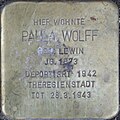
|

|
|
Sally Wolff (1872-1942) Sally Wolff came from Mlewo near Danzig and worked in Halle as a textile goods dealer. On September 20, 1942, he and his wife were deported to the Theresienstadt ghetto. Sally Wolff died there just under a month later on October 19th. |
SALLY WOLFF, born in 1872 , lived here, deported to Theresienstadt in 1942, dead 19.19.1942 |
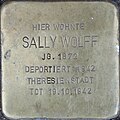
|
|||
| Benkendorfer Strasse 78 |
Apr 4, 2006 |
Henriette Sauer b. Flatow (1885-1943) Henriette, a Jew born. Flatow came from Könnern and was married to the non-Jew Otto Sauer. The fact that they allowed one of their sons to meet his girlfriend and future wife in their parents' apartment was used, presumably after a denunciation, as an opportunity to convict the couple of "giving the opportunity to fornication". Otto Sauer had to serve a prison sentence. Henriette Sauer, on the other hand, was deported to the Auschwitz-Birkenau concentration camp, where she was murdered on March 27, 1943. Oral anemia was given as the official cause of death, but pneumonia was noted on the death certificate . |
HENRIETTE SAUER nee lived here . Flatow born in 1885 arrested 1942 deported murdered March 27, 1943 Auschwitz |

|

|
|
Bernhardystraße 6 |
May 17, 2008 |
Stanislawa Steinhauf b. Ruff (1895-1940) Stanislawa Steinhauf, from Krotoschin near Posen , was married and had two children. In 1926 she fell ill with schizophrenia . From 1930 she was permanently housed in the Nietleben state hospital . Later it was transferred to the Altscherbitz State Hospital. On October 21, 1940, she was taken to the Brandenburg killing center as part of Operation T4 and murdered on the same day. |
STANISLAWA STEINHAUF, born in 1895, lived here from 'Landesheilanstalt' Altscherbitz on October 21, 1940 after ' Nursing Home ' Brandenburg murdered October 21, 1940 |

|

|
| Bernhardystrasse 56 |
Aug 24, 2009 |
Ilselotte Nussbaum (1927 – approx. 1943) Ilselotte Nussbaum was born in Halle in 1927 as the daughter of Leopold and Olga Nussbaum. After her father was murdered, she moved with her mother to live with their parents in Munich. Ilselotte Nussbaum was committed to forced labor in a flax roaster in 1942 . On March 13, 1943, she and her mother were deported to Auschwitz and probably murdered a little later. |
ILSELOTTE NUSSBAUM born in 1927 lived here, deported and murdered in 1943 in Auschwitz |

|

|
|
Leopold Nussbaum (1897–1938) Leopold Nussbaum came from Jeßnitz (Anhalt) . In Halle he and his wife ran a wholesaler for hairdressing articles. Leopold Nussbaum was arrested on April 25, 1938 and deported to Buchenwald concentration camp , where he was murdered on May 13, 1938. |
LEOPOLD NUSSBAUM, born in 1897 , lived here, arrested April 25, 1938 Buchenwald murdered May 13, 1938 |

|
|||
|
Olga Nussbaum born Gundersheimer (1899 – approx. 1943) Olga Nussbaum born Gundersheimer came from Munich . After her husband was murdered, she and her daughter moved back to their parents' hometown. On March 13, 1943, she and her daughter were deported to Auschwitz and probably murdered a little later. Three of Olga Nussbaum's siblings managed to escape to the United States and the Philippines . |
OLGA NUSSBAUM nee lived here . Gundersheimer born in 1899, deported and murdered in Auschwitz in 1943 |
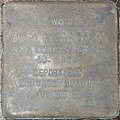
|
|||
| Blumenstrasse 6 |
Nov 10, 2015 |
Edith Therese Sommerich b. Frenkel (1893–1942) Edith Frenkel was born in Halle. She had to give up her apartment on Blumenstrasse and move to a “Judenhaus” at Hindenburgstrasse 34 (today Magdeburger Strasse 7). There she married the widowed Julius Sommerich shortly before the deportation (see Magdeburger Strasse 35). Edith Sommerich was deported with him on June 1, 1942 and murdered two days later in the Sobibor extermination camp. |
EDITH SOMMERICH nee lived here . Frenkel born in 1893 deported June 1st, 1942 Sobibor murdered June 3rd, 1942 |

|
|
| Breite Strasse 19 |
Dec 14, 2007 |
Hugo Adler (1886–1942) Hugo Adler came from Bremke in the district of Göttingen and worked as an insurance agent. In 1938 he was sent to Sachsenhausen concentration camp, and in 1939 to Buchenwald concentration camp. As part of Operation 14f13 , he was transferred to the Bernburg killing center on March 2, 1942 and murdered on the same day. |
This is where HUGO ADLER, born in 1886, was arrested, Sachsenhausen Buchenwald, murdered in 1938 , March 2nd, 1942 in 'Heilanstalt' Bernburg |
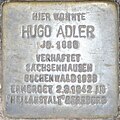
|
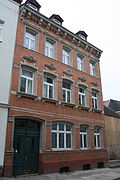
|
| Wide Street 33 |
Oct 15, 2011 |
Alfred Silberberg (1875–1943) Alfred Silberberg, who came from Halle, owned a men's clothing store at Grosse Ulrichstrasse 29. He was married twice and after the divorce moved from his second wife Selma Silberberg. born Breuer to his daughter from his first marriage, Erna Kunert geb. Silberberg. Since her mother was not Jewish and she was also married to a non-Jew, she was largely spared from persecution by the National Socialists. However, she could not prevent her father from forcibly relocating to the "Judenhaus" in Hindenburgstrasse 63 (today open space). On September 20, 1942, he was deported to the Theresienstadt ghetto, where he died on December 20, 1943. His second wife was also deported. |
ALFRED SILBERBERG, born in 1875 , lived here, deported to Theresienstadt in 1942, dead December 20th, 1943 |

|
overbuilt |
|
Brüderstrasse 10 |
May 29, 2007 |
Bertha Meyerstein born Gutmann (1867–1942) Bertha Meyerstein born Gutmann came from Gleicherwiesen . The marriage to Israel Meyerstein had seven children. The couple first had to move to the “Judenhaus” at Hindenburgstraße 34 (today Magdeburger Straße 7) and later to the “old people's home” at Boelckestraße 24 (today Dessauer Straße). On September 19, 1942, both were deported to the Theresienstadt ghetto. Bertha Meyerstein died on October 30, 1942. Her children managed to escape to Palestine , London , Stockholm and the United States. |
BERTHA MEYERSTEIN nee lived here . Gutmann born in 1867 deported to Theresienstadt in 1942, dead October 30 , 1942 |

|

|
|
Israel (Julius) Meyerstein (1869–1944) Israel Meyerstein came from Groebzig . In Halle he opened a kosher butcher's shop at Brüderstraße 10 and later a restaurant at Sternstraße 14. The 1933 ban on slaughter drove him to ruin. He and his wife first had to move to the “Judenhaus” at Hindenburgstraße 34 (today Magdeburger Straße 7) and later to the “old people's home” at Boelckestraße 24 (today Dessauer Straße). On September 19, 1942, both were deported to the Theresienstadt ghetto. Israel Meyerstein died there on January 8, 1944. His sister Rosalie (see Großer Berlin 8) also died in Theresienstadt. |
ISRAEL MEYERSTEIN, born in 1869 , lived here, deported to Theresienstadt in 1942, dead 8th January 1944 |

|
|||
|
Brüderstrasse 17 |
Nov 3, 2012 |
Elvira Holländer b. Troplowitz (1893-1942) Elvira Holländer b. Troplowitz was born in Riesa . She was a distant relative of the entrepreneur Oskar Troplowitz . She and her husband Max owned an apartment at Brüderstrasse 17, later at Leipziger Strasse 54. She did not follow her husband into emigration, but stayed in Halle because of her mother. She moved to the "Judenhaus" Harz 48. She was deported on June 1, 1942 and murdered two days later in the Sobibor extermination camp. |
ELVIRA HOLLÄNDER nee lived here . Troplowitz born in 1893 deported June 1st, 1942 Sobibor June 3rd, 1942 |

|

|
|
Max Holländer (1880–1943) Max Holländer came from Meiningen and ran a drugstore in Halle. The global economic crisis forced Max Holländer to close his shop. He was dependent on financial support from his sister and had to move to Leipziger Strasse 54 with his wife. On June 14, 1938 he was arrested and taken to Buchenwald concentration camp as part of the “Arbeitsscheu Reich” campaign . After his release he was forced to leave Germany. He emigrated to Shanghai , where he died on February 1, 1943. |
MAX HOLLÄNDER, born in 1880, lived here, escaped from Shanghai in 1939, dead February 1, 1943 |

|
|||
| Carl-von-Ossietzky-Strasse 16 (formerly Bismarckstrasse) |
Aug 24, 2009 |
Wera Tubandt b. Krilitschewsky (1881–1944) Wera born Krilitschewsky came from a wealthy merchant family from Odessa . In 1899 she began studying chemistry at the University of Halle-Wittenberg , where she also met her future husband Carl Tubandt (1878–1942). In 1902 she moved to Giessen to do her doctorate . In 1904 she was the first woman to receive a doctorate from a Hessian university. In the same year she converted to Christianity and married Carl Tubandt. The two daughters Wera and Katharina emerged from the marriage. Carl Tubandt was later appointed professor. After the National Socialists came to power, however, he was dismissed in 1937 because of his marriage to a Jew. The couple then moved to their daughters in Berlin , where Carl Tubandt fell ill and died on January 17, 1942. After the death of her husband, Wera Tubandt and her daughters were to be deported to a concentration camp. However, with the help of relatives and friends, they were able to hide. Due to the ongoing persecution, Wera Tubandt committed suicide on February 9, 1944. Her two daughters survived the war. |
DR. WERA TUBANDT nee lived here . Krilitschewsky born in 1881 before deportation escaped to death on 9 February 1944 |
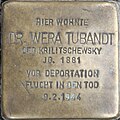
|
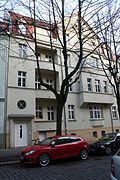
|
| Emil-Abderhalden-Strasse 6 (formerly Wilhelmstrasse) |
May 29, 2007 |
Johanna Baumann b. Hirsch (1880–1943) Johanna Baumann b. Hirsch came from Nörten-Hardenberg and was married to Julius Baumann (1864–1939), director of the Halle sugar refinery. The marriage resulted in two sons. The couple had an apartment at Wilhelmstrasse 6 (today Emil-Abderhalden-Strasse). After the death of her husband, Johanna Baumann took her unmarried sister Frieda Hirsch in with her. In 1940 Elise Weinzweig, the widow of one of Julius Baumann's colleagues, also moved into the apartment. In January 1941 Johanna Baumann and Frieda Hirsch had to move to the “old people's home” at Boelckestrasse 24 (today Dessauer Strasse). Elise Weinzweig also had to leave the apartment in November 1941. She first moved to the "Judenhaus" Harz 48 and in May 1942 also to Boelckestrasse. On September 19, 1942, the three women were deported to the Theresienstadt ghetto. Johanna Baumann died there on January 13, 1943. Elise Weinzweig survived her imprisonment and moved to live with her daughter in London. The fate of Johanna Baumann's two sons is unknown. |
JOHANNA BAUMANN nee lived here . Hirsch born in 1880 deported to Theresienstadt in 1942, dead 13.1.1943 |

|

|
|
Frieda Hirsch (1868–1943) Frieda Hirsch was also born in Nörten-Hardenberg. After her brother-in-law died, she moved in with her sister Johanna Baumann. In 1941 both had to move to the “old people's home” at Boelckestrasse 24 (today Dessauer Strasse). On September 19, 1942, they were deported to the Theresienstadt ghetto. Frieda Hirsch died there on February 21, 1943. |
FRIEDA HIRSCH, born in 1868 , lived here, deported to Theresienstadt in 1942, dead on February 21, 1943 |

|
|||
| Falkenweg 7 |
25./26. Oct. 2004 |
Martha Dittmar b. Jovishoff (1909-1945) Martha Jovishoff came as the daughter of the paper manufacturer Max Jovishoff (see Willy-Brandt-Straße 70) and his wife Mathilde nee. Grünsperz (or Gumberz) to the world. Her father died in prison in October 1938; the official cause of death was "suicide". Her mother and brother then emigrated to the United States. Martha Jovishoff worked as an inspector at the Reichsbahn . She was active in the communist youth movement. Her two sons Klaus (* 1934) and Peter (* 1935) emerged from her marriage to Max Dittmar. After being denounced by neighbors, the couple were arrested on November 17, 1942 and charged with preparing for high treason. Max Dittmar, who was not a Jew, was released a few days later. Martha Dittmar, on the other hand, was deported to Auschwitz in April 1943, where she was probably killed on a death march in 1945 . Her husband and sons survived the war. |
MARTHA DITTMAR nee lived here . Jovishoff born in 1909 deported 1942 Auschwitz dead 1945 'death march' |

|

|
| Feuerbachstrasse 74 (formerly Kurfürstenstrasse) |
Oct 29, 2010 |
Herta Frankenberg b. Meyer (1909-1944) Herta Frankenberg b. Meyer came from Berlin-Charlottenburg and lived in Halle with her husband Siegfried and his parents. Siegfried and Herta Frankenberg emigrated to Czechoslovakia in 1936 . On June 10, 1938, both lost their German citizenship. After the occupation of Czechoslovakia, Herta Frankenberg was deported to Theresienstadt on December 22, 1942. On October 19, 1944, her husband was transferred to Auschwitz-Birkenau concentration camp, where she was killed. |
HERTA FRANKENBERG born Meyer Born 1909 Escape 1936 CSR deported 1942 Theresienstadt 1944 Auschwitz murdered |
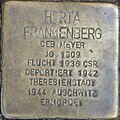
|

|
|
Nathan Frankenberg (1863-1942) Nathan Frankenberg was an agricultural machinery dealer from Marisfeld . With his wife Minna geb. Ney, he first lived in Coburg, where their son Siegfried was born in 1985. Together with Siegfried and his wife, the family later lived in an apartment in Halle at Prinzenstrasse 12 (today overbuilt). After their son and his wife had moved, Nathan and Minna Frankenberg moved into an apartment at Kurfürstenstrasse 74 (today Feuerbachstrasse). On June 30, 1942, they had to move to the “old people's home” on Boelckestrasse 24 (today Dessauer Strasse). On September 19, they were deported to Theresienstadt, where Nathan Frankenberg died on December 6, 1942. His wife survived captivity. |
NATHAN FRANKENBERG, born in 1863 , lived here, deported to Theresienstadt in 1942, dead December 6 , 1942 |

|
|||
|
Siegfried Frankenberg (1895–1944) Siegfried Frankenberg was born in Coburg in 1895. He and his wife Herta initially lived in Halle with their parents; in 1936 the couple emigrated to Czechoslovakia . On June 10, 1938, they lost their German citizenship. Siegfried Frankenberg was deported to Theresienstadt on June 9, 1942, and on to Auschwitz-Birkenau on September 28, 1944, where he was murdered. |
SIEGFRIED FRANKENBERG Born 1895 Escape 1936 CSR deported 1942 Theresienstadt 1944 Auschwitz murdered |
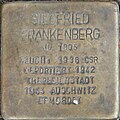
|
|||
| Feuerbachstrasse 75 (formerly Kurfürstenstrasse) |
25./26. Oct. 2004 |
Hannacha Peril Cohn (1938–1942) Hannacha Peril Cohn was born on November 12, 1938 in Halle as the daughter of Recha and Richard Cohn. On June 1, 1942, she was deported with her mother and grandmother and murdered two days later in the Sobibor extermination camp. |
HANNACHA PERIL COHN, born in 1938 , lived here, deported in 1942, Sobibor murdered on June 3 , 1942 |

|
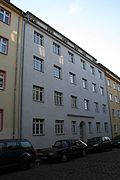
|
|
Recha Cohn born Grünspa (h) n (1914–1942) Recha Grünspa (h) n was born in Sonneberg and married the lawyer and businessman Richard Cohn from Halle on January 25, 1938. He managed to escape to England in 1939. Recha Cohn later moved in with her daughter to live with her mother-in-law. On June 1, 1942, all three were deported and murdered two days later in the Sobibor extermination camp. |
RECHA COHN nee lived here . Grünspahn born in 1914 deported 1942 Sobibor murdered June 3 , 1942 |
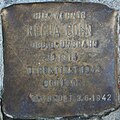
|
|||
| Oct 29, 2010 |
Thekla Cohn b. Businessman (1879–1942) Thekla Cohn came from Coburg. In Halle she owned an apartment at Hindenburgstrasse 63 (today overbuilt). Here she took in her daughter-in-law and granddaughter after her son had fled. On June 1, 1942, all three were deported and murdered two days later in the Sobibor extermination camp. Her stumbling block was laid in front of the former apartment of her son and daughter-in-law. |
THEKLA COHN b. Kaufmann born in 1879 deported 1942 Sobibor murdered June 3 , 1942 |

|
||
| Forsterstrasse 13 |
Oct 11, 2014 |
Clara Loewendahl (1865–1942) Clara Loewendahl came from a merchant family and inherited the house in Forsterstrasse after the death of her brother Hermann in 1939. In 1941 it was declared a "Jewish House" and Clara Loewendahl had to take in a large number of Jews who had been expelled from their homes, including her sisters Paula and Selma. On April 13, 1942, Clara Loewendahl committed suicide. |
CLARA LOEWENDAHL, born in 1865 , lived here before deportation, fleeing to death on April 13, 1942 |

|
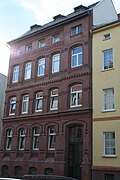
|
|
Paula Loewendahl (1869–1942) The single Paula Loewendahl lived with her sister Selma in an apartment on Seydlitzstrasse, which she had to leave in 1941 and move in with her sister Clara. Both were to be deported on September 19, 1942. They evaded this on September 15 by joint suicide. |
PAULA LOEWENDAHL, born in 1869 , lived here before deportation, fleeing to death on April 15, 1942 |

|
|||
|
Selma Loewendahl (1872–1942) Selma Loewendahl, who was single, lived with her sister Paula in an apartment on Seydlitzstrasse, which she had to leave in 1941 and move in with her sister Clara. Both were to be deported on September 19, 1942. They evaded this on September 15 by joint suicide, Selma Loewendahl, however, only died the following day. |
SELMA LOEWENDAHL, born in 1872 , lived here before deportation, fleeing to death on April 16, 1942 |
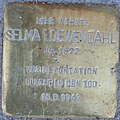
|
|||
|
Günther Baer (1918–1942) Günther Baer came from Worms and worked as a businessman. Immediately after the outbreak of war he was evacuated and had to move to Halle. There he met his future wife Paula, with whom he had a daughter. The family was deported on June 1, 1942 and murdered two days later in the Sobibor extermination camp. |
GÜNTHER BAER, born in 1918 , lived here, deported on June 1, 1942, Sobibor murdered on June 3, 1942 |
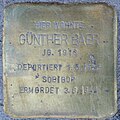
|
|||
|
Chana Baer (1941-1942) Chana Baer was born in 1941 in the Israelite hospital in Hanover as the daughter of Günther and Paula Baer. The family was deported on June 1, 1942 and murdered two days later in the Sobibor extermination camp. Chana Baer was only 16 months old. |
CHANA BAER, born in 1941 , lived here, deported on June 1, 1942, Sobibor murdered on June 3, 1942 |

|
|||
|
Paula Baer b. Bermann (1921–1942) Paula Bermann came from Schwetzingen and, like her future husband, had been evacuated from her home country to Halle immediately after the start of the war. She and her family were deported on June 1, 1942 and murdered two days later in the Sobibor extermination camp. |
PAULA BAER nee lived here . Bermann born in 1921 deported June 1st, 1942 Sobibor murdered June 3rd, 1942 |

|
|||
| Frankestrasse 12 (formerly 17) |
26 Sep 2013 |
Josef Pfifferling, called Julius (1883–1938) Josef Pfifferling, called Julius, came from Wanfried . He had three brothers and three sisters. In the First World War he served as a soldier. Later he ran a cattle and horse business together with his brother Karl on Frankestrasse in Halle. This was initially excluded from the Central German Horse Trade Association in 1933. In 1936 or 1937 the business had to be closed. As part of the “Aktion Arbeitsscheu Reich” campaign, Julius Pfifferling was interned in Buchenwald concentration camp on April 25, 1938, where he had to work in the quarry. He died in Buchenwald on May 16, 1938 and was officially "shot while trying to escape". Julius Pfifferling's wife Dorothea managed to escape from Germany. It probably came first to Shanghai and later to England. Of his siblings, only brother Karl survived the Second World War. In 1939 he managed to escape to the United States. |
JULIUS PFIFFERLING, born in 1883 , lived here, arrested April 25, 1938 Buchenwald murdered on the run May 16, 1938 |

|
overbuilt |
| March 22, 2018 |
Friedrich (Fritz) Chanterelle (1889–1942) Fritz Pfifferling was born in Halle. He was a brother of Julius Pfifferling and, like his brothers, worked as a cattle dealer. Together with his sister-in-law Dorothea, he managed to escape to Shanghai in 1939. Fritz Pfillerling died there on October 1, 1942. |
FRITZ PFIFFERLING, born in 1889, lived here, escaped from Shanghai in 1939, dead October 1, 1942 |

|
||
| Friedenstrasse 12a |
Dec 12, 2006 |
Martin Kochmann (1878–1936) Martin Kochmann was born in Breslau as the son of a businessman . He studied medicine in Berlin and Breslau. In 1901 Kochmann converted to the Protestant faith. In 1902 he received his doctorate in Jena . In 1907 the habilitation followed in Greifswald . In 1908 he married Sophie Gabbe (1882–1951), the daughter of a councilor. In 1911 he was appointed professor of pharmacology at the University of Greifswald . In 1914 he moved to the University of Halle, but was soon called up as a medical officer for military service. In 1920 he was appointed full professor in Halle. In 1921 he became director of the Pharmacological Institute and in 1924 a member of the Leopoldina . After the National Socialists came to power, he was initially able to evade his dismissal due to his service at the front in the First World War in 1933. In 1935, however, he was given early retirement. In 1936 he was arrested on suspicion of “promoting subversive and treasonable endeavors”. On September 11, 1936, he committed suicide in his cell. |
Here lived DR. MARTIN KOCHMANN Jg. 1878 arrested by the Gestapo in 1936 fleeing into death 11/09/1936 |

|

|
|
Geiststrasse 1 |
26 Sep 2013 |
Bella Traubkatz born Feuchtwanger (1891–1943) Bella Feuchtwanger was born in Munich and was married to Rabbi Traubkatz. Her siblings included the lawyer Ludwig Feuchtwanger and the two writers Lion and Martin Feuchtwanger . Bella Feuchtwanger worked for her brother Martin as an editor at the publishing house “Fünf Türme”, first in Halle and from 1935 in Prague . Her brother had left Halle in 1933. In April 1939, Martin Feuchtwanger managed to escape to Palestine. His sister wanted to come after the completion of the liquidation of the publishing house, but this failed. On May 8, 1943, she was deported to the Theresienstadt ghetto, where she later found death. Her exact date of death is unknown. |
BELLA TRAUBKATZ nee lived here . Feuchtwanger born in 1891 Escape 1935 Prague deported 1943 Theresienstadt dead 1943 |

|

|
| Geiststrasse 15 |
25./26. Oct. 2004 |
Senta (Ette) Riesel (1922–1942) Senta Riesel was born as the daughter of Samuel Riesel and his wife Klara. Gänger born in Leipzig . Her father died very early. After her mother died in 1937 or 1938, she and her siblings Heinz (see Große Märkerstraße 13) and Frieda (see Mühlweg 36) had to move to live with relatives in Halle. Senta Riesel stayed with her aunt Rosa Kanner and her husband. As part of the “ Poland Action ”, she and her siblings were driven across the Polish border on October 29, 1938. Her aunt Hanna Lipper, who was also expelled, born. Gänger and her husband Leo Lipper (see Grosse Märkerstrasse 13) took her and her brother Heinz in and settled with them in Kolomea . In 1942 all of them were shot after the Wehrmacht marched in. |
SENTA RIESEL, born in 1922 , lived here. Expelled 1938 Poland ? ? ? |
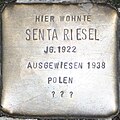
|

|
| Geiststrasse 22 |
Oct 15, 2011 |
Martha Windmüller (1880–1942) Martha Windmüller came from Hanover . She was married twice. Since 1939 at the latest, she has been in treatment at the Altscherbitz State Sanatorium. On July 13, 1942, she was arrested and deported. |
Here lived MARTHA WIND MULLER Jg. 1880 Landesheilanstalt Altscherbitz 07/13/1942 Gestapo picked murdered |

|

|
| Geiststrasse 55 |
Oct 15, 2011 |
Kurt Just (1892-1942) Kurt Just, who came from Halle, was a trained painter. Between 1919 and 1922 he served a prison sentence in the Red Ox for riot and attempted release from prisoners . After the National Socialists came to power, Just was considered a half-Jew and was sent to Buchenwald concentration camp on November 9, 1938 after the Reichspogromnacht. He was later transferred to Sachsenhausen concentration camp, but released on December 19, 1938. His refusal to use the suffix "Israel" and the Jewish star earned him a fine and another prison sentence on September 2, 1942. A little later he was deported to Auschwitz, where he was murdered on December 2, 1942. |
This is where KURT JUST, born in 1892, lived, deported in 1942, murdered in Auschwitz |

|
overbuilt |
| Georg-Cantor-Strasse 33 (formerly Henriettenstrasse) |
Dec 14, 2007 |
Friedjof Wagner (1903-1940) Friedjof Wagner came from Halle and had been a patient at the Altscherbitz state hospital since 1935. On November 28, 1940 he was taken to the Brandenburg killing center as part of Operation T4 and murdered on the same day. In order to cover up the murder, the Grafeneck asylum was given as the official place of death . |
This is where FRIEDJOF WAGNER born in 1903 from the Altscherbitz State Sanatorium lived on 11/28/1940 after 'Heilanstalt' Bernburg, murdered 11/28/1940 |
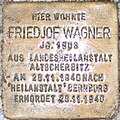
|

|
|
Grosse Märkerstrasse 13 |
Jun 9, 2005 |
Anna Heymann born Lerner (1896–1942) Anna Lerner was a nurse and came from Berlin. On January 27, 1937, she married Ludwig Heymann. In 1942 she took on Brigitte Klawansky as a foster daughter. Anna Heymann and Brigitte Klawansky were deported on June 1, 1942 and murdered two days later in the Sobibor extermination camp. On December 16, 2005, the stumbling blocks were doused with tar by strangers. |
ANNA HEYMANN nee lived here . Lerner born in 1896 deported May 30, 1942 Sobibor murdered June 3, 1942 |

|
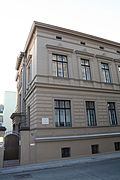
|
|
Ludwig Heymann (1875–1942) Ludwig Heymann was a widowed teacher and cantor. In 1937 he married Anna geb. Learner. He committed suicide on April 30, 1942 after learning of his upcoming deportation. On December 16, 2005, the stumbling blocks in Grosse Märkerstrasse 13 were doused with tar by strangers. |
Here lived LUDWIG Heymann Jg. 1875 suicide 04/30/1942 from deportation |
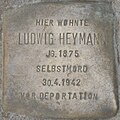
|
|||
|
Brigitte Klawanski (1937-1942) Brigitte Klawanski's birth mother emigrated to Shanghai and did not want to expose her young daughter to the long journey. That is why Anna Heymann took her in as a foster daughter in 1942. Anna Heymann and Brigitte Klawanski were deported on June 1, 1942 and murdered two days later in the Sobibor extermination camp. On December 16, 2005, the stumbling blocks in Grosse Märkerstrasse 13 were doused with tar by strangers. |
BRIGITTE KLAWANSKI, born in 1937 , lived here, deported May 30 , 1942 Sobobor murdered June 3 , 1942 |
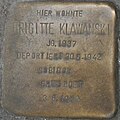
|
|||
|
Awram Librach (1891-1941) Awram Librach came from Lodz . In 1916 he came to Halle with his wife Gutta. He worked as a worker in the salt works until 1919 and then went into business for himself. The couple had two sons and a daughter. The children emigrated to Palestine in the 1930s. Awram and Gutta Librach were driven across the Polish border on October 29, 1938 as part of the “Poland Action”. They then went back to Lodz. Awram Librach died there on May 15, 1942 in the ghetto . On December 16, 2005, the stumbling blocks in Grosse Märkerstrasse 13 were doused with tar by strangers. |
AWRAM LIBRACH, born in 1891 , lived here, expelled October 28, 1938, dead in 1941 in Łodz |

|
|||
|
Gutta Librach b. Epstein (1891-1942) Gutta Librach b. Epstein was from Lodz. In 1916 she came to Halle with her husband Awram. As part of the “Poland Action”, both were driven across the Polish border on October 29, 1938. They then went back to Lodz. Gutta Librach was deported to the Kulmhof extermination camp , where she died on September 21, 1942. On December 16, 2005, the stumbling blocks in Grosse Märkerstrasse 13 were doused with tar by strangers. |
GUTTA LIBRACH nee lived here . Epstein, born in 1891, expelled October 28, 1938 dead in Chelmno in 1942 |
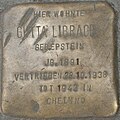
|
|||
|
Hanna Lipper born Gänger (1893–1941) Hanna Lipper born Gänger came from Leipzig. She and her husband Leo ran an underwear business in Halle. In 1920 the daughter Gerda Sophie was born and in 1921 the son Heinrich. After the death of Hanna's sister Klara Riesel geb. Goers came their children to their relatives in Halle. The Lippers took Heinz Riesel into their home. As part of the “Poland Action”, the Lippers were driven across the Polish border on October 29, 1938. Only Gerda Sophie Lipper was excluded from this, as she was not in Halle that day. She later managed to escape to Palestine. The Lipper family settled in Kolomea together with Heinz and Senta Riesel. In 1941 all of them were shot after the Wehrmacht marched in. On December 16, 2005, the stumbling blocks in Grosse Märkerstrasse 13 were doused with tar by strangers. |
HANNA LIPPER nee lived here . Gänger born in 1893 expelled October 28, 1938 shot dead 1941 Kolomea |
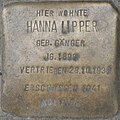
|
|||
|
Heinrich Lipper (1921–1941) Heinrich Lipper was the son of Hanna and Leo Lipper. As part of the “Poland Action”, the Lippers were driven across the Polish border on October 29, 1938. The family settled in Kolomea. In 1941 all of them were shot after the Wehrmacht marched in. On December 16, 2005, the stumbling blocks in Grosse Märkerstrasse 13 were doused with tar by strangers. |
HEINRICH LIPPER, born in 1921 , lived here, expelled October 28, 1938 shot dead 1941 Kolomea |

|
|||
|
Leo Lipper (1891-1941) Leo Lipper came from Bohorodczany . He and his wife ran an underwear shop in Halle. As part of the “Poland Action”, the Lippers were driven across the Polish border on October 29, 1938. The family settled in Kolomea together with Heinz and Senta Riesel. In 1941 all of them were shot after the Wehrmacht marched in. On December 16, 2005, the stumbling blocks in Grosse Märkerstrasse 13 were doused with tar by strangers. |
LEO LIPPER born in 1891 lived here, expelled October 28, 1938, shot dead in 1941 Kolomea |

|
|||
|
Heinz Riesel (1926–1941) After the death of Hanna Lipper's sister Klara Riesel geb. Goers came their children to their relatives in Halle. The Lippers took Heinz Riesel into their home. His sister Frieda (see Mühlweg 36) stayed with the Geminder family, his sister Senta (see Geiststraße 15) with the Kanner family. As part of the “Poland Action”, the Lippers were driven across the Polish border on October 29, 1938, together with Heinz Riesel and his sisters. The family settled in Kolomea together with Heinz and Senta Riesel. In 1941 all of them were shot after the Wehrmacht marched in. On December 16, 2005, the stumbling blocks in Grosse Märkerstrasse 13 were doused with tar by strangers. |
HEINZ RIESEL, born in 1926 , lived here, expelled October 28, 1938, shot dead 1941 Kolomea |

|
|||
|
Grosse Märkerstrasse 27 |
Jun 9, 2005 |
Rosa Kupferberg (1896–1942) Rosa Kupferberg came from Berlin. In Halle she worked as a domestic servant. She was divorced and had a son named Arturo who emigrated to Argentina . His attempts to catch up with his mother were in vain. Her brother David emigrated to Bolivia . She was deported on June 1, 1942 and murdered two days later in the Sobibor extermination camp. |
ROSA KUPFERBERG, born in 1896 , lived here, deported May 30, 1942, Sobibor murdered June 3, 1942 |
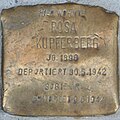
|

|
| Grosse Steinstrasse 30 |
Nov 10, 2015 |
Fanny Koppel born Kanner (1881 – ca. 1941) Fanny Koppel came from Dębica and later moved to Halle with her family. There she married Alfred Koppel. Their daughters Rosalie and Hanni were born in 1907 and 1919. Alfred Koppel died in 1927. At the beginning of 1939 Fanny Koppel moved to live with relatives of her husband in Berlin. On November 14, 1941, she was deported from there to the Minsk ghetto , where she was killed. Her exact date of death is unknown. Her older daughter Rosalie probably also died during the war, but her younger daughter Hanni was able to emigrate to the United States. Four of Fanny Koppel's five siblings were able to emigrate to Palestine and the United States. Her sister Amalie Israel b. Kanner (see Sternstrasse 11) was expelled to Poland, where she presumably died. |
FANNY KOPPEL nee lived here . Kanner born in 1881 involuntarily moved 1938 Berlin deported 1941 Minsk murdered |
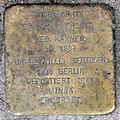
|

|
|
Rosalie Helene (Röschen) Koppel (1907–?) Rosalie Koppel was born in Halle. Because of her family's origins, she was driven across the German-Polish border on October 29, 1938 as part of the “Poland Action” together with other Halle Jews. She was initially housed in a camp in Cracow and after it was closed she moved to relatives of her father in eastern Galicia . After the German invasion of Poland, she was deported. Her further fate is unknown; it is considered lost. |
ROSALIE KOPPEL, born in 1906, lived here, Poland Action 1938 Fate unknown |

|
|||
| Grosse Ulrichstrasse 2 |
May 6, 2004 or May 25/26 Oct. 2004 |
Kurt Bauchwitz (1881–1942) Kurt Bauchwitz came from Sangerhausen and worked in Halle as a lawyer and notary. Until December 16, 1938 he was temporarily interned in Sachsenhausen concentration camp. His first wife Frieda geb. Badl died on April 16, 1940. Kurt Bauchwitz had to leave his apartment on Grosse Ulrichstrasse and move into a “Jewish house” at 63 Hindenburgstrasse (now overbuilt). He tried to emigrate and attended an English course. On April 20, 1942, he got his second marriage to Elsa Burghardt (see Halberstädter Straße 13), but she committed suicide a few days later. Although Kurt Bauchwitz had already received confirmation of his departure on April 15, 1942, he was deported on June 1, 1942 and murdered two days later in the Sobibor extermination camp. The stone originally laid on May 6, 2004, was removed by strangers shortly after it was laid. In October 2004 it was replaced by a new stone. |
This is where KURT BAUCHWITZ, born in 1881, lived, deported in 1942, Sobibor murdered on June 3 , 1942 |

|

|
|
Leo Lewinsky (1878-1943) Leo Lewinsky, born in Berlin, worked as a dentist in Halle. After the death of his wife Bertha, he initially lived alone in his apartment on Ulrichstraße, but then had to move to a supposed old people's home at Boelckestraße 24 (today Dessauer Straße). On February 27, 1943, he was deported to the Theresienstadt ghetto, where he died on April 15, 1943. His daughter and her husband managed to emigrate to the United States. The stone originally laid on May 6, 2004, was removed by strangers shortly after it was laid. In October 2004 it was replaced by a new stone. |
DR. LEO LEWINSKY born in 1878 lived here, deported to Theresienstadt in 1943, dead April 15 , 1943 |
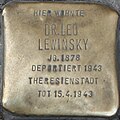
|
|||
| Grosse Ulrichstrasse 27 |
May 6, 2004 |
Arthur Pollak (1882-1942) Arthur Pollak, who comes from Magdeburg , lived with his wife Hedwig nee. Burghardt and their sons Achim and Heinz in Grosse Ulrichstrasse 27, where he also ran a grocery store and a coal shop. After the boycott of Jewish shops, they had to move to a "Judenhaus" at Hindenburgstrasse 63 (today overbuilt). Heinz and Achim Pollak were temporarily interned in concentration camps in 1938 and later emigrated to England. Hedwig Pollak died in 1941. Arthur Pollak was deported on June 1, 1942 and murdered two days later in the Sobibor extermination camp. |
ARTHUR POLLAK, born in 1882 , lived here, deported in 1942, Sobibor murdered on June 3 , 1942 |
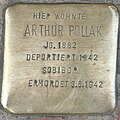
|

|
| Grosse Ulrichstrasse 58 |
May 6, 2004 or May 25/26 Oct. 2004 |
Erich Cahn (1877–1942) Erich Cahn, who was born in Aschersleben , took over a shop for men's and boys' clothing in Halle from his parents in 1911 and ran it until 1938. In 1938 Erich Cahn was interned temporarily in Sachsenhausen concentration camp. He and his wife had to give up their apartment on Ulrichstraße and move into a “Judenhaus” at Hindenburgstraße 63 (today overbuilt). Both were deported on June 1, 1942 and murdered two days later in the Sobibor extermination camp. Erich Cahn's sister Frieda Oppenheim, her husband and her two daughters were among the deportees (see Magdeburger Strasse 28). The stone originally laid on May 6, 2004, was removed by strangers shortly after it was laid. In October 2004 it was replaced by a new stone. |
ERICH CAHN born in 1877 lived here, deported in 1942, Sobibor murdered on June 3 , 1942 |
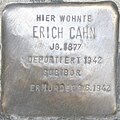
|

|
|
Johanna (Hedwig) Cahn b. Heel (1892–1942) Erich Cahn's wife Johanna (Hedwig) geb. Heel came from Oberlistingen . She and her husband were deported on June 1, 1942 and murdered two days later in the Sobibor extermination camp. The stone originally laid on May 6, 2004, was removed by strangers shortly after it was laid. In October 2004 it was replaced by a new stone. |
JOHANNA CAHN nee lived here . Ferse Born 1892 deported 1942 Sobibor murdered June 3 , 1942 |

|
|||
| Great Berlin 8 |
Jun 9, 2005 |
Aron Abramowitz (1876–1944) The Leipzig-born businessman Aron Abramowitz came to the old people's home Großer Berlin 8 as a widower in 1941, but later had to move to a supposed old people's home at Boelckestraße 24 (today Dessauer Straße). After a detour via Berlin, he was finally deported to Theresienstadt on January 10, 1944, where he died on February 27, 1944. His daughters Lea and Ruth survived the war. On December 16, 2005, the stumbling blocks in front of the address Großer Berlin 8 were doused with tar by strangers. |
ARON ABRAMOWITZ, born in 1876 , lived here, deported to Theresienstadt, dead on February 27, 1944 |

|
overbuilt |
|
Franziska Frank (1874–1944) Franziska Frank came from Eisleben to the old people's home Großer Berlin 8, but later had to move to a supposed old people's home at Boelckestraße 24 (today Dessauer Straße). On September 19, 1942, she was deported to Theresienstadt, where she died on May 22, 1944. On December 16, 2005, the stumbling blocks in front of the address Großer Berlin 8 were doused with tar by strangers. |
FRANZISKA FRANK, born in 1874 , lived here, deported September 19, 1942 Theresienstadt, dead May 22, 1944 |

|
|||
|
Hanna Herschkowicz (1928–1939 / 40) Hanna Herschkowicz was the daughter of Leib and Sara Herschkowicz. She and her parents were driven across the Polish border on October 29, 1938 as part of the “Poland Action”. They then moved to live with relatives in Slupca . Her further fate after the Wehrmacht invaded Poland is not known. On December 16, 2005, the stumbling blocks in front of the address Großer Berlin 8 were doused with tar by strangers. |
HANNA HERSCHKOWICZ, born in 1928 , lived here, expelled October 28, 1938 Poland ? ? ? |
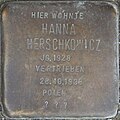
|
|||
|
Leib Herschkowicz (1899–1939 / 40) Leib Herschkowicz came from Kazimierz and worked in Halle as a community servant . He and his wife Sara had a son named Lazar and a daughter named Hanna. Lazar emigrated to Palestine. The couple Herschkowicz and their daughter were driven across the Polish border on October 29, 1938 as part of the “Poland Action”. They then moved to live with relatives in Slupca . On August 27, 1939, Lazar Herschkowicz received the last letter from his family. Her further fate after the Wehrmacht invaded Poland is not known. On December 16, 2005, the stumbling blocks in front of the address Großer Berlin 8 were doused with tar by strangers. |
LEIB HERSCHKOWICZ born in 1899 lived here, expelled October 28, 1938 Poland ? ? ? |

|
|||
|
Sara (h) Herschkowicz b. Stern (1899–1939 / 40) Sara Herschkowicz b. Stern was born in Lodz . Together with her husband and daughter, she was driven across the Polish border on October 29, 1938 as part of the “Poland Action”. The family then moved to live with relatives in Slupca . Her further fate after the Wehrmacht invaded Poland is not known. After the expulsion of the Herschkowicz family, the house at Großer Berlin 8 stood empty for a while and was then converted into an old people's and infirmary home. On December 16, 2005, the stumbling blocks in front of the address Großer Berlin 8 were doused with tar by strangers. |
LEIB HERSCHKOWICZ nee lived here . Stern born in 1899 driven out October 28, 1938 Poland ? ? ? |

|
|||
|
Amalie Israel b. Falkenberg (1877-1942) Amalie Israel b. Falkenberg and her husband Jacob came to the Großer Berlin 8 nursing home. In 1940 they had to move to a supposed nursing home at Boelckestrasse 24 (today Dessauer Strasse), where Jacob Israel died. Amalie Israel was deported on June 1, 1942 and murdered two days later in the Sobibor extermination camp. Her son Martin died in Auschwitz. On December 16, 2005, the stumbling blocks in front of the address Großer Berlin 8 were doused with tar by strangers. A stumbling block was also laid in Wittenberg for Amalie Israel . |
Here lived AMALIE ISRAEL born Falkenberg born in 1877 deported May 30, 1942 Sobibor murdered June 3, 1942 |
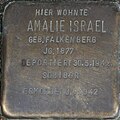
|
|||
|
Flora Jacoby b. Joel (1862-1943) Flora Jacoby came from Inowrazlaw . Her husband Heinrich Jacoby died in a traffic accident in Halle in 1927. She later moved to the old people's home at Großer Berlin 8, but later had to move to a supposed old people's home at Boelckestraße 24 (today Dessauer Straße). On February 23, 1942, she was deported to Theresienstadt, where she died on October 8, 1943. Her son Georg Jacoby and his four children survived the war. One of Flora Jacoby's grandchildren was the architect Helmut Jacoby . On December 16, 2005, the stumbling blocks in front of the address Großer Berlin 8 were doused with tar by strangers. |
FLORA JACOBY nee lived here . Joel born in 1862 deported to Theresienstadt on February 27, 1942, dead on October 8, 1943 |

|
|||
|
Chaim (Hermann) Simon Lerner (1872–1943) Chaim Simon Lerner came from Krakow and ran a second-hand shop in Halle. His wife Jenny geb. Salomon died in 1928. He later moved to the old people's home at Großer Berlin 8, but later had to move to a supposed old people's home at Boelckestraße 24 (today Dessauer Straße). On February 27, 1943, he was deported to Theresienstadt, where he died on August 14, 1943. His daughter Anna Heymann geb. Lerner (see Große Märkerstraße 13) was murdered on June 3, 1942 in Sobibor. On December 16, 2005, the stumbling blocks in front of the address Großer Berlin 8 were doused with tar by strangers. |
CHAIM SIMON LERNER, born in 1872 , lived here, deported February 27, 1943 Theresienstadt, dead August 14, 1943 |

|
|||
|
Pauline Metis b. Simonsohn (1868-1942) Pauline Metis came from Ermsleben and came to the old people's home Großer Berlin 8 as a widow, but later had to move to a supposed old people's home at Boelckestraße 24 (today Dessauer Straße). On September 19, 1942, she was deported to Theresienstadt, where she died on October 5, 1942. On December 16, 2005, the stumbling blocks in front of the address Großer Berlin 8 were doused with tar by strangers. |
PAULINE METIS nee lived here . Simonsohn born in 1868 deported September 19, 1942 Theresienstadt, dead October 5, 1942 |
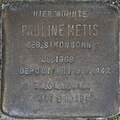
|
|||
|
Rosalie Meyerstein (1860-1943) Rosalie Meyerstein was unmarried and came from Groebzig . On September 13, 1940 she came to the old people's home at Großer Berlin 8, but in 1941 she had to move to a supposed old people's home at Boelckestrasse 24 (today Dessauer Strasse). On September 19, 1942, she was deported to Theresienstadt together with her brother Israel Meyerstein and his wife Bertha (see Brüderstraße 10), where she died on February 27, 1943. On December 16, 2005, the stumbling blocks in front of the address Großer Berlin 8 were doused with tar by strangers. |
ROSALIE MEYERSTEIN, born in 1860 , lived here, deported September 19, 1942 Theresienstadt, dead February 27, 1943 |

|
|||
|
Henriette Reiter born Rothkugel (1869–1942) Henriette Reiter came from Kostschin and initially moved from her apartment on Zinksgartenstraße to the old people's home at Großer Berlin 8, but later had to move to a supposed old people's home at Boelckestraße 24 (today Dessauer Straße). On September 19, 1942 she was deported to Theresienstadt, where she died on October 26, 1942. On December 16, 2005, the stumbling blocks in front of the address Großer Berlin 8 were doused with tar by strangers. |
HENRIETTE REITER nee lived here . Rothkugel born in 1869 deported September 19, 1942 Theresienstadt, dead October 26, 1942 |
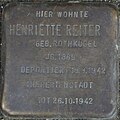
|
|||
|
Alfred Riesenfeld (1882–1942) Alfred Riesenfeld was born in Michalkowitz and lived in Breslau for a long time . He was married to Betty geb. Ferber and had a daughter with her named Annemarie. His wife died in 1935. Alfred Riesenfeld then moved to his daughter in Merseburg . His daughter and her husband managed to escape to Shanghai on April 25, 1939. In 1940 Alfred Riesenfeld moved to the old people's home at Großer Berlin 8, but had to move to a supposed old people's home at Boelckestraße 24 (today Dessauer Straße) on January 5, 1942. He was deported on June 1, 1942 and murdered two days later in the Sobibor extermination camp. On December 16, 2005, the stumbling blocks in front of the address Großer Berlin 8 were doused with tar by strangers. |
ALFRED RIESENFELD, born in 1882 , lived here, deported May 30, 1942 Sobibor murdered June 3, 1942 |
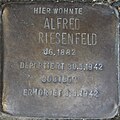
|
|||
|
Leo Seliger (1876–1944) Leo Seliger came from Bad Orb . He first moved to the old people's home at Großer Berlin 8, but later had to move to a supposed old people's home at Boelckestraße 24 (today Dessauer Straße). On September 19, 1942, he was deported to Theresienstadt, where he died on April 16, 1944. On December 16, 2005, the stumbling blocks in front of the address Großer Berlin 8 were doused with tar by strangers. |
LEO SELIGER, born in 1876 , lived here, deported September 19, 1942 Theresienstadt, dead April 16, 1944 |

|
|||
|
Elisabeth Schwarz born Backhaus (1878–1942) Elisabeth born Backhaus came from Wittenberg and married Simon Schwarz there. On November 18, 1939, the couple moved to the old people's home at Großer Berlin 8, but later had to move to a supposed old people's home at Boelckestrasse 24 (today Dessauer Strasse). Both were deported on June 1, 1942 and murdered two days later in the Sobibor extermination camp. On December 16, 2005, the stumbling blocks in front of the address Großer Berlin 8 were doused with tar by strangers. A stumbling block was also laid for Elisabeth Schwarz in Wittenberg . |
ELISABETH SCHWARZ nee lived here . Backhaus born in 1878 deported May 30, 1942 Sobibor murdered June 3, 1942 |

|
|||
|
Simon Schwarz (1878–1942) Simon Schwarz came from Colmar and married Elisabeth born in Wittenberg. Bakehouse. On November 18, 1939, the couple moved to the old people's home at Großer Berlin 8, but later had to move to a supposed old people's home at Boelckestrasse 24 (today Dessauer Strasse). Both were deported on June 1, 1942 and murdered two days later in the Sobibor extermination camp. On December 16, 2005, the stumbling blocks in front of the address Großer Berlin 8 were doused with tar by strangers. A stumbling block was also laid for Simon Schwarz in Wittenberg . |
SIMON SCHWARZ, born in 1878 , lived here, deported May 30, 1942 Sobibor murdered June 3, 1942 |

|
|||
|
Frieda Zuckermann (1887–1942) Frieda Zuckermann came from Wulka (Poland) and was considered stateless. She first moved from her apartment on Wörmlitzer Straße to the old people's home at Großer Berlin 8, but later had to move to a supposed old people's home at Boelckestraße 24 (today Dessauer Straße). She was deported on June 1, 1942 and murdered two days later in the Sobibor extermination camp. On December 16, 2005, the stumbling blocks in front of the address Großer Berlin 8 were doused with tar by strangers. |
FRIEDA ZUCKERMANN, born in 1887 , lived here, deported on May 30, 1942, Sobibor murdered on June 3, 1942 |

|
|||
| Halberstädter Strasse 13 |
May 29, 2007 |
Elsa Bauchwitz born Burghardt (1893–1942) Elsa Burghardt, daughter of Marie and Moritz Burghardt, shared an apartment with her mother, her sister-in- law Lina Burghardt and her son Siegfried. Lina, Marie and Elsa Burghardt later had to leave their apartment and move to a Jewish house at Hindenburgstrasse 34 (today Magdeburger Strasse 7). Elsa Burghardt married the lawyer Kurt Bauchwitz on April 20, 1942 (see Große Ulrichstraße 2). However, after learning of her imminent deportation, she committed suicide on May 10, 1942. |
ELSA BAUCHWITZ nee lived here . Burghardt, born 1893, suicide May 10th, 1942 before deportation |

|
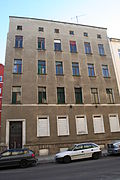
|
|
Lina Burghardt b. Schönheim (1866–1944) Lina Schönheim came from Bleicherode and married the merchant Gerson Burghardt. With him she had two sons named Siegfried and Walter, as well as a daughter named Hedwig (see Grosse Ulrichstrasse 27). Gerson Burghardt died in 1930. She shared an apartment at Halberstädter Strasse 13 with her son, her widowed sister-in-law Marie Burghardt and her daughter Elsa. Lina, Marie and Elsa Burghardt later had to leave their apartment and move to a Jewish house at Hindenburgstrasse 34 (today Magdeburger Strasse 7). On June 25, 1942, Lina Burghardt had to move to a supposed old people's home at Boelckestrasse 24 (today Dessauer Strasse). On September 19, 1942, she was deported to the Theresienstadt ghetto, where she died on January 17, 1944. Her daughter Hedwig had died in Halle in 1941, her son Walter survived the war. |
LINA BURGHARDT nee lived here . Schönheim born in 1866 deported to Theresienstadt in 1942, dead January 17th, 1944 |
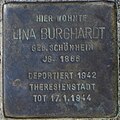
|
|||
|
Marie Burghardt b. Bach (1870–1945) Marie Bach came from Leipzig. She converted to Judaism and married Gerson Burghardt's brother Moritz, who was also a businessman. She had five children with him. Moritz Burghardt died in 1907. Marie Burghardt then shared an apartment at Halberstädter Straße 13 with her daughter Elsa, her sister-in-law Lina Burghardt and their son Siegfrid. Lina, Marie and Elsa Burghardt later had to leave their apartment and move to a Jewish house at Hindenburgstrasse 34 (today Magdeburger Strasse 7). Her two sons Alfred Josef and Rudolf Abraham were able to emigrate to Shanghai in 1939. The first names and fate of her two other daughters are unknown. Marie Burghardt died on October 2, 1945 in Halle an der Saale. |
MARIE BURGHARDT nee lived here . Bach born in 1870 ? ? ? |

|
|||
|
Siegfried Burghardt (1889–1939) Siegfried Burghardt, son of Lina and Gerson Burghardt, initially worked in the family business and, after its liquidation, as a textile goods dealer from 1934. On June 14, 1938, he was sent to Buchenwald concentration camp, where he died on March 2, 1939. |
Here lived SIEGFRIED BURGHARDT Jg. 1888 arrested Buchenwald 1,938 dead 02.03.1939 |

|
|||
|
Handelstrasse 3 |
Dec 12, 2006 |
Emilie Oppenheimer b. Election (1869–1944) Emilie Wahl, who came from Erfurt , was married to Gustav Oppenheimer, the community doctor of the Jewish community in Halle. The marriage had two children: Käthe Weinspach-Müller, b. Oppenheimer and Werner Oppenheimer. Together with her sister-in-law Johanna Ziegelroth geb. Oppenheimer (see Uhlandstrasse 10) she supported her husband in his work for financially disadvantaged families. After the death of her husband, Emilie Oppenheimer first moved to her daughter in Handelstrasse, but on June 30, 1942, she had to move to a supposed old people's home at Boelckestrasse 24 (today Dessauer Strasse). On September 20, 1942, she was deported to the Theresienstadt ghetto, where she died on March 31, 1944. Their two children managed to escape from Germany. |
EMILIE OPPENHEIMER nee lived here . Wahl born in 1869 deported to Theresienstadt in 1942, dead 31.3.1944 |
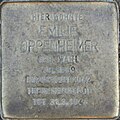
|

|
| Haendelstrasse 26 |
Oct 11, 2014 |
Hermann Jastrowitz (1882–1943) Hermann Jastrowitz had served as a soldier in World War I and practiced as a doctor in Halle from 1921. He also had a teaching position at the University Polyclinic. In the course of the November pogroms he was interned in the Buchenwald concentration camp in 1938 and only released in December. In November 1941 he and his wife Adele had to move to the Großer Berlin 8 nursing home. On February 27, 1943, both were deported to Auschwitz and murdered there. |
HERMANN JASTROWITZ, born in 1882 , lived here . Deported in 1943, murdered in Auschwitz |
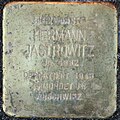
|

|
|
Adele Jastrowitz b. Jastrowitz (1892-1943) Adele Jastrowitz came from Karlsbad and was married to her cousin Hermann. In November 1941 the couple had to move to the Großer Berlin 8 nursing home. On February 27, 1943, both were deported to Auschwitz and murdered there. |
ADELE JASTROWITZ nee lived here . Jastrowitz born in 1892 deported, murdered in Auschwitz in 1943 |

|
|||
|
Hansering 2 (formerly Preußenring, later Adolf-Hitler-Ring) |
Apr 4, 2006 |
Alfred Katz (1870–1942) Alfred Katz came from Duderstadt and married Helene Friedmann in Halle in 1896. In 1897 he moved his residence there and founded the Friedmann & Co. banking house. His son Herbert Katz and daughter Gertrud Katz emerged from his marriage. Gertrud Katz married the lawyer Willy Cohn in 1920. Herbert Katz emigrated to Palestine with his wife and daughter in 1933. After the death of his wife, Alfred Katz lived with his daughter and her family in a "Jewish house" at Königstrasse 32 (today Rudolf-Breitscheid-Strasse) from January 10, 1939. Between May and August 1939, Alfred Katz's grandson and then his daughter were able to travel to England. In August 1939 his son-in-law also emigrated to Belgium , but was later arrested there and murdered in Auschwitz on August 10, 1942. On May 20, 1941, Alfred Katz had to move to a supposed old people's home at Boelckestrasse 24 (today Dessauer Strasse). He committed suicide on June 29, 1942. |
ALFRED KATZ, born in 1870, lived here, fleeing to death 29.6.1942 |

|

|
| Hansering 17 (formerly Preußenring, later Adolf-Hitler-Ring) |
Apr 4, 2006 |
Adolf Goldberg (1898–1942) Adolf Goldberg was born in Marburg . He served as a volunteer in World War I and lost a leg. He married Erna Fackenheim in Halle and ran a law firm with her brother Julius. On October 7, 1940, Adolf Goldberg was taken into "protective custody" in Halle and transferred to Buchenwald concentration camp on December 18, 1941. As part of Aktion 14f13, he was transferred to the Bernburg killing center on March 12, 1942 and murdered on the same day. |
ADOLF GOLDBERG, born in 1898, lived here in 1940 Buchenwald Heilanstalt Bernburg concentration camp murdered March 12/13, 1942 T-4 Aktion |

|
tore off |
|
Erna Goldberg born Fackenheim (1893–1938) Erna Goldberg born Fackenheim came from Halle. Shortly after the Reichspogromnacht, she committed suicide on November 14, 1938. Erna Goldberg's brother and his family managed to escape to England. One of his sons was the philosopher and rabbi Emil Fackenheim . |
ERNA GOLDBERG nee lived here . Fackenheim Born 1893 Escape to death November 14, 1938 |

|
|||
| Resin 18 |
Nov 3, 2012 |
Regina Lewin b. Rautenberg (1889–?) Regina Lewin b. Rautenberg lived with her sister Adele and her husband Caesar Salomon. She later moved to Plauen . On May 10, 1942, she was deported to the Bełżyce ghetto , where she later died. |
REGINA LEWIN nee lived here . Rautenberg born in 1889 deported to Belzyce in 1942, fate unknown |
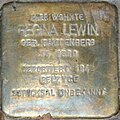
|
overbuilt |
|
Adele Salomon b. Rautenberg (1881-1942) Adele born Rautenberg came from Lautenburg . After she and her husband Caesar had to leave their apartment, Adele Salomon came to live with the Schloß family at Koenigsstrasse 62 (today Rudolf-Breitscheid-Strasse). On June 1, 1942, Caesar and Adele Salomon were deported and murdered two days later in the Sobibor extermination camp. Adele's brother Jakob and his wife Käte were among the deportees (see Ludwig-Wucherer-Straße 45). |
ADELE SALOMON nee lived here . Rautenberg born 1881 deported June 1st, 1942 Sobibor murdered June 3rd, 1942 |

|
|||
|
Caesar Salomon (1880-1942) Caesar Salomon came from Czychen (East Prussia). He was temporarily interned in Dachau concentration camp until December 20, 1938 . After they had to leave their apartment, Caesar Salomon found accommodation in the "Judenhaus" Harz 48. On June 1, 1942, Caesar and Adele Salomon were deported and murdered two days later in the Sobibor extermination camp. |
CÄSAR SALOMON, born in 1880 , lived here, deported June 1st, 1942 Sobibor murdered June 3rd, 1942 |

|
|||
| Humboldtstrasse 41 |
May 17, 2008 |
Manfred Vogel (1919–1941) Manfred Vogel was a patient at the Altscherbitz State Hospital. As part of "Aktion T4", he was transferred to the Bernburg killing center on June 16, 1941 and murdered on the same day. |
MANFRED VOGEL, born in 1919, lived here from 'Landesheilanstalt' Altscherbitz on June 16, 1941 to 'Heilanstalt' Bernburg, murdered on June 16 , 1941 |
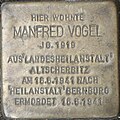
|

|
| Kirchnerstrasse 10 |
March 22, 2018 |
Elli Victor (1889-1942) Elli Victor was the daughter of N. and Emilie Victor. The family had to leave their apartment in Kirchnerstrasse and move to a “Judenhaus” at Hindenburgstrasse 34 (today Magdeburger Strasse 7). Elli Victor and her brother Moritz were deported on June 1, 1942 and murdered two days later in the Sobibor extermination camp. |
ELLI VICTOR, born in 1889 , lived here, deported on June 1, 1942, Sobibor murdered on June 3, 1942 |
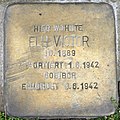
|

|
|
Emilie Victor b. Simon (1855-1942) Emilie born Simon was born in Güsten and married N. Victor, who ran a horse shop in Halle. The couple had a son named Moritz and a daughter named Elli. The family had to leave their apartment in Kirchnerstrasse and move to a “Judenhaus” at Hindenburgstrasse 34 (today Magdeburger Strasse 7). Emilie Victor died on February 25, 1942. |
EMILIE VICTOR nee lived here . Simon born in 1855 humiliated / disenfranchised dead February 25, 1942 |

|
|||
|
Moritz Victor (1878–1942) Moritz Victor was the son of N. and Emilie Victor and took over his father's business in Halle. The family had to leave their apartment in Kirchnerstrasse and move to a “Judenhaus” at Hindenburgstrasse 34 (today Magdeburger Strasse 7). Moritz Victor and his sister Elli were deported on June 1, 1942 and murdered two days later in the Sobibor extermination camp. |
MORITZ VICTOR, born in 1878 , lived here, deported on June 1, 1942, Sobibor murdered on June 3, 1942 |

|
|||
| Kleine Brauhausstrasse 7 |
Oct 29, 2010 |
Edith Mühlbauer (1929–1943) Edith Mühlbauer was born in 1926 as the daughter of Mendel and Sala-Ruda Mühlbauer and the twin sister of Susi Mühlbauer. Probably at the end of 1937 the family emigrated illegally to Belgium and settled in Antwerp in 1939. After the German occupation of Belgium, Mendel, Sala-Ruda, Edith and Josua Mühlbauer were interned in the SS assembly camp in Mechelen and deported to Auschwitz-Birkenau on July 31, 1943, where they were murdered on August 2, 1943. |
EDITH MÜHLBAUER, born in 1929, lived here, escaped 1937, interned in Belgium , Mechelen, deported in 1943, murdered Auschwitz on August 2nd , 1943 |

|
tore off |
|
Josua Mühlbauer (1936–1943) Josua Mühlbauer was born in 1936 to Mendel and Sala-Ruda Mühlbauer. Probably at the end of 1937 the family emigrated illegally to Belgium and settled in Antwerp in 1939. After the German occupation of Belgium, Mendel, Sala-Ruda, Edith and Josua Mühlbauer were interned in the SS assembly camp in Mechelen and deported to Auschwitz-Birkenau on July 31, 1943, where they were murdered on August 2, 1943. |
JOSUA MÜHLBAUER, born in 1936, lived here, escaped 1937, interned in Belgium , Mechelen, deported in 1943, murdered Auschwitz on August 2nd , 1943 |

|
|||
|
Mendel Mühlbauer (1900–1943) Mendel Mühlbauer came from Halle and worked as a businessman. He married Sala-Ruda Schenkalowski. Probably at the end of 1937 the family emigrated illegally to Belgium and settled in Antwerp in 1939. After the German occupation of Belgium, Mendel, Sala-Ruda, Edith and Josua Mühlbauer were interned in the SS assembly camp in Mechelen and deported to Auschwitz-Birkenau on July 31, 1943, where they were murdered on August 2, 1943. |
This is where MENDEL MÜHLBAUER, born in 1900, lived . Escape 1937 Belgium interned Mechelen deported 1943 Auschwitz murdered August 2 , 1943 |
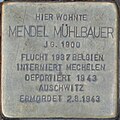
|
|||
|
Sala-Ruda Mühlbauer b. Schenkalowski (1902–1943) Sala-Ruda Schenkalowski came from Paljanice ( Croatia ) and married Mendel Mühlbauer. The twin daughters Susi and Edith were born in 1926, and their son Josua in 1936. Probably at the end of 1937 the family emigrated illegally to Belgium and settled in Antwerp in 1939. After the German occupation of Belgium, Mendel, Sala-Ruda, Edith and Josua Mühlbauer were interned in the SS assembly camp in Mechelen and deported to Auschwitz-Birkenau on July 31, 1943, where they were murdered on August 2, 1943. |
SALA-RUDA MÜHLBAUER nee lived here . Schenkalowski born in 1902 Escape 1937 Belgium interned Mechelen deported 1943 Auschwitz murdered 2.8.1943 |

|
|||
|
Susi Mühlbauer (1929–1946) Susi Mühlbauer was born in 1926 as the daughter of Mendel and Sala-Ruda Mühlbauer and the twin sister of Edith Mühlbauer. Probably at the end of 1937 the family emigrated illegally to Belgium and settled in Antwerp in 1939. After the German occupation of Belgium, she was able to hide in a monastery. After the war she emigrated to Palestine, but died there in 1946 at the age of 17. |
SUSI MÜHLBAUER, born in 1929, lived here . Escape 1937 Belgium, hidden in a monastery, liberated dead in Palestine in 1946 |

|
|||
| Kleine Klausstraße 3 (formerly 7) |
Dec 12, 2006 |
Gertrud Lichtenstein (1903–1943) Gertrud Lichtenstein was the daughter of Lena and Jacob Lichtenstein. After the family had to close their last business in 1938, Gertrud Lichtenstein first emigrated to Belgium in April 1939. Her mother and sister followed in May / June. After the German occupation of Belgium, Gertrud Lichtenstein, her sister and her brother-in-law were interned in the SS assembly camp in Mechelen and deported to Auschwitz-Birkenau on April 19, 1943, where they were murdered on April 22, 1943. |
Here lived GERTRUD LICHTENSTEIN Jg. 1903 escape 1939 Belgium deported in 1943 murdered in Auschwitz |
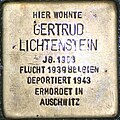
|

|
|
Lena Lichtenstein (1865–?) Lena Lichtenstein ran a hat shop with her husband Jacob. The couple had two sons named Heinrich and Siegfried and two daughters named Henny and Gertrud. Heinrich Lichtenstein ran a cloth store, Siegfried and Gertrud Lichtenstein together ran a fur store. Jacob Lichtenstein died in 1933, his wife ran the hat business until 1935. In 1936 Siegfried and Heinrich Lichtenstein fled to Prague. In 1938 Siegfried emigrated to Paris , Heinrich in 1939 to England. Lena and Henny Lichtenstein followed Gertrud Lichtenstein, who had previously fled to Belgium, in May / June 1939. Lena Lichtenstein probably died a little later. |
LENA LICHTENSTEIN, born in 1865, lived here . Escape 1939 Belgium ? ? ? |

|
|||
|
Henny Wachter b. Lichtenstein (1899-1943) Henny Wachter b. Lichtenstein was the daughter of Lena and Jacob Lichtenstein. She worked in her parents' business and household. After the family had to close their last business in 1938, she and her mother followed Gertrud Lichtenstein, who had previously fled to Belgium, in May / June 1939. In Belgium, Henny Lichtenstein married the Cologne merchant Abraham Wachter. After the German occupation of Belgium, she, her husband and her sister were interned in the SS assembly camp in Mechelen and deported on April 19, 1943 to Auschwitz-Birkenau, where they were murdered on April 22, 1943. |
HENNY WACHTER nee lived here . Lichtenstein born in 1899, escaped in 1939, deported to Belgium , murdered in Auschwitz in 1943 |
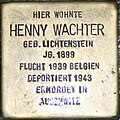
|
|||
| Kleine Märkerstrasse 3 |
Jun 9, 2012 |
Johann Hanselmann (1892–1942) Johann Hanselmann came from a farming family in Frankenberg and worked there as a blacksmith, locksmith and beekeeper. During a stay in a hospital during World War I, he came into contact with the Seventh-day Adventist religious community . Since 1928 he worked as a priest and head of the "East German Association of the Seventh-day Adventist Community (Reformation Movement) ". He was married and had two children. Because of his religious affiliation, Hanselmann was arrested in September 1936 and served a prison sentence in Dresden until October 1937 . He then worked as a sales representative. His last place of residence was Mühringen . On October 24, 1940, he was sentenced to another year and a half in prison in Halle. In December 1941, Hanselmann was transferred to the Sachsenhausen concentration camp before the planned end of prison term, where he died on May 13, 1942. Ruhr was given as the official cause of death. His stumbling block was laid in front of the parish hall of the Advent community in Halle. |
JOHANN HANSELMANN Reform Adventist born in 1892 arrested in 1940 Sachsenhausen concentration camp dead May 13, 1942 |
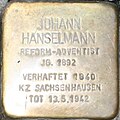
|

|
|
Kleine Ulrichstrasse 8 |
Dec 14, 2007 |
Erna Hummel (1901–1940) Erna Hummel and her brothers came from poor backgrounds. Her father Friedrich Hummel was a rag dealer and had four other children with his wife. The mother died early. Erna Hummel was admitted to the Altscherbitz State Hospital at the age of 18. As part of "Aktion T4", she was transferred to the Bernburg killing center and murdered with gas. A fake date and place of death was given in the official death certificate. |
Here lived ERNA HUMMEL Jg. 1901 from Landesheilanstalt Altscherbitz on 12.06.1940 by 'sanatorium' Bernburg murdered 06/12/1940 |

|
overbuilt |
|
Kurt Hummel (1906–1940) Kurt Hummel was admitted to the Altscherbitz State Hospital at the age of 25. He was diagnosed with “congenital nonsense” and final schizophrenia. As part of "Aktion T4", he was transferred to the Brandenburg killing center in October 1940 and murdered with gas. A fake date and place of death was given in the official death certificate. |
This is where KURT HUMMEL, born in 1906, from the Altscherbitz State Sanatorium lived on October 23, 1940 after 'nursing home' Brandenburg murdered October 23, 1940 |
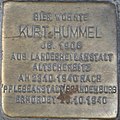
|
|||
|
Otto Hummel (1903-1940) Otto Hummel was admitted to the Altscherbitz State Hospital at the age of 25. He was diagnosed with "profound nonsense with a tendency to anti-social acts". As part of "Aktion T4", he was transferred to the Brandenburg killing center in June 1940 and murdered with gas. A fake date and place of death was given in the official death certificate. |
This is where OTTO HUMMEL, born in 1903, from the Altscherbitz State Sanatorium lived on June 1st, 1940 after 'nursing home' Brandenburg murdered June 1st, 1940 |

|
|||
| Kleine Ulrichstrasse 31 |
26 Sep 2013 |
Ernst Grünberger (1899–1943) Ernst Grünberger was born in Zabrze and worked as a businessman in Halle. He and his wife Nelly planned to emigrate to Palestine and completed an agricultural training course in Neuendorf in Brandenburg as part of the Hachschara . However, they were unable to carry out their emigration plans. Around 1941 they were interned in a subcamp near Wulkow near Hangelsberg , where they had to do forced labor as agricultural and forest workers. On April 19, 1943, both were deported from Berlin to Auschwitz, where they later died. |
ERNST GRÜNBERGER, born in 1899 , lived here, deported in 1943, murdered in Auschwitz |

|
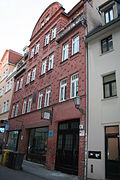
|
|
Nelly Grünberger born Pike (1906–1943) Nelly Grünberger born Hecht came from Königshütte, Upper Silesia . Around 1941 she and her husband were interned in a subcamp near Wulkow near Hangelsberg . On April 19, 1943, both were deported to Auschwitz concentration camp, where they later died. |
NELLY GRÜNBERGER nee lived here . Hecht born in 1906 deported, murdered in Auschwitz in 1943 |

|
|||
| Kleine Ulrichstraße 38 (formerly 37) |
Apr 4, 2006 |
Alfred Willi Tilke (1899–1940) Alfred Willi Tilke came from Alt Jäschwitz in Lower Silesia and was a member of the Jehovah's Witness community . He was married and had a son. Because of his religious affiliation, he was sentenced in May 1937 with 22 co-religionists and had to serve a two-year prison sentence. After serving them, he was deported to Neuengamme concentration camp , where he died on April 9, 1940. |
ALFRED WILLI TILKE lived here, Jehovah's Witness born in 1899, arrested in 1937 Neuengamme concentration camp, murdered April 9, 1940 |

|
overbuilt |
| Kohlschütterstrasse 6 |
May 29, 2007 |
Eduard Oppenheim (1879–1942) Eduard Oppenheim came from Velmede . He and his wife Erna had two sons who emigrated to England and the United States respectively and a daughter who died in 1937. Eduard Oppenheim ran a wholesale business for agricultural products in Halle. After he was no longer allowed to practice his profession, he was obliged to do forced labor. The Oppenheims had to give up their apartment in Kohlschütterstrasse and move into a "Jewish house" at 63 Hindenburgstrasse (today overbuilt). On June 1, 1942, the couple were deported together with Edward's brother Georg, his wife Frieda and their two daughters (see Magdeburger Strasse 28) and murdered two days later in the Sobibor extermination camp. |
EDUARD OPPENHEIM, born in 1879 , lived here, deported in 1942, Sobibor murdered on June 3 , 1942 |

|

|
|
Erna Oppenheim b. Baum (1891–1942) Erna Oppenheim b. Baum came from Dortmund . She and her husband had to move into a "Judenhaus" at Hindenburgstrasse 63 (today overbuilt). The couple were deported on June 1, 1942 and murdered two days later in the Sobibor extermination camp. |
ERNA OPPENHEIM nee lived here . Baum born in 1891 deported 1942 Sobibor murdered June 3 , 1942 |

|
|||
| Kohlschütterstrasse 7/8 |
May 29, 2007 |
Frieda Redelmeyer b. Apple (1890–1942) Frieda Redelmeyer came from Bebra . She was married to the grain and feed merchant Moritz Redelmeyer, who died on February 4, 1937. The couple had two daughters who emigrated to the United States. Frieda Redelmeyer had to give up her apartment on Kohlschütterstrasse and move into a “Jewish house” at Hindenburgstrasse 34 (today Magdeburger Strasse 7). Frieda Redelmeyer was deported on June 1, 1942 and murdered two days later in the Sobibor extermination camp. |
FRIEDA REDELMEYER nee lived here . Apple born in 1890 deported 1942 Sobibor murdered June 3 , 1942 |
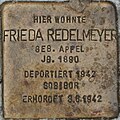
|

|
| Körnerstrasse 26 |
May 17, 2008 |
Frieda Göhre b. Tölzing (1903-1940) Frieda Tölzing came from Halle and had been in poor health since childhood. After graduating from school, she completed an apprenticeship as a tailor. In 1931 she married the locksmith Otto Göhre and gave birth to a child. After Otto Göhre's death, she married again. In 1934 she fell ill with paranoid schizophrenia and was finally admitted to the Altscherbitz State Sanatorium in May 1935 after interim stays in other clinics. On December 6, 1940, she was transferred to the Bernburg killing center, where she was murdered on the same day as part of Operation T4. |
Here lived FRIEDA Göhre Jg. 1903 from 'Landesheilanstalt' Altscherbitz on 06.02.1940 by 'sanatorium' Bernburg murdered 12/06/1940 |

|

|
| Krausenstrasse 10 |
Nov 10, 2015 |
Charlotte Stempel (1894–1940) Charlotte Stempel was born to Rosa Stempel's daughter. On May 25, 1939, she managed to escape to Shanghai, where she committed suicide on August 1, 1940. |
CHARLOTTE STEMPEL, born in 1894, lived here . Emigration 25.4.1939 Shanghai Escape to death 1.8.1940 |
tore off | |
|
Born pink stamp Cerf (1867–1942) The pink stamp came from Aken (Elbe) . On September 19, 1942 she was deported to Theresienstadt, where she died on October 8. |
ROSA STEMPEL nee lived here . Cerf born 1867 deported September 19, 1942 Theresienstadt dead October 8, 1942 |
||||
|
Siegfried Stempel (1888–1940) Siegfried Stempel was born in Halle as the son of Rosa Stempel. He was sent to the Buchenwald concentration camp for the first time on June 5, 1938. On August 9, 1938, he was sentenced to three months' imprisonment in Halle "for insult and gross nonsense" because he had greeted a non-Jew with the Hitler salute. Then he was again in the Buchenwald concentration camp. On April 23, 1940, he was sentenced to four months' imprisonment in Dresden “for deceptive advertising” because he had not stated that he represented a Jewish company. He was sent to Buchenwald concentration camp for the third time on September 7, 1940 at the latest, where he died on September 18, 1940. |
Here lived SIEGFRIED STAMP Jg. 1888 from 1938 repeatedly imprisoned Buchenwald dead 09.18.1940 |
||||
|
Lafontainestrasse 4 |
Nov 3, 2012 |
Leo Schönbach (1892–1945) Leo Schönbach was born in Leipzig. The family later moved to Halle, where his father Schaul Hersch, known as Hermann Schönbach, ran a shop for household and kitchen appliances. Leo Schönbach's father died in 1928, his brother Jakob took over the business. Leo Schönbach received music training at the Leipzig Conservatory and then played as a solo cellist at the Ducal Court Theater in Altenburg . 1917–1920 he worked as a choir director and 1920–1924 as a solo repetitor and conductor in Halle. He then worked as a freelance musician and music teacher until he was banned from performing on German stages in 1935. From then on he earned his living by performing, which were organized by the Kulturbund Deutscher Juden . In 1938 the Schönbachs were asked to leave Germany immediately. Leo Schönbach and his brother Jakob emigrated to Shanghai on March 11, 1939, their sister Regina and Jakob's family followed a little later. Leo Schönbach died of a stroke on February 4, 1945 in Shanghai. His brother returned to Halle with his family after the war, and his sister emigrated to the United States. |
LEO SCHÖNBACH, born in 1892, lived here, escaped from Shanghai in 1939, dead February 4, 1945 |
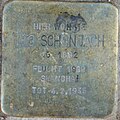
|

|
|
Lafontainestrasse 5 |
25./26. Oct. 2004 |
Edmund Aronsohn (1871-1939) Edmund Aronsohn from Graudenz worked in Halle as a lawyer and notary. He had two sons with his wife Fanny. Edmund Aronsohn died on January 26, 1939. |
EDMUND ARONSOHN Jg. Lived here ? dead January 27, 1939 |

|

|
|
Fanny Aronsohn born Rosenthal (1883–1942) Fanny Aronsohn born Rosenthal came from Wetzlar . After the death of her husband, she had to leave her apartment on Lafontainestrasse and move into a “Jewish house” at Königstrasse 62 (today Rudolf-Ernst-Weise-Strasse 20). She was deported on June 1, 1942 and murdered two days later in the Sobibor extermination camp. |
FANNY ARONSOHN nee lived here . Rosenthal born in 1883 deported 1942 Sobibor murdered June 3 , 1942 |

|
|||
|
Oskar Aronsohn (1914–1942) Edmund and Fanny Aronsohn's son Oskar had been a patient in the Jewish sanatorium in Bendorf - Sayn since at least 1938 . On June 15, 1942, he was also deported to Sobibor and murdered. The first name and fate of the Aronsohn's second son are unknown. |
OSKAR ARONSOHN, born in 1916, lived here, Bendorf-Sayn sanatorium, deported in 1942, murdered in Sobibor |

|
|||
| Lafontainestrasse 10 |
Nov 3, 2012 |
Richard Hesse (1896–1984) Richard Hesse was born in Bleicherode as the youngest of three children to a couple of textile dealers . His sister Margarete died at the age of 19, his brother Walter died in the First World War. In 1915 Richard Hesse began studying law in Frankfurt am Main , but then volunteered for military service and continued his studies after the war. In 1926 he opened a law firm in Halle. In 1930 she married Elisabeth Kubenka. Since 1934 they had an apartment at Blumenthalstrasse 18 (today Adolf-von-Harnack-Strasse). Due to his Jewish descent, he had been banned from practicing his profession since 1933, but worked as a volunteer for the Jewish community in Halle until 1938. After the Reichspogromnacht, he was supposed to be arrested on November 10, 1938, but was not in his home at the time. From 1939 he headed the Leipzig “Advice Center of the Aid Association of Jews in Germany” until it was closed in 1942. Afterwards he and his non-Jewish wife were obliged to do forced labor in Halle. They had to give up their apartment and move to the Harz 48 house, which was declared a "Jewish house". From June 1943 on, Richard Hesse had to stop working as the “Confidante of the Rest of the Reich Association of Jews in Germany” for Halle and the administrative district of Merseburg on the instructions of the Gestapo . In February 1945 he was deported to the Theresienstadt ghetto together with the last Halle Jews. He survived and returned to Halle in June 1945. He and his wife moved into an apartment at Lafontainestrasse 10. He reopened a law firm, became head of the department for Jewish affairs in the reparation work and joined the LDP and the FDGB . Due to a slander for alleged betrayal of Jews from Halle to the Gestapo , he was arrested by the NKVD in January 1946 and initially imprisoned in Soviet special camp No. 8 in Torgau. Towards the end of the year he was transferred to Soviet special camp No. 2 (the former Buchenwald concentration camp). Towards the end of the year he was transferred to Buchenwald concentration camp. After its dissolution, he was sent to Waldheim prison on February 14, 1950 , where he was sentenced to 18 years in prison as part of the notorious " Waldheim Trials ", although all survivors questioned by the police denied the allegations. After Stalin's death, he was pardoned on July 11, 1954. His later requests for rehabilitation went unanswered. He then worked in Halle as an economist. Two weeks after the death of his wife, he committed suicide on September 7, 1984. On April 27, 2009, the Rehabilitation Chamber of the Chemnitz Regional Court declared Richard Hesse's 1950 conviction to be contrary to the rule of law and his imprisonment to be injustice. |
RICHARD HESSE born in 1896 lived here . Deported Feb. 1945 Theresienstadt liberated in 1946, arrested by the NKWD Buchenwald, Torgau Waldheim, Bautzen 1954 released |
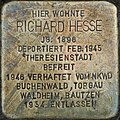
|

|
| Lafontainestrasse 23 |
Apr 4, 2006 |
Marie Fürth born Amann (1881-1942) Marie Fürth came from Prague and converted to the Protestant faith. She was married to the chemical engineer Arthur Fürth, who died in Halle in 1934. Their son Georg was born in 1918 and emigrated to England in 1936. Marie Fürth had to give up her apartment on Lafontainestrasse and move to the "Judenhaus" Harz 48. She was deported on June 1, 1942 and murdered two days later in the Sobibor extermination camp. |
MARIE FÜRTH nee lived here . Amann born in 1881 deported 1942 Sobibor concentration camp murdered June 3, 1942 |
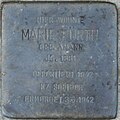
|

|
| Landrain 144 |
Oct 15, 2011 |
Paul Elkan (1899-1942) Paul Elkan was born in Halle and worked here as a businessman. He was married to the non-Jew Charlotte born. Liebau. The daughter Ruth was born in 1923 and the daughter Edith in 1927. After the divorce, Ruth stayed with her mother and Edith with her father. Paul and Edith Elkan later had to leave their apartment and move to a Jewish house at Forsterstrasse 13. Paul Elkan last worked as an employee in a supposed Jewish retirement home at Boelckestrasse 24 (today Dessauer Strasse). On June 1, 1942, he was deported along with its residents. While most of the other inmates on the transport were taken to the Sobibor extermination camp and murdered there, Paul Elkan was sent to the Majdanek concentration camp for labor. He died there on September 17, 1942. |
PAUL ELKAN, born in 1899 , lived here, deported in 1942 from Majdanek, dead on September 27 , 1942 |

|

|
| Landsberger Strasse 65 |
Oct 11, 2014 |
Anna Brilling born Bennigsohn (1874–1944) Anna Brilling born Benningsohn came from Wystiten . She and her husband Max had two sons named Bruno and Julius. The couple ran a horse shop in Halle. They later moved to Berlin. They were deported to the Theresienstadt Ghetto on August 26, 1942 and to the Auschwitz-Birkenau concentration camp on May 16, 1944, where they perished. Her son Julius managed to escape from Germany. |
ANNA BRILLING nee lived here . Benningsohn born in 1874 deported 1942 Theresienstadt 1944 Auschwitz murdered |
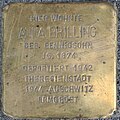
|
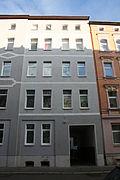
|
|
Bruno Brilling (1905–1942) Bruno Brilling was born in Norutschatschen as the son of Max and Anna Brilling. In Halle he worked as a textile dealer. Bruno Brilling and his wife Regina emigrated to Bressoux (Belgium) on January 6, 1939 . They were later interned in France. Via Camp de Gurs and the Drancy assembly camp , they reached Auschwitz-Birkenau on August 14, 1942, where Bruno Brilling died on September 7, 1942. |
BRUNO BRILLING born in 1905 lived here, escaped 1939 Belgium / France interned deported 1942 Auschwitz murdered September 7 , 1942 |

|
|||
|
Max Brilling (1873-1944) Max Brilling came from Luschen ( Gumbinnen ). He and his wife Anna ran a horse shop in Halle. They later moved to Berlin. They were deported to the Theresienstadt Ghetto on August 26, 1942 and to the Auschwitz-Birkenau concentration camp on May 16, 1944, where they perished. |
MAX BRILLING born in 1873 lived here . Deported 1942 Theresienstadt. 1944 Auschwitz murdered |
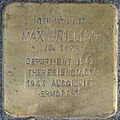
|
|||
|
Regina Brilling born Mayer (1910-1942) Regina Mayer came from Wiesbaden and married Bruno Brilling in Halle. On January 6, 1939, both emigrated to Bressoux (Belgium). They were later interned in France. Via Camp de Gurs and the Drancy assembly camp, they reached Auschwitz-Birkenau on August 14, 1942, where Regina Brilling died on September 13, 1942. |
REGINA BRILLING nee lived here . Mayer, born 1910, escaped in 1939, interned in France , deported in 1942, murdered in Auschwitz on September 13 , 1942 |

|
|||
| Landsberger Strasse 67 |
Oct 11, 2014 |
Max Buchsbaum (1880–1944) Max Buchsbaum came from Wüstensachsen and was born with Meta. Abraham married. The two sons Alfred and Walther were born in Wüstensachsen. Max Buchsbaum ran a knitwear shop in Halle. The Buchsbaum couple had to give up their apartment on Landsberger Straße and move to Königsstraße 18. On September 19, 1942, they were deported to the Theresienstadt ghetto and on October 9, 1944 to the Auschwitz-Birkenau concentration camp, where they perished. Their two sons emigrated to the United States in 1938 and 1939. |
MAX BUCHSBAUM, born in 1880 , lived here . Deported 1942 Theresienstadt. 1944 Auschwitz murdered |
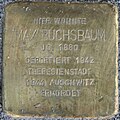
|
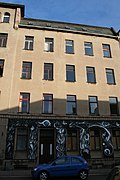
|
|
Meta boxwood born Abraham (1883–1944) Meta boxwood born Abraham came from Schenklengsfeld . She and her husband Max had to give up their shared apartment on Landsberger Straße and move to Königsstraße 18. On September 19, 1942, they were deported to the Theresienstadt ghetto and on October 9, 1944 to the Auschwitz-Birkenau concentration camp, where they perished. |
This is where META BUCHSBAUM, born in 1883 , lived . Deported 1942 Theresienstadt. 1944 Auschwitz murdered |
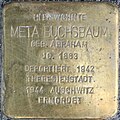
|
|||
| Laurentiusstrasse 9 |
Apr 4, 2006 |
Emilie Bilski b. Calvary (1873-1943) Emilie born Calvary was from Poznan and worked as a rendant . In Poznan she married the merchant Berthold Bilski. Her daughter Rose died at the age of 13. Her son Friedrich worked as a doctor in Munich and emigrated to Palestine with his family in 1939. Emilie Bilski's second son Theodor also worked as a doctor in Halle. He emigrated to the United States with his family in 1939. Emilie Bilski had to give up her apartment on Laurentiusstraße and move to a supposed old people's home at Boelckestraße 24 (today Dessauer Straße). On February 27, 1943, she was deported to the Theresienstadt ghetto, where she died on September 1, 1943. |
EMILIE BILSKY nee lived here . Calvary born in 1873 deported to Theresienstadt in 1943, dead June 1st , 1943 |

|

|
| Leipziger Strasse 4 |
May 6, 2004 or May 25/26 Oct. 2004 |
Helena Wenzymer (1925-1940) Helena Wenzymer was the daughter of Salomon and Sofia Wenzymer. As part of the “Poland Action”, she was driven across the Polish border with her mother and brother Siegfried on October 29, 1938. The family settled in Mlawa, where Helena Wenzymer died in 1940. The four stones originally laid in Leipziger Strasse on May 6, 2004, were removed by strangers shortly after they were laid. In October 2004 they were replaced by new stones. |
HELENA WENZYMER, born in 1925 , lived here, expelled 1938 Poland dead 1940 in Mlawa |

|

|
|
Rosa Wenzymer (1919–1942) Rosa Wenzymer was the daughter of Salomon and Sofia Wenzymer. As part of the “Poland Action”, her mother and siblings were driven across the Polish border on October 29, 1938. Rosa Wenzymer was not staying with her family at the time and had to travel later. The family settled in Mlawa, where Rosa Wenzymer died in 1942. The four stones originally laid in Leipziger Strasse on May 6, 2004, were removed by strangers shortly after they were laid. In October 2004 they were replaced by new stones. |
ROSA WENZYMER, born in 1919 , lived here, expelled 1938 Poland dead in 1942 in Mlawa |
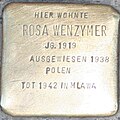
|
|||
|
Siegfried Wenzymer (1935–1943) Siegfried Wenzymer was the son of Salomon and Sofia Wenzymer. As part of the “Poland Action”, he was driven across the Polish border with his mother and sister Helena on October 29, 1938. The family settled in Mlawa, where Siegfried Wenzymer died in 1943. The four stones originally laid in Leipziger Strasse on May 6, 2004, were removed by strangers shortly after they were laid. In October 2004 they were replaced by new stones. |
SIEGFRIED WENZYMER, born in 1935 , lived here, expelled 1938 Poland dead in 1943 in Mlawa |

|
|||
|
Sofia Wenzymer b. Novogrocka (1895-1941) Sofia Novogrocka came from Mława . In Halle she married Salomon Wenzymer, who initially worked in a machine factory and later went into business for himself. The three children Rosa, Siegfried and Helena emerged from the marriage. In 1937 Salomon Wenzymer emigrated to Argentina and prepared for his family to travel to Argentina. As part of the “Poland Action”, Sofia, Siegfried and Helena Wenzymer were driven across the Polish border on October 29, 1938. Sofia Wencymer settled with her children in Mlawa, where she died in 1941. The four stones originally laid in Leipziger Strasse on May 6, 2004, were removed by strangers shortly after they were laid. In October 2004 they were replaced by new stones. |
SOFIA WENZYMER nee lived here . Novogrocka Jg. ???? expelled in 1938 Poland dead in Mlawa in 1941 |
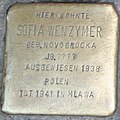
|
|||
| Lessingstrasse 31 |
May 17, 2008 |
Lina Grossmann (1868–1942) Lina Großmann came from Beuthen . In Halle she rented rooms to students. On April 19, 1941, she had to move to the “old people's home” on Boelckestrasse 24 (today Dessauer Strasse). On September 19, 1942, she was deported to Theresienstadt, where she died on November 16, 1942. Her sister and her children managed to escape to Australia, Argentina and the United States. |
LINA GROSSMANN, born in 1868 , lived here, deported to Theresienstadt in 1942, dead on November 16 , 1942 |
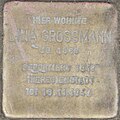
|
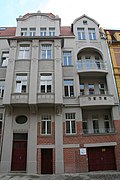
|
| Ludwig-Wucherer-Strasse 11 |
Oct 15, 2011 |
Hermann Lewit (1900–1939) The clockmaker Hermann Lewitt from Krakow came to Halle via Berlin, Falkenberg and Herzberg. Between 1935 and 1936 he was in “protective custody” in Falkenberg and was ordered to leave Germany. However, he was unable to comply with this for health reasons. After moving to Halle, he was arrested again on December 8, 1937. In July 1938 he was transferred to Buchenwald concentration camp, where he died on November 19, 1939. |
HERMAN LEWIT, born in 1900 , lived here, arrested December 8, 1937 Buchenwald dead November 19, 1939 |
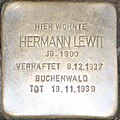
|

|
| Ludwig-Wucherer-Strasse 24 |
Oct 15, 2011 |
Hertha Rosenthal (1891-1942) Hertha Rosenthal was born in Halle and worked as an office clerk . She shared an apartment with her sister Erna and her brother Adolf. Erna Rosenthal emigrated to England in 1939. Hertha Rosenthal later had to move into a "Judenhaus" at Hindenburgstrasse 34 (today Magdeburger Strasse 7). She was deported on June 1, 1942 and murdered two days later in the Sobibor extermination camp. Her brother's fate is unknown. |
HERTHA ROSENTHAL, born in 1891 , lived here, deported June 1, 1942 to Sobibor, June 3, 1942 |

|

|
| Ludwig-Wucherer-Strasse 28 |
Oct 15, 2011 |
Rosa Salomon born Baruch (1900-1942) Rosa Baruch came from Schönsee . In Halle she married Kurt Salomon. In 1932 their daughter Hannelore was born. Rosa Salomon worked as a domestic worker for the cattle dealer Moritz Schloss (see Rudolf-Ernst-Weise-Straße 20). She also found accommodation with him after she had to give up her apartment on Ludwig-Wucherer-Strasse. She was deported on June 1, 1942 and murdered two days later in the Sobibor extermination camp. The fate of her husband and daughter is unknown. |
ROSA SALOMON nee lived here . Baruch born in 1900 deported June 1, 1942 Sobibor murdered June 3, 1942 |

|
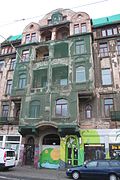
|
| Ludwig-Wucherer-Strasse 45 |
Oct 15, 2011 |
Jakob Rautenberg (1880–1942) Jakob Rautenberg was born in Lautenburg. In Halle, he and his wife Kate ran a tie factory and a men's clothing store. Their daughter Gerda was born in 1920, their son Siegfried in 1922. After the Reichspogromnacht Jakob Rautenberg was interned in the Sachsenhausen concentration camp until December 16, 1938. In 1939 the Rautenbergs were able to send their children to England. They had to give up their apartment on Ludwig-Wucherer-Strasse and move to a “Judenhaus” at Hindenburgstrasse 34 (today Magdeburger Strasse 7). Jakob and Käte Rautenberg were deported on June 1, 1942 and murdered two days later in the Sobibor extermination camp. Jacob's sister Adele and her husband Caesar Salomon were among the deportees (see Harz 18). |
JAKOB RAUTENBERG, born in 1880 , lived here, deported on June 1, 1942, Sobibor murdered on June 3, 1942 |

|

|
|
Käte Rautenberg b. Jacobsohn (1890-1942) Kate born Jacobsohn came from Schwetz . With her husband she ran a tie factory and a men's clothing store. The couple had to give up their apartment on Ludwig-Wucherer-Strasse and move to a “Jewish house” at Hindenburgstrasse 34 (today Magdeburger Strasse 7). Jakob and Käte Rautenberg were deported on June 1, 1942 and murdered two days later in the Sobibor extermination camp. |
KÄTE RAUTENBERG nee lived here . Jacobsohn born 1890 deported June 1st, 1942 Sobibor murdered June 3rd, 1942 |

|
|||
| Magdeburger Strasse 24 |
Nov 17, 2016 | SEVEN CHILDREN BORN HERE Halle gynecological clinic deported / murdered gypsy camp Auschwitz-Birkenau |
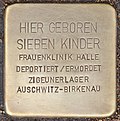
|

|
|
|
Josef Bello (1940–1943) |
JOSEF BELLO born November 7, 1940 murdered April 5, 1943 |
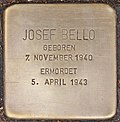
|
|||
|
Karl Bello (1942–1943) |
KARL BELLO born July 9, 1942 murdered May 1, 1943 |
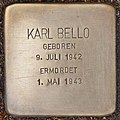
|
|||
|
Mala Bello (1941-1943) |
MALA BELLO born January 24, 1942 murdered July 29, 1943 |

|
|||
|
Reinhold Bello (1941–1943) |
REINHOLD BELLO born March 3, 1941 murdered April 4, 1943 |
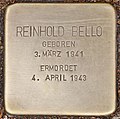
|
|||
|
Marianne Geisler (1940–1943) |
MARIANNE GEISLER born April 23, 1940 murdered April 24, 1943 |
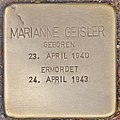
|
|||
|
Johannes Lauenburger (1941–1943) |
JOHANNES LAUENBURGER born March 18, 1941 murdered April 18, 1943 |

|
|||
|
Franz Petermann (1941–1943) A stumbling block was also laid in front of Neumarktstrasse 3 for Franz Petermann. |
FRANZ PETERMANN born March 13, 1941 murdered May 7, 1943 |

|
|||
| Magdeburger Strasse 28 (formerly Hindenburgstrasse 13a) |
Oct 29, 2010 |
Eva Martha Oppenheim (1921–1942) Eva Martha Oppenheim was the daughter of Georg and Frieda Oppenheim. She made plans to emigrate and did an internship in a Jewish children's home in Leipzig. Later she worked as an employee in a supposed Jewish old people's home at Boelckestrasse 24 (today Dessauer Strasse). The Oppenheims were deported on June 1, 1942 and murdered two days later in the Sobibor extermination camp. |
EVA MARTHA OPPENHEIM, born in 1921 , lived here, deported in 1942, Sobibor murdered on June 3 , 1942 |
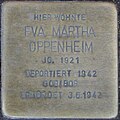
|

|
|
Frieda Oppenheim b. Cahn (1883-1942) Frieda born Cahn came from Halle and married Georg Oppenheim in 1907. In 1911 and 1921 the daughters Ilse and Eva Martha were born. The house of the Oppenheims was declared a "Jewish house". They had to take in the Weiss couple (see Puschkinstrasse 30) and three other people. Together with the Weiss couple, they later found accommodation in the villa of the doctor Josef Schloß at Königstrasse 62 (today Rudolf-Ernst-Weise-Strasse 20). The Oppenheims were deported on June 1, 1942 and murdered two days later in the Sobibor extermination camp. |
Here lived FRIEDA Oppenheim born Cahn born in 1883 deported 1942 Sobibor murdered June 3 , 1942 |

|
|||
|
Georg Oppenheim (1878–1942) Georg Oppenheim came from Stettin . In Halle he first ran a cloth shop, later a shop for men's fabrics. After the Reichspogromnacht he was interned in Sachsenhausen concentration camp until December 20, 1938. The Oppenheims were deported on June 1, 1942 and murdered two days later in the Sobibor extermination camp. Georg's brother Eduard and his wife Erna were among the deportees (see Kohlschütterstrasse 6). |
GEORG OPPENHEIM, born in 1878 , lived here, deported in 1942, Sobibor murdered on June 3 , 1942 |

|
|||
|
Ilse Oppenheim (1911–1942) Ilse Oppenheim was the daughter of Georg and Frieda Oppenheim. The Oppenheims were deported on June 1, 1942 and murdered two days later in the Sobibor extermination camp. |
ILSE OPPENHEIM, born in 1911 , lived here, deported in 1942, Sobibor murdered on June 3 , 1942 |

|
|||
| Magdeburger Strasse 30 (formerly Hindenburgstrasse 13) |
Oct 29, 2010 |
Paul (Pinchas) Holzmann (1879–1942) Paul Holzmann was born in Nicolai (Upper Silesia). In Halle he worked as an outpatient trader . He was married to Lea (Leonore) geb. Green tree. The couple had a daughter named Margot. After the Reichspogromnacht, Paul Holzmann was interned in Sachsenhausen concentration camp until December 20, 1938. His daughter emigrated to England. Lea Holzmann died in 1941. Paul Holzmann had to leave his apartment on Hindenburgstrasse and move to the Judenhaus Harz 48. He was deported on June 1, 1942 and murdered two days later in the Sobibor extermination camp. |
PAUL HOLZMANN, born in 1879 , lived here . Arrested 1938 Sachsenhausen deported 1942 Sobibor murdered June 3 , 1942 |
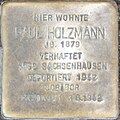
|

|
| Magdeburger Strasse 35 (formerly Hindenburgstrasse 48) |
Nov 10, 2015 |
Julius Sommerich (1878–1942) Julius Sommerich was born in Ottensoos and worked as a sales representative. His first marriage was to Helene geb. Ehrmann. In 1917 their daughter Liesa was born. After the Reichspogromnacht, Julius Sommerich was temporarily interned in Sachsenhausen concentration camp until December 16, 1938. Helene Sommerich died in October 1939. Julius Sommerich had to give up his apartment at Hindenburgstrasse 48 and move to a “Jewish house” at Hindenburgstrasse 34 (today Magdeburger Strasse 7). There he married Edith Therese Frenkel shortly before the deportation (see Blumenstrasse 6). Julius Sommerich was deported with her on June 1, 1942 and murdered two days later in the Sobibor extermination camp. His daughter from his first marriage and her husband managed to escape from Germany. |
JULIUS SOMMERICH, born in 1878 , lived here, deported June 1, 1942, Sobibor murdered June 3, 1942 |

|

|
| Martinstrasse 25 |
26 Sep 2013 |
Else Wolffberg (1888-1942) Else Wolffberg was born in Köslin as the daughter of Leopold and Olga Wolffberg. The family later moved to Halle. Else Wolffberg remained unmarried and last lived alone with her mother on Martinstrasse. When they had to leave the apartment, she moved to Talamtstrasse 6. On June 1, 1942, Else Wolffberg was deported and murdered two days later in the Sobibor extermination camp. |
ELSE WOLFFBERG, born in 1888 , lived here, deported in 1942, Sobibor murdered on June 3 , 1942 |

|
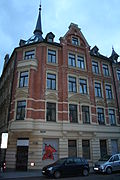
|
|
Olga Wolffberg b. Sabatzky (1864-1943) Olga Sabatzky came from Köslin. There she married the merchant Leopold Wolffberg. The two daughters Else and Cäcilie were born in Köslin. The family later moved to Halle. Leopold Wolffberg died there in 1922. Cäcilie Wolffberg died in April 1938. Olga Wolffberg and her daughter Else had to give up their shared apartment on Martinstrasse and move into different accommodations. Olga Wolffberg initially lived in the "Judenhaus" at Am Steintor 18, and from April 1, 1941 in what was believed to be an old people's home at Boelckestrasse 24 (today Dessauer Strasse). On September 20, 1942, she was taken to the Theresienstadt ghetto, where she died on January 19, 1943. |
OLGA WOLFFBERG nee lived here . Sabatzky born in 1864 deported to Theresienstadt in 1942, dead 19.1.1943 |

|
|||
| Maybachstrasse 2 |
Oct 29, 2010 |
Elise (Elisabeth) Ney b. Gassenheimer (1876–1942) Elise born Gassenheimer came from Themar . She ran an agricultural machinery business and lived as a widow on Maybachstrasse. Her son Hans was interned in Buchenwald concentration camp in April 1938. After his release he emigrated from Germany. On June 26, 1942, Elise Ney had to move into a supposed old people's home at Boelckestrasse 24 (today Dessauer Strasse). On September 19, 1942, she was deported to Theresienstadt, where she died on October 6, 1942. |
ELSE NEY nee lived here . Gassenheimer born in 1876 deported to Theresienstadt in 1942, dead October 6 , 1942 |

|

|
| Meckelstrasse 4 |
Dec 14, 2007 |
Alfred Löwe (1869–1940) Alfred Löwe was born in Magdeburg and worked as a sales representative. In Magdeburg he married Henriette geb. Experience. It was here that their first daughter, Emmy, was born. The family later moved to Halle. The other children Rosa, Margarethe, Hans and Elsa were born here. After the National Socialists came to power, Alfred Löwe suffered a depressive illness. On April 15, 1939, he was admitted as a patient to the Altscherbitz State Hospital against his will. On November 28, 1940 he was taken to the Brandenburg killing center as part of Operation T4 and murdered on the same day. To cover up the killing, official documents cited December 11 as the date of death and pneumonia as the cause. |
Here lived ALFRED LION Jg. 1869 from Landesheilanstalt Altscherbitz on 28.11.1940 by 'sanatorium' Bernburg murdered 11/28/1940 |

|

|
| Mittelstrasse 11-13 |
May 6, 2004 |
Wilhelm Goldmann (1891–1941) Wilhelm Goldmann was born in Loslau . He was married to Frieda geb. Honor. With her he had a son named Joachim. Wilhelm Goldmann owned a piano shop in Halle and also worked as a piano tuner. On June 14, 1936, he was sent to the Buchenwald concentration camp as part of the “Arbeitsscheu Reich” campaign. On July 15, 1941, he was transferred to the Pirna-Sonnenstein killing center and murdered on the same day. In the official documents, his death was dated July 24th in Buchenwald. |
Here lived WILHELM GOLDMANN Jg. 1891 deported in 1938 Buchwald murdered in July 1941 hospital Pirna-Sonnenstein |

|
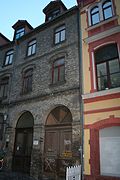
|
| Mühlweg 36 |
Aug 24, 2009 |
Yedidia Geminder (1891-1942) Yedidia Geminder came from Mielec and ran a textile shop in Halle. His wife Helene geb. Gänger came from Leipzig. The couple had two daughters: Lore (* 1923) and Irene (1930–2019). In 1937 or 1938 the family took in Helene's niece Frieda Riesel. As part of the “ Poland Action ”, the Geminders were driven across the Polish border on October 29, 1938. The family then moved to Mielec. They were deported on March 9, 1942. They reached the Debica ghetto via several intermediate stops . In October 1942 the ghetto was cleared and its inmates shot or deported. The Geminders initially survived in hiding. Yedidia Geminder tried to sneak into a labor camp but was betrayed and shot by the SS. Irene Geminder managed to return to Mielec, where she hid in a chicken coop with former neighbors until the Red Army marched in. She later emigrated to Jerusalem and is now professor emeritus for East Asian Studies. Helene and Lore Geminder were deported to the Plaszow concentration camp . Thanks to the inclusion of their names on Oskar Schindler's list , they survived the war and later emigrated to the United States. |
YEDIDIA GEMINDER, born in 1891 , lived here . Expelled October 27 , 1938 to Poland. Shot dead October 1942 Cyranka - Berdechow forced labor camp |
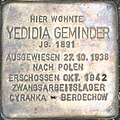
|

|
|
Frieda Riesel (1920-1942) Frieda Riesel was born as the daughter of Helene Geminder's sister Klara. Gänger and her husband Samuel Riesel were born in Leipzig. Her father died very early. After her mother died in 1937 or 1938, she and her siblings Heinz (see Große Märkerstraße 13) and Senta (see Geiststraße 15) had to move to relatives in Halle. Frieda stayed with her aunt Helene. As part of the “ Poland Action ”, the Geminders were driven across the Polish border on October 29, 1938, together with Frieda Riesel, her siblings and Heinz's foster family Lipper (see Große Märkerstraße 13). Frieda Riesel stayed with the Geminder family, who moved to Mielec. They were deported on March 9, 1942. They reached the Debica ghetto via several intermediate stops . In October 1942 the ghetto was cleared and its inmates shot or deported. The Geminders initially survived in hiding. Frieda Riesel worked outside of the ghetto in a German office, but this also meant that she was unable to avoid deportation. She was taken to Auschwitz-Birkenau concentration camp, where we found death. |
FRIEDA RIESEL, born in 1920 , lived here, expelled October 27, 1938 to Poland, murdered in Auschwitz in 1942 |

|
|||
| Mühlweg 55 (formerly Am Kirchtor 14) |
Nov 3, 2012 |
Rosa Cohn (1870-1943) Rosa Cohn was born in Halle to Jewish parents, but converted to the Protestant faith. She worked as the deputy school principal. On September 10, 1941, Rosa Cohn had to move to a supposed old people's home at Boelckestrasse 24 (today Dessauer Strasse) because of her Jewish descent. On June 18, 1943, she was deported to Theresienstadt, where she died on August 14, 1943. |
ROSA COHN, born in 1870 , lived here, deported to Theresienstadt in 1943, dead on August 14 , 1943 |

|

|
|
Adolf Friedländer (1877–1943) Adolf Friedländer was a native of Halle. He worked as a businessman. In the course of the Reichspogromnacht he was temporarily interned in a concentration camp, where he lost an eye. In March 1939 he emigrated to Shanghai, where he died on December 24, 1943. |
Here lived ADOLF FRIEDLÄNDER Jg. 1877 Escape 1939 Shanghai dead 12.24.1943 |

|
|||
| Neumarktstrasse 3 (formerly 6) |
Nov 17, 2016 |
Franz Hugo (1920–1944) |
FRANZ HUGO born in 1920 lived here, deported 1943 Gypsy camp Auschwitz-Birkenau murdered February 15, 1944 |

|
overbuilt |
|
Josef Kessler (1915–1943) |
JOSEF KESSLER, born in 1915 , lived here . Deported 1943 Gypsy camp Auschwitz-Birkenau murdered December 27, 1943 |

|
|||
|
Rosita Kessler (1943–1943) |
ROSITA KESSLER, born in 1942 , lived here, deported 1943 Gypsy camp Auschwitz-Birkenau murdered July 1st, 1943 |
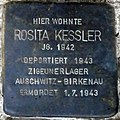
|
|||
|
Therese Kessler (1911–2002) |
THERESE KESSLER nee lived here . Jochum born in 1913 deported. 1943 Gypsy camp Auschwitz-Birkenau liberated |
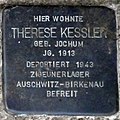
|
|||
|
Franz Petermann (1941–1943) A stumbling block was laid for Franz Petermann in front of Magdeburger Straße 24. |
FRANZ PETERMANN, born in 1941 , lived here, deported 1943 Gypsy camp Auschwitz-Birkenau murdered May 7, 1943 |

|
|||
|
Helga Petermann (1942–1943) |
HELGA PETERMANN, born in 1942 , lived here, deported 1943 Gypsy camp Auschwitz-Birkenau murdered April 13, 1943 |

|
|||
|
Maria Petermann (1923–1944) |
MARIA PETERMANN, born in 1923 , lived here . Deported 1943 Gypsy camp Auschwitz-Birkenau murdered 9.2.1944 |

|
|||
| Paul-Suhr-Strasse 106 |
Apr 4, 2006 |
Ernst Stößel (1882–1945) Ernst Stößel was a member of the Jehovah's Witnesses religious community. Because of his religious affiliation, he was convicted with 22 co-religionists in May 1937 and had to serve a three-year prison sentence. After serving them, he was deported to the Neuengamme concentration camp, where he was held until it was evacuated. Together with 2,800 fellow prisoners, he was transferred to the cargo ship Thielbek . He drowned when the ship was sunk by British fighter bombers in the Bay of Lübeck on May 3, 1945 . |
Here lived ERNST TAPPET Witness Vol. 1882 arrested 1,937 Neuengamme MS Thielbeck sunk drowned 03/05/1945 |

|

|
| Puschkinstrasse 30 (formerly Albrechtstrasse) |
Oct 29, 2010 |
Charlotte Weiss born Hirsch (1891–1942) Charlotte Weiss born Hirsch came from Halle. The Weiss couple had to give up their apartment on Albrechtstrasse and first move into a “Jewish house” at Forsterstrasse 13. Later, however, they found accommodation in the villa of the doctor Josef Schloß at Königstrasse 62 (today Rudolf-Ernst-Weise-Strasse 20). Theodor and Charlotte Weiß were deported on June 1, 1942 and murdered two days later in the Sobibor extermination camp. |
CHARLOTTE WEISS nee lived here . Hirsch born in 1891 deported 1942 Sobibor murdered June 3 , 1942 |

|
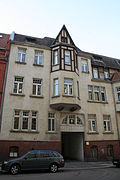
|
|
Theodor Weiß (1876–1942) Theodor Weiß was born in Halle. He worked as a pharmacist and was a partner in the “S. White". After the Reichspogromnacht he was temporarily interned in Sachsenhausen concentration camp until November 23, 1938. The Weiss couple had to give up their apartment on Albrechtstrasse and first move into a “Jewish house” at Forsterstrasse 13. Later, however, they found accommodation in the villa of the doctor Josef Schloß at Königstrasse 62 (today Rudolf-Ernst-Weise-Strasse 20). Theodor and Charlotte Weiß were deported on June 1, 1942 and murdered two days later in the Sobibor extermination camp. |
THEODOR WEISS, born in 1876 , lived here, deported in 1942, Sobibor murdered on June 3 , 1942 |

|
|||
| Rannische Strasse 1 |
May 17, 2008 |
Edith Schwab (1928–1943) |
EDITH SCHWAB, born in 1928, lived here . Escape Belgium interned Mechelen deported 1943 Auschwitz 18.1.1943 |

|

|
|
Fritz Schwab (1890–1943) Fritz Schwab was born as the son of a businessman in Berkach and served as an officer in the First World War. In Halle he married Zlata Lotte Slakowska on February 6, 1929. He had three daughters with her. In 1938/39 Fritz Schwab and his daughter Edith emigrated illegally to Belgium via Prague and Switzerland . After the German invasion, they were interned in the SS assembly camp in Mechelen. Fritz and Edith Schwab were deported to Auschwitz-Birkenau concentration camp on January 15, 1943, and murdered there three days later. |
FRITZ SCHWAB, born in 1890, lived here . Escape Belgium interned Mechelen deported 1943 Auschwitz 18.1.1943 |

|
|||
|
Liliane Schwab (1929–1943) Liliane Schwab was the daughter of Fritz and Zlata Lotte Schwab. In February 1939 she, her mother and her sister Margit left Germany. Via France and the Netherlands , she reached Belgium, where Fritz and Edith Schwab had fled before. After the German invasion, the family was interned in the SS assembly camp in Mechelen. Zlata Lotte, Margit and Liliane Schwab were deported to Auschwitz on April 19, 1943 and murdered three days later. |
LILIANE SCHWAB, born in 1929, lived here . Fled Belgium interned Mechelen deported 1943 Auschwitz April 21 , 1943 |

|
|||
|
Margit Schwab (1927–1943) Margit Schwab was the daughter of Fritz and Zlata Lotte Schwab. In February 1939 she, her mother and her sister Liliane left Germany. Via France and the Netherlands , she reached Belgium, where Fritz and Edith Schwab had fled before. After the German invasion, the family was interned in the SS assembly camp in Mechelen. Zlata Lotte, Margit and Liliane Schwab were deported to Auschwitz on April 19, 1943 and murdered three days later. |
MARGIT SCHWAB, born in 1927, lived here . Fled Belgium interned Mechelen deported 1943 Auschwitz April 21 , 1943 |
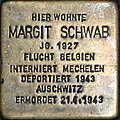
|
|||
|
Zlata Lotte Schwab b. Slakowska (1904-1943) Zlata Lotte Schwab b. Slakowska came from Lodz. In February 1939 she and her two daughters Margit and Liliane left Germany. She came to Belgium via France and the Netherlands , where her husband Fritz and her third daughter Edith Schwab had previously fled. After the German invasion, the family was interned in the SS assembly camp in Mechelen. Zlata Lotte, Margit and Liliane Schwab were deported to Auschwitz on April 19, 1943 and murdered three days later. |
ZLATA LOTTE SCHWAB nee lived here . Slakowska born in 1904, escaped Belgium interned Mechelen deported 1943 Auschwitz April 21 , 1943 |

|
|||
| Rannische Strasse 3 |
25./26. Oct. 2004 |
Gustav-Rudolf Alexander (1905–1942) Harry, Gustav-Rudolf and Ruth-Elli Alexander were born in Halle as children of Max Alexander and his non-Jewish wife Elise nee. Tennert was born. They had three other siblings: Helene, Felix and Max. Their mother died in 1943. Gustav-Rudolf worked as a clerk. Because of his relationship with a non-Jew, he was imprisoned in Halle from January 1940. On July 4, 1942, he was transferred to Sachsenhausen concentration camp, where he officially died of pneumonia on October 7, 1942. His father Max Alexander was deported to the Theresienstadt ghetto in 1943 and survived his imprisonment. His three other children also survived the war. |
Here lived GUSTAV-RUDOLF ALEXANDER Jg. 1905 dead 07.10.1942 in Sachsenhausen |
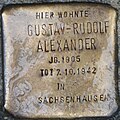
|

|
|
Harry Alexander (1903-1942) Harry Alexander worked as a glazier. On June 14, 1938, he was arrested as part of the Arbeitsscheu Reich campaign and sent to the Buchenwald concentration camp. On March 14, 1942, he was transferred to the Bernburg killing center as part of Aktion 14f13 and murdered on the same day. In the official documents, his death was dated March 25th in Buchenwald. |
HARRY ALEXANDER born in 1903 lived here, Bernburg sanatorium, murdered March 1942 Buchenwald T4 campaign |

|
|||
|
Ruth-Elli Alexander (1918–?) Ruth-Elli Alexander worked as an office clerk for the lawyer Adolf Goldberg (see Hansering 17). She was arrested in 1942 for not wearing a Jewish star. Her further fate is unclear. She is said to have been deported to Auschwitz-Birkenau concentration camp in September 1942. Your name is missing from the documents received there. On the other hand, a nephew claims to have seen her in prison in Halle in November 1942. |
RUTH-ELLI ALEXANDER born in 1918 lived here, deported in 1942 ? ? ? |

|
|||
| Rathausstrasse 8 |
Nov 10, 2015 |
Isaac Salkin (1866-1942) Isaac Salkin was born in Halle. Together with his wife Taube, he emigrated to Shanghai on April 25, 1939, where he died on August 27, 1942. |
ISAAC SALKIN, born in 1866, lived here . Escape 1939 Shanghai, dead August 27, 1942 |

|

|
|
Taube Salkin born ? (1883–1942) Taube Salkin emigrated to Shanghai with her husband Isaac on April 25, 1939. There she died on December 3, 1942, a good three months after her husband. |
Here lived PIGEON Salkin Jg. 1883 Escape 1939 Shanghai dead 03.12.1942 |
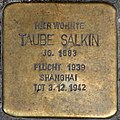
|
|||
|
Rathenauplatz 3 (formerly Kaiserplatz) |
Apr 4, 2006 |
Gerhard Müller (1920–1942) Gerhard Müller was born in Halle as the son of Waldemar Müller and Henny Müller. Rosenberg born. He fled to Switzerland in 1937 and later moved to a cousin in Italy . However, he could not stay there permanently and returned to Switzerland, where he only received a limited residence permit. After learning of his mother's deportation, he committed suicide. |
Here lived GERHARD MÜLLER Jg. 1920 Escape / Switzerland escape into death |
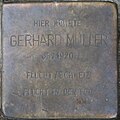
|

|
|
Henny Müller born Rosenberg (1884–1942) Henny Müller born Rosenberg came from Witten . Her husband Waldemar Müller owned a factory in which he produced leather linings for luxury shoes. He died in 1937. The marriage had two children: the daughter Lieselotte, who was able to flee to England in 1939, and the son Gerhard. Henny Müller had to give up her apartment on Kaiserplatz and move into a "Judenhaus" in Hindenburgstrasse 63 (today overbuilt). She was deported on June 1, 1942 and murdered two days later in the Sobibor extermination camp. Her brother-in-law Albert Müller and his wife were among the deportees (see Albert-Schweitzer-Strasse 54). |
HENNY MÜLLER nee lived here . Rosenberg born in 1884 deported 1942 Sobibor concentration camp murdered June 3, 1942 |

|
|||
| Rathenauplatz 14 (formerly Kaiserplatz) |
Dec 12, 2006 |
Max Fleischmann (1872-1943) Max Fleischmann came from Breslau, where he studied law and political science as well as modern history between 1891 and 1984. In 1896 he received his doctorate in Halle. From 1900 he worked as an assistant judge at the regional court in Halle. In 1902 his habilitation followed. In 1908 he was appointed professor and taught colonial law. In 1910 he moved to the University of Königsberg . During the First World War, in addition to teaching, he also worked as a public prosecutor. In 1921 he returned to Halle and between 1925 and 1926 he was the rector of the university. After the National Socialists came to power, he was prematurely retired in 1935 . The final revocation of the teaching permit followed in 1936. In 1941 he moved to Berlin, where he made contact with later members of the military resistance . Since he refused to wear the Jewish star, he was supposed to be arrested on January 14, 1943. He evaded arrest by suicide. |
DR. MAX FLEISCHMANN, born in 1872, lived here, fleeing to death before deportation on January 14, 1943 |

|
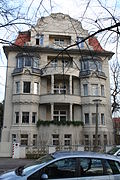
|
| Reichardtstrasse 6 |
26 Sep 2013 |
Max Freund (1866–1943) Max Freund, from Biskupitz, was a co-owner of the wool goods wholesaler Freund & Müller in Leipziger Strasse in Halle. At times he was a member of the board of the Jewish community in Halle. He owned his own house on Reichardtstrasse, but was forced to sell it in 1938. He then lived first as a subtenant at Lindenstrasse 89b, later in a "Judenhaus" at Forsterstrasse 13. On September 19, 1942, Freund was deported to the Theresienstadt ghetto, where he died on January 23, 1943. |
MAX FREUND, born in 1866 , lived here, deported to Theresienstadt in 1942, dead January 23, 1943 |
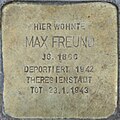
|

|
| Richard-Wagner-Strasse 11 |
Apr 4, 2006 |
Bertha Bacher (1863-1943) Bertha Bacher was born in Magdeburg. Her parents ran the “Sporthaus Julius Bacher” in Halle. After her mother's death in 1930, Bertha Bacher lived alone in the apartment on Richard Wagner-Strasse. On May 26, 1941, she had to move to a supposed old people's home at Boelckestrasse 24 (today Dessauer Strasse). On September 19, 1942, she was deported to Theresienstadt, where she died on January 12, 1943. Your niece Liselotte Wartenberg geb. Bacher (see Schleiermacherstrasse 13) died in Auschwitz. |
This is where BERTHA BACHER, born in 1863, lived, deported to Theresienstadt in 1942, dead January 12, 1943 |
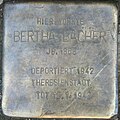
|

|
|
Riebeckplatz 4 (formerly Merseburger Strasse 166) |
Jun 9, 2005 |
Selma (Jenny) Appel b. Schwab (1888-1942) Selma Appel born Schwab was born in Berkach (Thuringia) and initially lived with her parents and her brother Julius at Merseburger Strasse 166. Most recently, she lived in a "Judenhaus" at Hindenburgstrasse 34 (today Magdeburger Strasse 7). She was deported on June 1, 1942 and murdered two days later in the Sobibor extermination camp. |
SELMA APPEL born here lived here . Schwab born in 1888 deported May 30, 1942 Sobibor murdered June 3, 1942 |

|
overbuilt |
|
Julius Schwab (1890-1942) Julius Schwab came from Berkach (Thuringia). In Halle he ran a cattle and horse trade. In 1930 he married Margarete Pauline geb. Günther, who converted to Judaism before the wedding. The couple had two sons named Günther and Max . After the National Socialists came to power, Julius Schwab ran into increasing financial difficulties with his business. He was arrested during the Reichspogromnacht and interned in Buchenwald concentration camp. He was released on December 26, but had to leave Germany within a month. After he did not get a visa for the United States, he emigrated to the Netherlands on January 28, 1939. In Amsterdam he worked as a house servant. After the German occupation of the Netherlands, he was arrested on September 4, 1942 and taken to Westerbork transit camp . From here he was deported to the Auschwitz-Birkenau concentration camp, where he was murdered on November 17, 1942. His wife and two sons survived the war in Halle. |
JULIUS SCHWAB, born in 1890, lived here in 1938 Buchenwald concentration camp, murdered September 17, 1942 Auschwitz |

|
|||
| Röderberg 10 |
May 17, 2008 |
Otto Czech (1920–1941) Otto Czech was a patient at the Altscherbitz State Hospital. He was taken to the Bernburg killing center on January 24, 1941, where he was murdered on the same day as part of Operation T4. |
Here lived OTTO CZECH Jg. 1920 from 'Landesheilanstalt' Altscherbitz on 24.01.1941 by 'sanatorium' Bernburg murdered 24/01/1941 |
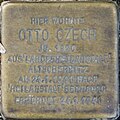
|

|
| Rudolf-Breitscheid-Strasse 14 (formerly Königstrasse) |
Nov 3, 2012 |
Hermann Hellermann (1857–1942) Hermann Hellermann came from Untereisenheim and worked as a sales representative. He and his wife Selma had a son who managed to escape to the United States. When they had to give up their apartment on Königstraße, they first found a place to stay in Josef Schloß's villa at Königstraße 62 (today Rudolf-Ernst-Weise-Straße 20). Hermann Hellermann died there on April 18, 1942. |
HERMANN HELLERMANN, born in 1857 , lived here before the deportation, dead April 18, 1942 |
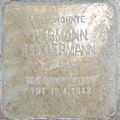
|
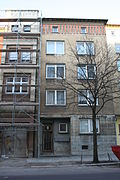
|
|
Selma Hellermann b. Stern (1875–1942) Hermann Hellermann's wife Selma b. Stern came from Kitzingen . When she and her husband had to give up their apartment on Königstrasse, they first found a place to stay in Josef Schloß's villa at Königstrasse 62 (today Rudolf-Ernst-Weise-Strasse 20). On June 26, 1942, the house was cleared and the remaining residents had to move to a supposed old people's home at Boelckestrasse 24 (today Dessauer Strasse). On September 19, 1942, Selma Hellermann was deported to Theresienstadt, where she died on October 9, 1942. |
SELMA HELLERMANN nee lived here . Stern born in 1875 deported to Theresienstadt in 1942, dead October 9 , 1942 |

|
|||
| Rudolf-Ernst-Weise-Strasse 20 (formerly Königstrasse 62) |
Oct 29, 2010 |
Marie Klein born Castle (1877–1944) The villa at Königstrasse 62 was acquired in 1887 by the cattle dealer Moritz Schloss from Oberlauringen . Here he lived with his wife Ellen Elise geb. Wormser and the eight children Simon, Josef, Hugo, Wilhelm, Paula, Marie, Julius and Frieda. Moritz Schloß died in 1907, his wife in 1927. Their son Hugo died of illness in 1918, Julius died in 1918 in World War I. Simon Schloß took over the family business and continued to live in the villa. He died in December 1941. Paula Schloß married the factory owner Josef Schlüchterer. The couple moved to Cologne and had two daughters. Marie Schloss married the doctor Albert Klein and had three sons with him. Frieda married the lawyer Max Lehmann. The couple had a daughter. After the death of Simon Schloß, only Marie Klein, now widowed, and her sisters-in-law Grechte and Emma Schloß lived in the villa. As early as 1939, however, they had also given accommodation to people who had lost their homes. The lawyer Alfred Katz (see Hansering 2) lived with them until May 1941. Other guests included Fanny Aronsohn (see Lafontainestrasse 5), Nathan and Minna Frankenberg (see Feuerbachstrasse 74), Hermann and Selma Hellermann (see Rudolf-Breitscheid-Strasse 14), the Oppenheim family (see Magdeburger Strasse 28), Charlotte and Theodor Weiß (see Puschkinstrasse 20), Otto and Frieda Pollak and Rosa Salomon (see Ludwig-Wucherer-Strasse 28). Hermann Hellermann died on April 18 in the Schloß family villa. Fanny Aronsohn, Rosa Salomon, the Weiss couple and the Oppenheim family were deported on June 1, 1942 and murdered two days later in the Sobibor extermination camp. Marie Klein, Gretchen Schloß and Emma Schloß had to leave the villa together with the couple Frankenberg and Selma Hellermann on June 26, 1942 and move to a supposed old people's home at Boelckestraße 24 (today Dessauer Straße). On September 19, 1942, they were all deported to Theresienstadt. Marie Klein died there on May 31, 1944. Paula Schlüchterer b. Schloß survived the war by emigrating to England. Frieda Lehmann nee Castle survived. She emigrated to Chile . |
MARIE KLEIN nee lived here . Castle born in 1877 deported to Theresienstadt in 1942, dead May 31, 1944 |
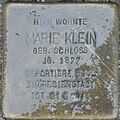
|

|
|
Emma (Eva) Castle born Ambach (1876 – approx. 1943) Simon Schloß took over the family business and continued to live in the villa. He married Emma Ambach, who was born in Kleineibstadt . Simon Schloß died in December 1941. After his death, only Marie Klein, now widowed, and her sisters-in-law Grechte and Emma Schloß lived in the villa. The three women had to leave the villa on June 26, 1942 and move to a supposed old people's home at Boelckestrasse 24 (today Dessauer Strasse). On September 19, 1942, they were all deported to Theresienstadt. Emma Schloß was transported to Auschwitz-Birkenau on December 15, 1943. The exact date of her death is unknown. |
Here lived EVA CASTLE born Ambach born in 1876 deported 1942 Theresienstadt 1943 Auschwitz murdered |
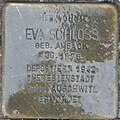
|
|||
|
Gretchen Castle born Wiesengrund (1876–1943) Wilhelm Schloß married Gretchen Wiesengrund from Dettelbach and moved with her to Maybachstrasse 1. The couple had a son named Johannes (Hans), who later entered the family business. Wilhelm Schloß died in 1929, his wife later moved back to the villa on Königstrasse. After the death of Simon Schloß, only Marie Klein, now widowed, and her sisters-in-law Grechte and Emma Schloß lived in the villa. The three women had to leave the villa on June 26, 1942 and move to a supposed old people's home at Boelckestrasse 24 (today Dessauer Strasse). On September 19, 1942, they were all deported to Theresienstadt. Gretchen Schloß died there on January 25, 1943. |
Here lived GRETCHEN SCHLOSS geb. Wiesengrund born in 1876 deported to Theresienstadt in 1942, dead January 25, 1943 |

|
|||
|
Josef Castle (1867–1940) Josef Schloß studied medicine and opened a pediatric practice on Hindenburgstrasse. From 1938 he was no longer allowed to practice as a doctor. In the same year he was temporarily interned in Buchenwald concentration camp. He committed suicide on November 25, 1940. |
Here lived DR. JOSEF CASTLE Jg. 1867 before deportation flight into death 11/25/1940 |
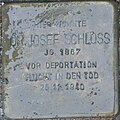
|
|||
| Schleiermacherstraße 13 (formerly Kronprinzenstraße) |
Dec 12, 2006 |
Lieselotte Wartenberg b. Bacher (1906-1942) Lieselotte Bacher was born in Halle. Here she married Werner Wartenberg. The couple had a son named Walter. Werner Wartenberg was a partner in the “Sporthaus Julius Bacher”, which was founded by his wife's grandfather. In 1938 the family was expropriated and moved to Berlin. In 1939 at the latest, Lieselotte Wartenberg emigrated to Paris with her son. After the German occupation, they were arrested and interned in the Pithiviers transit camp. On August 3, 1942, Lieselotte Wartenberg was deported to Auschwitz concentration camp, where she was murdered two days later after her arrival. Lieselotte Wartenberg's aunt Berta Bacher (see Richard-Wagner-Strasse 11) died in Theresienstadt. |
LIESELOTTE WARTENBERG nee lived here . Bacher, born in 1906, escaped in 1940 from France, deported in 1942, murdered in Auschwitz |

|

|
|
Walter Wartenberg (1928–1942) Walter Wartenberg was the son of Werner and Lieselotte Wartenberg. In 1938 the family was expropriated and moved to Berlin. In 1939 at the latest, Lieselotte Wartenberg emigrated to Paris with her son. After the German occupation, they were arrested and interned in the Pithiviers transit camp. On August 7, 1942, Walter Wartenberg was deported to Auschwitz, where he was murdered on August 9. |
WALTER WARTENBERG, born in 1928, lived here . Escape 1940 France deported in 1942, murdered in Auschwitz |

|
|||
| Schlosserstrasse 29 |
Apr 4, 2006 |
Hermann August Wollschläger (1895–1940) Hermann August Wollschläger came from Schulitz and was a member of the religious community of Jehovah's Witnesses. Because of his religious affiliation, he was sentenced in May 1937 with 22 co-religionists and had to serve a prison sentence of two years and three months. He was then interned first in Sachsenhausen concentration camp and later in Neuengamme concentration camp, where he died on March 25, 1940. |
HERMANN AUGUST WOLLSCHLÄGER lived here, Jehovah's Witness, born in 1895, arrested in 1937 Neuengamme concentration camp, murdered on March 25, 1940 |

|

|
| Schwuchtstrasse 6 (formerly 17) |
Oct 25, 2013 |
Arnold Dan Japha (1877-1943) Arnold Japha was born on September 12, 1877 as the son of a wholesale merchant in Königsberg. He had a twin brother named Erich and two other brothers named Georg and Felix . Arnold Japha graduated from high school in Königsberg in 1896 and studied natural sciences and medicine in Freiburg and Königsberg from 1898 to 1900 . In 1901 he passed the medical state examination at the University of Königsberg and received the title of Dr. med. He then served as a one-year military volunteer. In 1906/07 he obtained his doctorate in Königsberg. phil. In the following years he held assistant positions at the zoological institutes in Tübingen and Halle. In 1910 he completed his habilitation in Halle and taught as a private lecturer. In addition, he regularly took part in military exercises and was promoted to medical officer in 1912. During the First World War he served as a staff and battalion doctor and received the Iron Cross 1st and 2nd class for his services. In 1921 he became a city doctor in Halle. In 1923 he was appointed associate professor for anthropology . After the National Socialists came to power in September 1933, he was initially paid off his teaching work, in October he was given leave of absence and finally forced into retirement on May 1, 1935. At the end of 1935 his professorship was revoked. In 1943 he was threatened with admission to a concentration camp, whereupon he committed suicide on May 16, 1943. The laying of the Stolperstein was originally planned for Sep 26. Planned for 2013. However, reassigning the house numbers made further research necessary at short notice and thus a postponement of the date. The relocation was finally made up on October 25th. |
ARNOLD JAPHA, born in 1877 , lived here before the deportation, fleeing to death 16.5.1943 |

|

|
| Seebener Strasse 11 |
May 29, 2007 |
Frieda Hirsch born Loewenthal (1878–1942) Frieda Hirsch born Loewenthal came from Ueckermünde . She and her husband Isidor had to give up the apartment on Seebener Strasse and move to what was believed to be an old people's home at Boelckestrasse 24 (today Dessauer Strasse). Isidor Hirsch died there on May 13, 1942. Frieda Hirsch was deported on June 1, 1942 and murdered two days later in the Sobibor extermination camp. |
FRIEDA HIRSCH nee lived here . Loewenthal born in 1878 deported 1942 Sobibor murdered June 3 , 1942 |
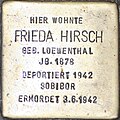
|

|
|
Isidor Hirsch (1870–1942) Isidor Hirsch was born in Briesen . His wife Frieda and his wife had to give up their apartment on Seebener Straße and move to a supposed old people's home at Boelckestraße 24 (today Dessauer Straße). Isidor Hirsch died there on May 13, 1942. |
ISIDOR HIRSCH, born in 1870 , lived here, dead before the deportation , on May 13, 1942 |

|
|||
| Seebener Strasse 177 |
Dec 12, 2006 |
Clara Graf b. Pollak (1871-1942) Clara Graf b. Pollak came from Magdeburg. She and her husband Eduard had four children: Curt, Gertrud, Elly and Irene. After the death of her husband, Clara Graf moved to live with her daughter Irene at Marienstraße 20. On September 19, 1942, she was to be deported to Theresienstadt. She evaded it the day before by suicide. |
CLARA GRAF nee lived here . Pollak, born in 1871, escaped to death before deportation on September 18, 1942 |

|

|
|
Eduard Graf (1868–1938) Eduard Graf came from Halle and was the owner of a specialist bed shop. When he had to give up this in 1938, he committed suicide on December 28, 1938. |
EDUARD GRAF, born in 1868, lived here, fleeing to death after expropriation on December 28, 1938 |

|
|||
|
Irene Schulze born Count (1905–1943) Irene Schulze born Graf was the daughter of Eduard and Clara Graf. She married the economist Fritz Kurt Schulze. Irene Schulze committed suicide on October 7, 1943. Her sister Elly emigrated to Sweden , her brother Curt to Chile. Her second sister Gertrud was deported to Theresienstadt in February 1945. She survived her captivity. |
DR. IRENE SCHULZE nee lived here . Count born in 1905 Escape to death October 7, 1943 |

|
|||
| Sternstrasse 11 |
Jun 9, 2005 |
Amalie Israel b. Kanner (1891 – approx. 1942) Amalie Israel b. Kanner came from Halle. His marriage to Hirsch Israel had two daughters named Betty and Sadie. The couple ran two textile goods stores in Halle. As part of the “Poland Action”, Hirsch and Amalie Israel were driven across the Polish border on October 29, 1938. In Poland, they settled in Hirsch Israel's hometown of Debica. In 1942 their trail is lost. Her two daughters emigrated to Palestine before the war began. On December 16, 2005, the Stolpersteine in Sternstrasse were doused with tar by strangers. |
Here lived AMALIE ISRAEL born Kanner, born in 1891, expelled from Poland on October 28, 1938, dead in 1942 near Debica |
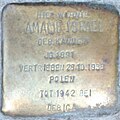
|
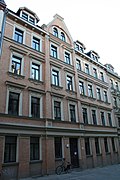
|
|
Hirsch (Hermann) Israel (1885 – ca. 1942) Hirsch Israel came from Debica. He and his wife Amalie ran two textile goods stores in Halle. As part of the “Poland Action”, Hirsch and Amalie Israel were driven across the Polish border on October 29, 1938. In Poland, they settled in Hirsch Israel's hometown. In 1942 their trail is lost. On December 16, 2005, the Stolpersteine in Sternstrasse were doused with tar by strangers. |
HIRSCH ISRAEL, born in 1885 , lived here, expelled October 28, 1938 Poland dead in 1942 near Debica |
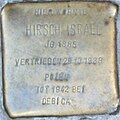
|
|||
|
Gerda Padawer (1927–?) Gerda Padawer, daughter of Shejndel (Jenny) Padawer geb. Geminder and Hermann (Chaim) Padawer, was driven across the Polish border with their parents and sister on October 29, 1938 as part of the “Poland Action”. In Poland, the family settled in Mielec. After the German invasion of Poland, Shejndel Padawer and her daughters were initially taken to a labor camp near Mielec and deported to the Stutthof concentration camp in 1944 , where they later died. On December 16, 2005, the Stolpersteine in Sternstrasse were doused with tar by strangers. |
GERDA PADAWER, born in 1927 , lived here, expelled October 28, 1938, Poland dead in Stutthof |

|
|||
|
Hella Padawer (1920–?) Hella Padawer, daughter of Shejndel (Jenny) Padawer geb. Geminder and Hermann (Chaim) Padawer, was driven across the Polish border with their parents and sister on October 29, 1938 as part of the “Poland Action”. In Poland, the family settled in Mielec. After the German invasion of Poland, Shejndel Padawer and her daughters were initially taken to a labor camp near Mielec and deported to the Stutthof concentration camp in 1944 , where they later died. On December 16, 2005, the Stolpersteine in Sternstrasse were doused with tar by strangers. |
HELLA PADAWER born in 1920 lived here, expelled October 28, 1938 Poland dead in Stutthof |

|
|||
|
Shejndel (Jenny) Padawer b. Minor (approx. 1900–?) Shejndel (Jenny) b. Geminder was born in Mielec. She was married to Hermann (Chaim) Padawer. They had two daughters named Gerda and Hella. The Padawers ran a textile goods business. As part of the “Poland Action”, the family was driven across the Polish border on October 29, 1938. In Poland they settled again in Mielec. After the German invasion of Poland, Shejndel Padawer and her daughters were initially taken to a labor camp near Mielec and deported to the Stutthof concentration camp in 1944 , where they later died. Hermann Padawer survived the war. He later married Helene Geminder, the widow of Shejndel Padawer's brother Yedidia Geminder, who was also murdered (see Mühlweg 36). On December 16, 2005, the Stolpersteine in Sternstrasse were doused with tar by strangers. |
JENNY PADAWER nee lived here . Geminder expelled October 28 , 1938 Poland dead in Stutthof |
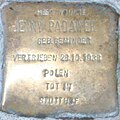
|
|||
| Südstrasse 51 |
Nov 10, 2015 |
Aron (Arno) Plasterek (1868–1944) Aron Plasterek came from Posen. He was married to the non-Jewish Else Plasterek. In 1929 their son Heinz-Arno was born in Halle. The marriage later ended in divorce. Aron Plasterek last lived in Berlin. From there he was deported to the Theresienstadt ghetto on January 10, 1944, where he died on April 18. |
ARON PLASTEREK born in 1863 lived here, deported 1944 Theresienstadt, murdered April 18 , 1944 |

|

|
| Talamtstrasse 6 |
May 6, 2004 |
Hermine Hirschfeld b. Rose (1875-1945) Hermine Hirschfeld b. Rose came from Niederntudorf . She and her husband Jacob René had four sons named Ludwig, Rolf, Fritz and Joachim Wolfgang. Hermine Hirschfeld was deported to Theresienstadt on September 19, 1942, where she died on January 4, 1945. All of the sons managed to escape to Germany. Ludwig Hirschfeld emigrated to Sweden, Rolf Hirschfeld to Bolivia , Fritz Hirschfeld to England and Joachim Wolfgang Hirschfeld to Switzerland. |
HERMINE HIRSCHFELD nee lived here . Rose born in 1875 deported to Theresienstadt in 1942, dead 4.1.1945 |

|
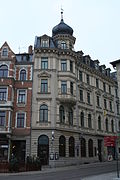
|
|
Jacob René Hirschfeld (1878–1942) René Hirschfeld, who originally came from Berlin, served as a frontline soldier in World War I and worked as a master tailor in Halle. He was first taken to Sachsenhausen concentration camp and later deported to Auschwitz, where he died on November 2, 1942. |
RENÉ HIRSCHFELD, born in 1878 , lived here, deported Sachsenhausen, murdered November 2nd, 1942 Auschwitz |

|
|||
| Turmstrasse 156 |
Nov 10, 2015 |
Elise Cerf (1870-1942) Elise Cerf came from Halle and ran a shop here. She had to give up her apartment in Turmstrasse and move to a supposed old people's home at Boelckestrasse 24 (today Dessauer Strasse). On September 20, 1942, she was deported to the Theresienstadt ghetto, where she died on October 19, 1942. |
ELISE CERF, born in 1870 , lived here, deported September 19, 1942 Theresienstadt, dead October 19, 1942 |

|

|
| Uhlandstrasse 10 |
Dec 12, 2006 |
Sofia Loewenthal b. Meyerfeld (1880-1942) The nurse Sofia Loewenthal geb. Meyerfeld came from Spangenberg and stayed with her sister Rosalie Meyerfeld with Johanna Ziegelroth. The three women later had to leave the apartment on Uhlandstrasse and move to a “Jewish house” at Hindenburgstrasse 34 (today Magdeburger Strasse 7). On June 1, 1942, Rosalie Meyerfeld and Sofia Loewenthal were deported and murdered two days later in the Sobibor extermination camp. |
SOFIA LOEWENTHAL nee lived here . MEYERFELD born in 1880 deported 1942 Lublin murdered June 3 , 1942 Sobibor |

|

|
|
Rosalie Meyerfeld (1876–1942) Like her sister Sofia Loewenthal, born Rosalie Meyerfeld, nee Meyerfeld from Spangenberg and also worked as a nurse. Both found shelter with Johanna Ziegelroth in Halle. The three women later had to leave the apartment on Uhlandstrasse and move to a “Jewish house” at Hindenburgstrasse 34 (today Magdeburger Strasse 7). On June 1, 1942, Rosalie Meyerfeld and Sofia Loewenthal were deported and murdered two days later in the Sobibor extermination camp. |
ROSALIE MEYERFELD, born in 1876 , lived here, deported 1942 Lublin, murdered June 3 , 1942 Sobibor |
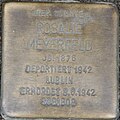
|
|||
|
Johanna Ziegelroth born Oppenheimer (1864-1943) Johanna Ziegelroth was born in Heiligenstadt and worked as a nurse in Halle. She was the sister of the community doctor of the Jewish community Halle Gustav Oppenheimer. Together with his wife Emilie (see Händelstrasse 3), she supported her brother in his work for financially disadvantaged families and managed the children's holiday home he founded in the Dölauer Heide . Johanna Ziegelroth took in the two nurses Rosalie Meyerfeld and her sister Sofia Loewenthal in her apartment. The three women later had to leave the apartment on Uhlandstrasse and move to a “Jewish house” at Hindenburgstrasse 34 (today Magdeburger Strasse 7). On May 19, 1941, Johanna Ziegelroth had to move to a supposed old people's home at Boelckestrasse 24 (today Dessauer Strasse). She was deported to Theresienstadt on September 19, 1942, where she died on January 22, 1943. |
JOHANNA ZIEGELROTH nee lived here . Oppenheimer born in 1864 deported 1942 Theresienstadt dead January 22, 1943 |
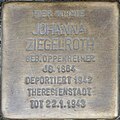
|
|||
|
Universitätsring 6 |
Oct 15, 2011 |
Rosa Landau born Sadger (1873-1944) Rosa Landau born Sadger was from Krakow. She and her husband Salomon had two daughters named Anneliese and Grete. One son died very young. Salomon and Rosa Landau later moved to Berlin to live with their daughter Grete, Anneliese Landau emigrated to the United States. On October 3, 1942, Salomon and Rosa Landau were deported to Theresienstadt. Rosa Salomon died there on December 21, 1944. |
ROSA LANDAU born here lived here . Sadger born in 1873 deported October 3, 1942 Theresienstadt, dead December 21, 1944 |

|
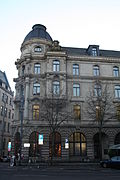
|
|
Salomon Landau (1864–1943) Salomon Landau came from Neu Sandez and ran a wholesale egg store in Halle. He and his wife Rosa later moved to Berlin to live with their daughter Grete. On October 3, 1942, Salomon and Rosa Landau were deported to Theresienstadt. Salomon Landau died there on June 13, 1943. |
SALOMON LANDAU, born in 1864 , lived here, deported October 3, 1941 Theresienstadt, dead June 13, 1943 |
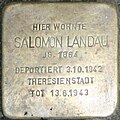
|
|||
|
Grete Paechter born Landau (1898–1941) Grete Landau, daughter of Salomon and Rosa Landau, married the lawyer Curt Julius Paechter and moved with him to Berlin. She had three children with him. Curt Julius Paechter was arrested after the Reichspogromnacht. Grete Paechter's children were able to travel to England. Grete Paechter took in her parents and was later committed to forced labor. As a result, she contracted appendicitis, from which she died on December 31, 1941. Curt Julius Paechter was interned in Theresienstadt and in the Bergen-Belsen concentration camp. He died a few months after his liberation on December 31, 1945 as a result of his imprisonment. |
GRETE PAECHTER nee lived here . Landau born 1898 forced labor Berlin dead 31.13.1941 |
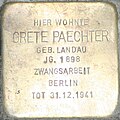
|
|||
| Universitätsring 15 |
Oct 11, 2014 |
Clara Radlauer born Krayn (1879-1942) Clara Radlauer came from Pudewitz and was widowed. She had to leave her apartment on Universitätsring and move to the "Judenhaus" at Forsterstrasse 13. She was deported on June 1, 1942 and murdered two days later in the Sobibor extermination camp. |
CLARA RADLAUER nee lived here . Krayn born in 1879 deported June 1, 1942 Sobibor murdered June 3, 1942 |
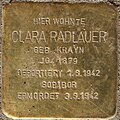
|

|
| Universitätsring 19-20 |
Dec 12, 2006 |
Cuno Helft (1873-1942) Cuno Helft was born in Bleicherode. He was a partner in two department stores in Halle. In his first marriage he was born with Ida. Elsberg married. With her he had two sons named Hans and Gerhard. Ida Helft died in 1935. Cuno Helft then sold his house on Universitätsring and moved into an apartment at Mühlweg 21. However, he soon had to leave it and move to a “Jewish house” at 26 Handelstrasse. Later he had to move again to Forsterstrasse 13. There he married the divorced Lucie Stern geb. Heinemann (see Albert-Schweitzer-Strasse 54). Shortly afterwards, both were deported on June 1, 1942 and murdered two days later in the Sobibor extermination camp. Cuno Helft's sons from his first marriage survived the war. Hans Helft emigrated to Chile, Gerhard Helft to Argentina. |
CUNO HELFT born in 1873 lived here, deported 1942 Lublin murdered June 3 , 1942 Sobibor |
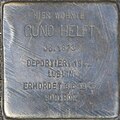
|

|
| Willow plan 9 |
Nov 28, 2019 |
Simon Schwarz (1866-1940) Simon Schwarz came from Cologne and worked in Halle as a private scholar. On October 1, 1940, he was admitted to the Altscherbitz State Hospital as a patient. There he died on October 6, 1940, allegedly of senile dementia and marasmus . |
|||
| Wielandstrasse 12 |
Oct 15, 2011 |
Seraphine Lavoipiere born Davidsohn (1871-1943) Seraphine Lavoipiere came from Schrimm and, as a widow, owned an apartment at Wielandstrasse 12. She had to leave after the National Socialists came to power and move to a supposed old people's home at Boelckestrasse 24 (today Dessauer Strasse). On September 20, 1942, she was deported to the Theresienstadt ghetto, where she died on February 3, 1943. |
SERAPHINE LAVOIPIERE nee lived here . Davidsohn born in 1871 deported to Theresienstadt in 1942, dead on February 3, 1943 |

|

|
|
Willy-Brandt-Strasse 8 (formerly Lindenstrasse) |
Oct 11, 2014 |
Minna Simon born Mahnhardt (1886–1943) Minna born Mahnhardt was not a native Jew, but was listed as a member of the Jewish community after her marriage to Siegfried Simon. The couple had six children, four of whom were able to leave Germany. Siegfried Simon died in 1936. Minna Simon later moved with her son Erich and daughter Martha to the “Judenhaus” at Forsterstrasse 13. The woman, who was seriously ill with diabetes, died there on February 27, 1943. |
MINNA SIMON nee lived here . Mahnhardt, born in 1886, forced move to the 'Judenhaus' before deportation, dead 9.2.1943 |

|
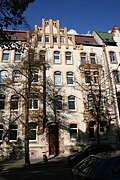
|
|
Martha Simon (1907-1944) Martha Simon was the daughter of Minna Simon. She and her brother Erich stayed with their sick mother in Halle, where the family later had to move to the “Judenhaus” at 13 Forsterstrasse. At the beginning of March 1943, Martha and Erich Simon were initially deported to the Theresienstadt ghetto and from there on October 4, 1944 to Auschwitz, where they died. |
MARTHA SIMON, born in 1907 , lived here . Deported 1943 Theresienstadt. 1944 Auschwitz murdered |
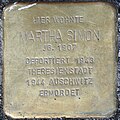
|
|||
|
Erich Simon (1923–1944) Erich Simon was the son of Minna Simon. He and his sister Martha stayed with their sick mother in Halle, where the family later had to move to the “Judenhaus” at 13 Forsterstrasse. At the beginning of March 1943, Martha and Erich Simon were initially deported to the Theresienstadt ghetto and from there on October 4, 1944 to Auschwitz, where they died. |
ERICH SIMON born in 1923 lived here, deported 1943 Theresienstadt, 1944 Auschwitz murdered |
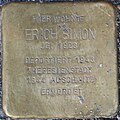
|
|||
| Willy-Brandt-Strasse / Turmstrasse (formerly Lindenstrasse 54) |
Oct 11, 2014 |
Adolf Kohn (1868–1942) Adolf Kohn was born in Ebelsbach . He had to give up his apartment on Lindenstrasse and move to a Jewish house at Forsterstrasse 13. Presumably knowing of the imminent deportation, he committed suicide on April 23, 1942. |
ADOLF KOHN, born in 1868, lived here . Forced move 1940 'Judenhaus', dead 23 April 1942 before deportation |
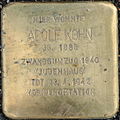
|
overbuilt |
| Willy-Brandt-Strasse 70 (formerly Lindenstrasse) |
May 17, 2008 |
Max Jovishoff (1876-1938) Max Jovishoff was born in Hattingen and owned a paper mill in Halle. He was married to Mathilde geb. Gumberz (or Grünsperz). The son Hans and daughter Martha (see Falkenweg 7) emerged from the marriage. Max Jovishoff died in prison on October 13, 1938. "Suicide" was given as the official cause of death. His wife and son managed to escape to the United States. His daughter was deported to Auschwitz and probably died on a death march. |
MAX JOVISHOFF, born in 1876 , lived here, arrested by the Halle police prison, dead on October 13, 1938 |
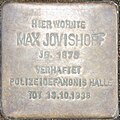
|

|
| Wörmlitzer Strasse 108 |
Nov 3, 2012 |
Alfred Goldmann (1860–1943) Alfred Goldmann came from Altewalde and worked as a businessman. He and his wife Jenny had to give up their apartment on Wörmlitzer Straße and move to the “Judenhaus” at Am Steintor 18 and, on May 23, 1941, to a supposed old people's home at Boelckestraße 24 (today Dessauer Straße). On February 27, 1943, Alfred Goldmann was deported to Theresienstadt, where he died on April 14, 1943. |
ALFRED GOLDMANN, born in 1860 , lived here, interned in 1941 in the Halle assembly camp, deported in 1943 from Theresienstadt, dead April 14 , 1943 |

|

|
|
Jenny Goldmann b. Marcuse (1863-1942) Jenny Goldmann b. Marcuse was from Stargard . After they had to give up their apartment, she and her husband moved to the "Judenhaus" at Am Steintor 18 and on May 23, 1941, to a supposed old people's home at Boelckestraße 24 (today Dessauer Straße). Jenny Goldmann died there on June 5, 1942. |
JENNY GOLDMANN nee lived here . Marcuse, born in 1863, interned in 1941 at the collective camp in Halle dead June 5th, 1942 |

|
Planned stumbling blocks
| address | Laying date |
person | Picture of the house |
|---|---|---|---|
| Kirchnerstrasse 20 |
Jakob Friedmann (1870–1943) Jakob Friedmann came from Bauerbach and ran a footwear wholesaler in Halle. He was married to Klara geb. Frank. The couple had a daughter named Ruth and a son named Heinz Hermann. Klara Friedmann died on September 6, 1938. Jakob Friedmann's children emigrated to Shanghai on January 1, 1939, together with Ruth's husband and son. Jakob Friedmann stayed in Halle. He lost his business and had to give up his apartment on Kirchnerstrasse. He first moved to the “Judenhaus” at Am Steintor 18 and on May 24, 1941, to a supposed old people's home at Boelckestraße 24 (today Dessauer Straße). On September 20, 1942, he was deported to the Theresienstadt ghetto, where he died on February 18, 1943. |
tore off | |
| Magdeburger Strasse 7 (formerly Hindenburgstrasse 34) |
Gertrude Fromme b. Michaelis (1878–1942) Gertrude Fromme b. Michaelis came from Bleicherode. On June 2, 1942, she and her husband Hermann committed suicide together. |

|
|
|
Hermann Fromme (1866–1942) Hermann Fromme came from Detmold and traded linen and cotton goods in Halle. On June 2, 1942, he and his wife Gertrude committed suicide together. |
|||
|
Elli Mark (1878-1942) Elli Mark was born in Bad Liebenstein . She was the daughter of Raphael Mark, the long-time custodian of the Jewish community in Halle. She was considered severely disabled. She had to leave her apartment on Hindenburgstrasse and move into a supposed old people's home at Boelckestrasse 24 (today Dessauer Strasse). She was deported on June 1, 1942 and murdered two days later in the Sobibor extermination camp. |
|||
|
Henriette Jütel Silberberg b. Bauchwitz (1860-1942) Henriette born Bauchwitz was born in Kloster. With her husband Leopold Silberberg she had a son named Gustav Jechil and a daughter named Frieda Henriette and Gertrud. Henriette Silberberg ran a lingerie shop together with her husband and, after his death, with her son. In 1938 Gustav Silberberg moved to Leipzig with his wife, Henriette Silberberg later followed after she had to sell her house in Halle. On September 20, 1942, she was deported to the Theresienstadt ghetto, where she died on September 28, 1942. Gustav Silberberg was deported to the Riga ghetto , Frieda Henriette Silberberg to Auschwitz. Gertrud Silberberg managed to emigrate to England. |
|||
| Marienstrasse 24 | Nov 28, 2019 |
Werner Friedmann (1908–1939) Werner Friedmann was born in Halle. During the Reichspogromnacht he was sent to Buchenwald concentration camp. He was released on January 9, 1939, but died on February 3, 1939 as a result of his imprisonment. |
overbuilt |
| Meckelstrasse 1 |
Erich Peters |
overbuilt | |
| Raffineriestrasse 15 |
Walter Norbert Max Jacobsohn (1894–1940) Walter Jacobsohn was born in Halle and worked as a businessman. He was interned in Buchenwald Concentration Camp on June 14, 1938 and probably remained there without interruption until his death on March 9, 1940. |
tore off |
Web links
- stolpersteine.eu
- zeit-geschichten.de: Stumbling blocks in Halle
- www.halle.de: Stumbling blocks for Halle
- www.gedenkbuch.halle.de: Memorial book for the dead of the Holocaust in Halle
- Saxony-Anhalt-Wiki: Stumbling blocks in Halle ( Memento from September 25, 2017 in the Internet Archive )
- Hearing stumbling blocks (Halle and Leipzig)
Individual evidence
- ^ Halle (Saale) - Handel city: stumbling blocks for Halle . Retrieved October 7, 2013.
- ↑ Hörstolpersteine project page Radiofabrik website. (No longer available online.) Archived from the original on December 24, 2015 ; accessed on December 22, 2015 . Info: The archive link was inserted automatically and has not yet been checked. Please check the original and archive link according to the instructions and then remove this notice.
- ↑ Auditory stumbling blocks. Hall. Retrieved March 24, 2018 .
- ↑ Programs / Downloads. Hall. Retrieved March 24, 2018 .
- ↑ Master "MultiMedia & Authorship": Stumbling Blocks . Retrieved March 24, 2018.
- ↑ "Stumbling blocks - films against oblivion" . In: youbube.com. Retrieved March 24, 2018.
- ↑ www.halle.de: Stumbling blocks for Halle . Retrieved October 7, 2013.
- ↑ Memorial Book Halle - Salomon, Franziska . Retrieved October 7, 2013.
- ^ Stumbling blocks in Hamburg - Paul Salomon . Retrieved October 7, 2013.
- ↑ a b c zeit-geschichten.de - Adolf-von-Harnack-Strasse 9 (formerly Blumenthalstrasse) . Retrieved October 7, 2013.
- ↑ Memorial Book Halle - Sachs, Martin . Retrieved November 7, 2015.
- ↑ Memorial Book Halle - Sachs, Paula . Retrieved November 7, 2015.
- ↑ Memorial Book Halle - Bauchwitz, Paul . Retrieved October 7, 2013.
- ↑ a b c zeit-geschichten.de - Adolf-von-Harnack-Strasse 18 (formerly Blumenthalstrasse) . Retrieved October 7, 2013.
- ↑ Memorial Book Halle - Bauchwitz, Regina . Retrieved October 7, 2013.
- ↑ Memorial Book Halle - Katz, Willy . Retrieved October 7, 2013.
- ↑ Memorial Book Halle - Müller (jur.), Alfred . Retrieved October 7, 2013.
- ^ Memorial book Halle - Müller, Emil . Retrieved October 7, 2013.
- ↑ Halle Memorial Book - Müller, Else . Retrieved October 7, 2013.
- ↑ Halle Memorial Book - Müller, Else . Retrieved October 7, 2013.
- ↑ Halle Memorial Book - Help, Lucie . Retrieved October 7, 2013.
- ↑ zeit-geschichten.de - Alter Markt 12 . Retrieved October 7, 2013.
- ↑ Memorial Book Halle - Arnholz, Berta (Balbina) . Retrieved October 7, 2013.
- ↑ Memorial Book Halle - Arnholz, Hugo . Retrieved October 7, 2013.
- ↑ zeit-geschichten.de - Am Steintor 18 . Retrieved October 7, 2013.
- ↑ Memorial Book Halle - Elkan, Ida . Retrieved October 7, 2013.
- ↑ Halle Memorial Book - Lewin, Curt . Retrieved October 7, 2013.
- ↑ a b zeit-geschichten.de - August-Bebel-Strasse 34 (formerly Friedrichstrasse) . Retrieved October 7, 2013.
- ↑ Halle Memorial Book - Lewin, Johanna . Retrieved October 7, 2013.
- ↑ zeit-geschichten.de - August-Bebel-Strasse 48a (formerly Friedrichstrasse) . Retrieved October 7, 2013.
- ↑ a b zeit-geschichten.de - August-Bebel-Strasse 59 (formerly Friedrichstrasse) . Retrieved October 7, 2013.
- ↑ Halle Memorial Book - Levi, Rosalie . Retrieved October 7, 2013.
- ↑ Halle Memorial Book - Wolff, Paula . Retrieved October 7, 2013.
- ↑ Halle Memorial Book - Wolff, Sally . Retrieved October 7, 2013.
- ↑ Memorial Book Halle - Sauer, Henriette . Retrieved October 7, 2013.
- ↑ zeit-geschichten.de - Bernhardystraße 6 . Retrieved October 7, 2013.
- ↑ Memorial Book Halle - Nussbaum, Ilselotte . Retrieved October 7, 2013.
- ↑ a b c zeit-geschichten.de - Bernhardystraße 56 . Retrieved October 7, 2013.
- ↑ Memorial Book Halle - Nussbaum, Leopold . Retrieved October 7, 2013.
- ↑ Memorial Book Halle - Nussbaum, Olga . Retrieved October 7, 2013.
- ↑ Memorial Book Halle - Sommerich, Edith Therese . Retrieved October 7, 2013.
- ↑ zeit-geschichten.de - Breite Strasse 19 . Retrieved October 7, 2013.
- ↑ Memorial Book Halle - Adler, Hugo . Retrieved October 7, 2013.
- ↑ zeit-geschichten.de - Breite Strasse 33 . Retrieved October 7, 2013.
- ↑ Memorial Book Halle - Silberberg, Alfred . Retrieved October 7, 2013.
- ↑ Memorial Book Halle - Meyerstein, Bertha . Retrieved October 7, 2013.
- ↑ a b zeit-geschichten.de - Brüderstraße 10 . Retrieved October 7, 2013.
- ↑ Gedenkbuch Halle - Meyerstein, Israel (Julius) . Retrieved October 7, 2013.
- ↑ Memorial Book Halle - Holländer, Elvira . Retrieved October 7, 2013.
- ↑ a b zeit-geschichten.de - Brüderstraße 17 . Retrieved October 7, 2013.
- ↑ Memorial Book Halle - Holländer, Max . Retrieved October 7, 2013.
- ↑ zeit-geschichten.de - Carl-von-Ossietzky-Straße 16 (formerly Bismarck street) . Retrieved October 7, 2013.
- ^ Memorial book Halle - Tubandt (phil.), Wera . Retrieved October 7, 2013.
- ^ Wera & Carl Tubandt - Together against the persecution . Retrieved October 7, 2013.
- ↑ Halle Memorial Book - Baumann, Johanna . Retrieved October 7, 2013.
- ↑ a b zeit-geschichten.de - Emil-Abderhalden-Str. 6 (formerly Wilhelmstrasse) . Retrieved October 7, 2013.
- ↑ Memorial Book Halle - Hirsch, Frieda . Retrieved October 7, 2013.
- ↑ Halle Memorial Book - Jovishoff, Max . Retrieved October 7, 2013.
- ↑ zeit-geschichten.de - Falkenweg 7 . Retrieved October 7, 2013.
- ↑ Halle Memorial Book - Dittmar, Martha . Retrieved October 7, 2013.
- ↑ Memorial Book Halle - Frankenberg, Herta . Retrieved October 7, 2013.
- ↑ Memorial Book Halle - Frankenberg, Nathan . Retrieved October 7, 2013.
- ↑ zeit-geschichten.de - Feuerbachstrasse 74 (formerly Kurfürstenstrasse) . Retrieved October 7, 2013.
- ↑ Memorial Book Halle - Frankenberg, Siegfried . Retrieved October 7, 2013.
- ↑ Memorial Book Halle - Cohn, Hannacha Peril . Retrieved October 7, 2013.
- ↑ a b c zeit-geschichten.de - Feuerbachstrasse 75 (formerly Kurfürstenstrasse) . Retrieved October 7, 2013.
- ^ Halle - Cohn, Recha . Retrieved October 7, 2013.
- ↑ Memorial Book Halle - Cohn, Thekla . Retrieved October 7, 2013.
- ↑ a b c d e f g h i j k l m New stumbling blocks for Halle: murdered after 16 months , HalleSpektrum, October 11, 2014. Retrieved October 12, 2014.
- ↑ Halle Memorial Book - Pfifferling, Josef called Julius . Retrieved October 7, 2013.
- ↑ a b zeit-geschichten.de - Frankestrasse 12 (formerly 17) . Retrieved March 23, 2018.
- ↑ Halle Memorial Book - Pfifferling, Friedrich (Fritz) . Retrieved March 23, 2018.
- ↑ Memorial Book Halle - Kochmann, Martin Dagobert . Retrieved October 7, 2013.
- ↑ zeit-geschichten.de - Friedenstrasse 12a . Retrieved October 7, 2013.
- ↑ catalogus-professorum-halensis.de - Martin Kochmann ( Memento of the original from April 3, 2016 in the Internet Archive ) Info: The archive link was inserted automatically and has not yet been checked. Please check the original and archive link according to the instructions and then remove this notice. . Retrieved October 7, 2013.
- ^ Integrated comprehensive school in Halle - reading evening on the subject of “German-Jewish literature from Halle” from the series of events “Halle reads”. . Retrieved October 7, 2013.
- ↑ ancestry.com - Bella Feuchtwanger (1891-1943) . Retrieved October 7, 2013.
- ↑ zeit-geschichten.de - Geiststrasse 1 . Retrieved October 11, 2013.
- ↑ Memorial Book Halle - Riesel, Senta (Ette) . Retrieved October 7, 2013.
- ↑ zeit-geschichten.de - Geiststrasse 15 . Retrieved October 7, 2013.
- ↑ Memorial Book Halle - Windmüller, Martha . Retrieved October 7, 2013.
- ↑ zeit-geschichten.de - Geiststrasse 22 . Retrieved October 7, 2013.
- ↑ Halle Memorial Book - Just, Kurt . Retrieved October 7, 2013.
- ↑ zeit-geschichten.de - Geiststrasse 55 . Retrieved October 7, 2013.
- ↑ zeit-geschichten.de - Georg-Cantor-Strasse 33 (formerly Henriettenstrasse) . Retrieved October 7, 2013.
- ↑ Halle Memorial Book - Heymann, Anna . Retrieved October 7, 2013.
- ↑ a b c d e f g h i zeit-geschichten.de - Große Märkerstraße 13 . Retrieved October 7, 2013.
- ↑ a b c d e f g h i j k l m n o p q r s t u v w x y z aa ab ac ad Press release from the Jewish community in Halle: Renewed damage to the memorial stones for murdered Jews in Halle on December 18 2005. Retrieved October 7, 2013.
- ↑ Halle Memorial Book - Heymann, Ludwig . Retrieved October 7, 2013.
- ↑ Memorial Book Halle - Librach, Awram (Abraham) . Retrieved October 7, 2013.
- ↑ Memorial Book Halle - Librach, Gutta . Retrieved October 7, 2013.
- ↑ Memorial Book Halle - Lipper, Hanna . Retrieved October 7, 2013.
- ↑ Memorial Book Halle - Lipper, Heinrich . Retrieved October 7, 2013.
- ↑ Memorial Book Halle - Lipper, Leo . Retrieved October 7, 2013.
- ↑ Memorial Book Halle - Riesel, Heinz Mischa . Retrieved October 7, 2013.
- ↑ Memorial Book Halle - Kupferberg, Rosa . Retrieved October 7, 2013.
- ↑ zeit-geschichten.de - Große Märkerstraße 27 . Retrieved October 7, 2013.
- ↑ Memorial Book Halle - Koppel, Fanny . Retrieved November 7, 2015.
- ↑ Memorial Book Halle - Koppel, Rosalie Helene (Röschen) . Retrieved November 7, 2015.
- ↑ Memorial Book Halle - Bauchwitz, Kurt . Retrieved October 7, 2013.
- ↑ zeit-geschichten.de - Große Ulrichstraße 2 . Retrieved October 7, 2013.
- ↑ a b c d e f g h Heidi Pohle: memorial symbols for Jewish citizens destroyed. Candles for the “Stolpersteine” , Mitteldeutsche Zeitung , May 7, 2004. Accessed October 7, 2013.
- ↑ a b c d e f g h Heidi Pohle: “Stolpersteine” published again , Mitteldeutsche Zeitung , October 25, 2004. Accessed October 7, 2013.
- ^ Halle - Lewinsky, med., Leo . Retrieved October 7, 2013.
- ↑ Halle Memorial Book - Pollak, Arthur . Retrieved October 7, 2013.
- ↑ zeit-geschichten.de - Große Ulrichstraße 27 . Retrieved October 7, 2013.
- ↑ Memorial Book Halle - Cahn, Erich . Retrieved October 7, 2013.
- ↑ a b zeit-geschichten.de - Große Ulrichstraße 58 . Retrieved October 7, 2013.
- ↑ Halle Memorial Book - Cahn, Johanna, actually Hedwig . Retrieved October 7, 2013.
- ↑ Memorial Book Halle - Abramowitz, Aron . Retrieved October 7, 2013.
- ↑ Halle Memorial Book - Frank, Franziska . Retrieved October 7, 2013.
- ↑ Memorial Book Halle - Herschkowicz, Hanna (Chana) . Retrieved October 7, 2013.
- ↑ Memorial Book Halle - Herschkowicz (Herschkowitz), Leib (Leopold) . Retrieved October 7, 2013.
- ↑ Memorial Book Halle - Herschkowicz, Sarah . Retrieved October 7, 2013.
- ↑ zeit-geschichten.de - Great Berlin 8 . Retrieved October 7, 2013.
- ↑ Memorial Book Halle - Israel, Amalie . Retrieved October 7, 2013.
- ↑ Halle Memorial Book - Jacoby, Flora . Retrieved October 7, 2013.
- ↑ Memorial Book Halle - Lerner, Hermann (Chaim) . Retrieved October 7, 2013.
- ↑ Halle Memorial Book - Metis, Pauline . Retrieved October 7, 2013.
- ↑ Memorial Book Halle - Meyerstein, Rosalie . Retrieved October 7, 2013.
- ↑ Gedenkbuch Halle - Reiter, Henriette . Retrieved October 7, 2013.
- ↑ Memorial Book Halle - Riesenfeld, Alfred . Retrieved October 7, 2013.
- ↑ Halle Memorial Book - Seliger, Leo . Retrieved October 7, 2013.
- ↑ Memorial Book Halle - Schwarz, Elisabeth . Retrieved October 7, 2013.
- ↑ Memorial Book Halle - Schwarz, Simon . Retrieved October 7, 2013.
- ↑ Memorial Book Halle - Zuckermann, Frieda . Retrieved October 7, 2013.
- ↑ Memorial Book Halle - Bauchwitz, Elsa . Retrieved October 7, 2013.
- ↑ a b c d zeit-geschichten.de - Halberstädter Straße 13 . Retrieved October 7, 2013.
- ↑ Memorial Book Halle - Burghardt, Lina . Retrieved October 7, 2013.
- ↑ Memorial Book Halle - Burghardt, Marie . Retrieved October 7, 2013.
- ↑ Memorial Book Halle - Burghardt, Siegfried (Fritz) . Retrieved October 7, 2013.
- ↑ Memorial Book Halle - Oppenheimer, Emilie . Retrieved October 7, 2013.
- ↑ zeit-geschichten.de - Handelstrasse 3 . Retrieved October 7, 2013.
- ↑ Memorial Book Halle - Katz, Alfred . Retrieved October 7, 2013.
- ↑ zeit-geschichten.de - Hansering 2 . Retrieved October 7, 2013.
- ↑ Memorial Book Halle - Goldberg, Adolf . Retrieved October 7, 2013.
- ↑ a b zeit-geschichten.de - Hansering 17 . Retrieved October 7, 2013.
- ↑ Memorial Book Halle - Goldberg, Erna . Retrieved October 7, 2013.
- ↑ Memorial Book Halle - Lewin, Regina . Retrieved October 7, 2013.
- ↑ a b c zeit-geschichten.de - Harz 18 . Retrieved October 7, 2013.
- ↑ Memorial Book Halle - Salomon, Adele . Retrieved October 7, 2013.
- ↑ Memorial Book Halle - Salomon, Caesar . Retrieved October 7, 2013.
- ↑ zeit-geschichten.de - Humboldtstrasse 41 . Retrieved October 7, 2013.
- ↑ Halle Memorial Book - Victor, Elli . Retrieved October 7, 2013.
- ↑ Halle Memorial Book - Victor, Emilie . Retrieved October 7, 2013.
- ↑ Halle Memorial Book - Victor, Moritz . Retrieved October 7, 2013.
- ↑ Memorial Book Halle - Mühlbauer, Edith . Retrieved October 7, 2013.
- ↑ a b c d e zeit-geschichten.de - Kleine Brauhausstrasse 7 . Retrieved October 7, 2013.
- ↑ Memorial Book Halle - Mühlbauer, Jehoshua (Abraham) . Retrieved October 7, 2013.
- ↑ Memorial Book Halle - Mühlbauer, Mendel Moshe (Menne) . Retrieved October 7, 2013.
- ↑ Memorial Book Halle - Mühlbauer, Sala-Ruda . Retrieved October 7, 2013.
- ↑ Memorial Book Halle - Lichtenstein, Gertrud . Retrieved October 7, 2013.
- ↑ a b c zeit-geschichten.de - Kleine Klausstrasse 3 (at that time No. 7) . Retrieved October 7, 2013.
- ↑ Memorial Book Halle - Wachter, Henny . Retrieved October 7, 2013.
- ↑ zeit-geschichten.de - Kleine Märkerstraße 3 . Retrieved October 7, 2013.
- ^ Adventist press service: Halle Adventist Church unveils stumbling block for Johann Hanselmann . Retrieved October 7, 2013.
- ↑ a b c zeit-geschichten.de - Kleine Ulrichstrasse 8 . Retrieved October 7, 2013.
- ↑ Memorial Book Halle - Grünberger, Ernst . Retrieved October 7, 2013.
- ↑ a b zeit-geschichten.de - Kleine Ulrichstrasse 31 . Retrieved October 11, 2013.
- ↑ Memorial Book Halle - Grünberger, Nelly . Retrieved October 7, 2013.
- ↑ zeit-geschichten.de - Kleine Ulrichstrasse 38 (formerly 37) . Retrieved October 7, 2013.
- ↑ Memorial book Halle - Oppenheim, Eduard . Retrieved October 7, 2013.
- ↑ a b zeit-geschichten.de - Kohlschütterstrasse 6 . Retrieved October 7, 2013.
- ↑ Memorial Book Halle - Oppenheim, Erna . Retrieved October 7, 2013.
- ↑ Memorial Book Halle - Redelmeier, Frieda Frida . Retrieved October 7, 2013.
- ↑ zeit-geschichten.de - Kohlschütterstrasse 7/8 . Retrieved October 7, 2013.
- ↑ zeit-geschichten.de - Körnerstrasse 26 . Retrieved October 7, 2013.
- ↑ Halle Memorial Book - stamp, Charlotte . Retrieved November 7, 2015.
- ↑ Halle Memorial Book - stamp, pink . Retrieved November 7, 2015.
- ↑ Halle Memorial Book - Stamp, Siegfried . Retrieved October 7, 2013.
- ↑ Memorial Book Halle - Schönbach, Leo . Retrieved October 7, 2013.
- ↑ zeit-geschichten.de - Lafontainestraße 4 . Retrieved October 7, 2013.
- ↑ a b Gedenkbuch Halle - Aronsohn, Edmund . Retrieved October 7, 2013.
- ↑ a b c zeit-geschichten.de - Lafontainestrasse 5 . Retrieved October 7, 2013.
- ↑ Halle Memorial Book - Aronsohn, Fanny . Retrieved October 7, 2013.
- ↑ Halle Memorial Book - Aronsohn, Oskar . Retrieved October 7, 2013.
- ↑ zeit-geschichten.de - Lafontainestraße 10 . Retrieved October 7, 2013.
- ↑ Memorial Book Halle - Fürth, Marie . Retrieved October 7, 2013.
- ↑ zeit-geschichten.de - Lafontainestrasse 23 . Retrieved October 7, 2013.
- ↑ Halle Memorial Book - Elkan, Paul . Retrieved October 7, 2013.
- ↑ zeit-geschichten.de - Landrain 144 . Retrieved October 7, 2013.
- ↑ Memorial Book Halle - Brilling, Anna Chana . Retrieved October 7, 2013.
- ↑ Memorial Book Halle - Brilling, Bruno . Retrieved October 7, 2013.
- ↑ Halle Memorial Book - Brilling, Max, Meir, Chanoch . Retrieved October 7, 2013.
- ↑ Memorial Book Halle - Boxwood Max . Retrieved October 7, 2013.
- ↑ Halle Memorial Book - Book Tree Meta . Retrieved October 7, 2013.
- ↑ Halle Memorial Book - Bilski, Emilie . Retrieved October 7, 2013.
- ↑ zeit-geschichten.de - Laurentiusstraße 9 . Retrieved October 7, 2013.
- ↑ Gedenkbuch Halle - Wencymer, Helena . Retrieved October 7, 2013.
- ↑ zeit-geschichten.de - Leipziger Strasse 4 . Retrieved October 7, 2013.
- ↑ Halle Memorial Book - Wencymer, Rosa . Retrieved October 7, 2013.
- ↑ Memorial Book Halle - Wencymer, Siegfried . Retrieved October 7, 2013.
- ↑ Memorial Book Halle - Wencymer, Sofia . Retrieved October 7, 2013.
- ↑ Memorial Book Halle - Großmann, Lina . Retrieved October 7, 2013.
- ↑ Halle Memorial Book - Lewit, Hermann . Retrieved October 7, 2013.
- ↑ zeit-geschichten.de - Ludwig-Wucherer-Straße 11 . Retrieved October 7, 2013.
- ↑ Memorial Book Halle - Rosenthal, Hertha . Retrieved October 7, 2013.
- ↑ zeit-geschichten.de - Ludwig-Wucherer-Strasse 24 . Retrieved October 7, 2013.
- ↑ Halle Memorial Book - Salomon, Rosa . Retrieved October 7, 2013.
- ↑ zeit-geschichten.de - Ludwig-Wucherer-Strasse 28 . Retrieved October 7, 2013.
- ↑ Memorial Book Halle - Rautenberg, Jakob . Retrieved October 7, 2013.
- ↑ a b zeit-geschichten.de - Ludwig-Wucherer-Strasse 45 . Retrieved October 7, 2013.
- ↑ Memorial Book Halle - Rautenberg, Käte . Retrieved October 7, 2013.
- ↑ Memorial Book Halle - Oppenheim, Eva Martha . Retrieved October 7, 2013.
- ↑ a b c d zeit-geschichten.de - Magdeburger Strasse 28 (formerly Hindenburgstrasse 13a) . Retrieved October 7, 2013.
- ↑ Memorial Book Halle - Oppenheim, Frieda . Retrieved October 7, 2013.
- ↑ Memorial Book Halle - Oppenheim, Georg . Retrieved October 7, 2013.
- ↑ Memorial Book Halle - Oppenheim, Ilse . Retrieved October 7, 2013.
- ↑ Memorial Book Halle - Holzmann, Paul (Pinchas) . Retrieved October 7, 2013.
- ↑ zeit-geschichten.de - Magdeburger Strasse 30 (formerly Hindenburgstrasse 13) . Retrieved October 7, 2013.
- ↑ Memorial Book Halle - Sommerich, Julius . Retrieved October 7, 2013.
- ↑ Memorial Book Halle - Wolffberg, Else . Retrieved October 7, 2013.
- ↑ Memorial Book Halle - Wolffberg, Olga . Retrieved October 7, 2013.
- ↑ Halle Memorial Book - Ney, Elise (Elisabeth) . Retrieved October 7, 2013.
- ↑ zeit-geschichten.de - Maybachstrasse 2 . Retrieved October 7, 2013.
- ↑ Memorial Book Halle - Lion, Alfred . Retrieved October 7, 2013.
- ↑ zeit-geschichten.de - Meckelstrasse 4 . Retrieved October 7, 2013.
- ↑ Halle Memorial Book - Goldmann, Wilhelm . Retrieved October 7, 2013.
- ↑ zeit-geschichten.de - Mittelstrasse 11-13 . Retrieved October 7, 2013.
- ↑ Memorial Book Halle - Geminder, Yedidia (Dudie) . Retrieved October 7, 2013.
- ↑ a b zeit-geschichten.de - Mühlweg 36 . Retrieved October 7, 2013.
- ↑ Memorial Book Halle - Riesel, Frieda Hanni (Püppe, Friedel) . Retrieved October 7, 2013.
- ↑ Halle Memorial Book - Cohn, Rosa . Retrieved October 7, 2013.
- ↑ zeit-geschichten.de - Mühlweg 55 (formerly Am Kirchtor 14) . Retrieved October 7, 2013.
- ↑ Memorial Book Halle - Friedländer, Adolf . Retrieved October 7, 2013.
- ↑ zeit-geschichten.de - Mühlweg 55 (formerly Am Kirchtor 14) . Retrieved October 7, 2013.
- ↑ zeit-geschichten.de - Paul-Suhr-Straße 106 . Retrieved October 7, 2013.
- ↑ Gedenkbuch Halle - Weiß, Charlotte . Retrieved October 7, 2013.
- ↑ a b zeit-geschichten.de - Puschkinstrasse 30 (formerly Albrechtstrasse) . Retrieved October 7, 2013.
- ↑ Gedenkbuch Halle - Weiß, Theodor . Retrieved October 7, 2013.
- ↑ Memorial Book Halle - Schwab, Edith . Retrieved October 7, 2013.
- ↑ a b c d e zeit-geschichten.de - Rannische Strasse 1 . Retrieved October 7, 2013.
- ↑ Memorial Book Halle - Schwab, Fritz . Retrieved October 7, 2013.
- ↑ Gedenkbuch Halle - Schwab, Hermine Lilly called Liliane . Retrieved October 7, 2013.
- ↑ Halle Memorial Book - Schwab, Jutta, Ruth, Margit . Retrieved October 7, 2013.
- ↑ Memorial Book Halle - Schwab-Slawkowska, Zlata Lotte . Retrieved October 7, 2013.
- ↑ Halle Memorial Book - Alexander, Gustav Rudolf . Retrieved October 7, 2013.
- ↑ a b c zeit-geschichten.de - Rannische Strasse 3 . Retrieved October 7, 2013.
- ↑ Halle Memorial Book - Alexander, Harry Eberhard . Retrieved October 7, 2013.
- ↑ Halle Memorial Book - Alexander, Ruth Elli . Retrieved October 7, 2013.
- ↑ Halle Memorial Book - Salkin, Isaac . Retrieved November 7, 2015.
- ↑ Memorial Book Halle - Salkin, Taube . Retrieved November 7, 2015.
- ↑ Memorial Book Halle - Müller, Gerhard (Gerd) . Retrieved October 7, 2013.
- ↑ a b zeit-geschichten.de - Rathenauplatz 3 (then Kaiserplatz) . Retrieved October 7, 2013.
- ↑ Memorial Book Halle - Müller, Henny Johanna . Retrieved October 7, 2013.
- ↑ Memorial Book Halle - Fleischmann (Prof. jur.), Max . Retrieved October 7, 2013.
- ↑ zeit-geschichten.de - Rathenauplatz 14 (then Kaiserplatz) . Retrieved October 7, 2013.
- ↑ catalogus-professorum-halensis.de - Max Fleischmann ( Memento of the original from December 8, 2015 in the Internet Archive ) Info: The archive link was automatically inserted and not yet checked. Please check the original and archive link according to the instructions and then remove this notice. . Retrieved October 7, 2013.
- ↑ Halle Memorial Book - Freund, Max . Retrieved October 7, 2013.
- ↑ zeit-geschichten.de - Reichardtstrasse 6 . Retrieved October 11, 2013.
- ↑ Memorial Book Halle - Bacher, Bertha . Retrieved October 7, 2013.
- ↑ zeit-geschichten.de - Richard-Wagner-Strasse 11 . Retrieved October 7, 2013.
- ^ Memorial book Halle - Appel, Selma (Jenny) . Retrieved October 7, 2013.
- ↑ a b zeit-geschichten.de - Riebeckplatz 4 (then Merseburger Str. 166) . Retrieved October 7, 2013.
- ↑ Memorial Book Halle - Schwab, Julius . Retrieved October 7, 2013.
- ↑ zeit-geschichten.de - Röderberg 10 . Retrieved October 7, 2013.
- ↑ Halle Memorial Book - Hellermann, Hermann . Retrieved October 7, 2013.
- ↑ a b zeit-geschichten.de - Rudolf-Breitscheid-Strasse 14 (formerly Königstrasse) . Retrieved October 7, 2013.
- ↑ Halle Memorial Book - Hellermann, Selma . Retrieved October 7, 2013.
- ↑ Memorial Book Halle - Klein, Marie . Retrieved October 7, 2013.
- ↑ a b c d zeit-geschichten.de - Rudolf-Ernst-Weise Strasse 20 (formerly Königstrasse 62) . Retrieved October 7, 2013.
- ↑ Memorial Book Halle - Schloß, Emma . Retrieved October 7, 2013.
- ↑ Memorial Book Halle - Schloß, Gretchen . Retrieved October 7, 2013.
- ↑ Memorial Book Halle - Schloß, Josef (med. San. Rat) . Retrieved October 7, 2013.
- ↑ Memorial Book Halle - Wartenberg, Lieselotte . Retrieved October 7, 2013.
- ↑ a b zeit-geschichten.de - Schleiermacherstraße 13 (then Kronprinzenstraße) . Retrieved October 7, 2013.
- ↑ Memorial Book Halle - Wartenberg, Walter . Retrieved October 7, 2013.
- ↑ zeit-geschichten.de - Schlosserstraße 29 . Retrieved October 7, 2013.
- ↑ Halle - Japha Memorial Book (Prof. Dr. med. Et phil.), Arnold Dan . Retrieved October 7, 2013.
- ↑ catalogus-professorum-halensis.de - Arnold Japha ( Memento of the original from April 3, 2016 in the Internet Archive ) Info: The archive link was inserted automatically and has not yet been checked. Please check the original and archive link according to the instructions and then remove this notice. . Retrieved October 7, 2013.
- ↑ Silvia Zöller: Holocaust Remembrance. Nine new stumbling blocks laid in Halle , Mitteldeutsche Zeitung , 26 Sep. 2013. Retrieved October 7, 2013.
- ↑ Memorial Book Halle - Hirsch, Frieda . Retrieved October 7, 2013.
- ↑ a b zeit-geschichten.de - Seebener Strasse 11 . Retrieved October 7, 2013.
- ↑ Memorial Book Halle - Hirsch, Isidor . Retrieved October 7, 2013.
- ↑ Enrico Seppelt: New stumbling blocks laid in Halle ( Memento of the original from March 6, 2014 in the Internet Archive ) Info: The archive link has been inserted automatically and has not yet been checked. Please check the original and archive link according to the instructions and then remove this notice. , hallelife.de, December 12, 2006. Retrieved October 7, 2013.
- ↑ Memorial Book Halle - Graf, Clara . Retrieved October 7, 2013.
- ↑ a b c zeit-geschichten.de - Seebener Strasse 177 . Retrieved October 7, 2013.
- ^ Gedenkbuch Halle - Graf, Eduard . Retrieved October 7, 2013.
- ↑ Memorial Book Halle - Schulze, Irene . Retrieved October 7, 2013.
- ↑ Memorial Book Halle - Israel, Amalie . Retrieved October 7, 2013.
- ↑ a b c d e zeit-geschichten.de - Sternstrasse 11 . Retrieved October 7, 2013.
- ↑ Gedenkbuch Halle - Israel, Hirsch (Hermann) . Retrieved October 7, 2013.
- ↑ Memorial Book Halle - Padawer, Gerda . Retrieved October 7, 2013.
- ↑ Memorial Book Halle - Padawer, Hella . Retrieved October 7, 2013.
- ↑ Halle Memorial Book - Padawer, Schejndel (Jenny) . Retrieved October 7, 2013.
- ↑ Halle Memorial Book - Plasterek, Aron (Arno) . Retrieved October 7, 2013.
- ↑ Memorial Book Halle - Hirschfeld, Hermine . Retrieved October 7, 2013.
- ↑ a b zeit-geschichten.de - Talamtstrasse 6 . Retrieved October 7, 2013.
- ↑ Memorial Book Halle - Hirschfeld, Jacob René . Retrieved October 7, 2013.
- ↑ Memorial Book Halle - Cerf, Elise . Retrieved October 7, 2013.
- ↑ Memorial Book Halle - Löwenthal, Sofia . Retrieved October 7, 2013.
- ↑ a b c zeit-geschichten.de - Uhlandstrasse 10 . Retrieved October 7, 2013.
- ↑ Memorial book Halle - Meyerfeld, Rosalie . Retrieved October 7, 2013.
- ↑ Memorial Book Halle - Ziegelroth, Johanna . Retrieved October 7, 2013.
- ↑ Memorial Book Halle - Landau, Rosa . Retrieved October 7, 2013.
- ↑ a b c zeit-geschichten.de - Universitätsring 6 . Retrieved October 7, 2013.
- ↑ Memorial Book Halle - Landau, Mendel Salmen (Salomon) . Retrieved October 7, 2013.
- ↑ Halle Memorial Book - Paechter, Grete . Retrieved October 7, 2013.
- ↑ Halle Memorial Book - Help, Cuno . Retrieved October 7, 2013.
- ↑ zeit-geschichten.de - Universitätsring 19/20 . Retrieved October 7, 2013.
- ↑ Memorial Book Halle - Schwarz, Simon, Peter . Retrieved October 7, 2013.
- ↑ Memorial Book Halle - Lavoipiere, Seraph (f) ine . Retrieved October 7, 2013.
- ↑ zeit-geschichten.de - Wielandstrasse 12 . Retrieved October 7, 2013.
- ↑ Halle Memorial Book - Kohn, Alfred . Retrieved October 7, 2013.
- ↑ Halle Memorial Book - Dittmar, Martha . Retrieved October 7, 2013.
- ↑ Halle Memorial Book - Jovishoff, Max . Retrieved October 7, 2013.
- ↑ Halle Memorial Book - Goldmann, Alfred . Retrieved October 7, 2013.
- ↑ a b zeit-geschichten.de - Wörmlitzer Strasse 108 . Retrieved October 7, 2013.
- ↑ Halle Memorial Book - Goldmann, Jenny . Retrieved October 7, 2013.
- ↑ Halle Memorial Book - Friedmann, Jakob . Retrieved October 7, 2013.
- ↑ Halle Memorial Book - Fromm, Gertrude . Retrieved October 7, 2013.
- ↑ Halle Memorial Book - Fromm, Hermann . Retrieved October 7, 2013.
- ↑ Halle Memorial Book - Mark, Elli . Retrieved October 7, 2013.
- ↑ Memorial Book Halle - Silberberg, Henriette Jütel . Retrieved October 7, 2013.
- ↑ Halle Memorial Book - Friedmann, Werner . Retrieved October 7, 2013.
- ↑ Halle Memorial Book - Jacobsohn, Walter Norbert Max . Retrieved October 7, 2013.

